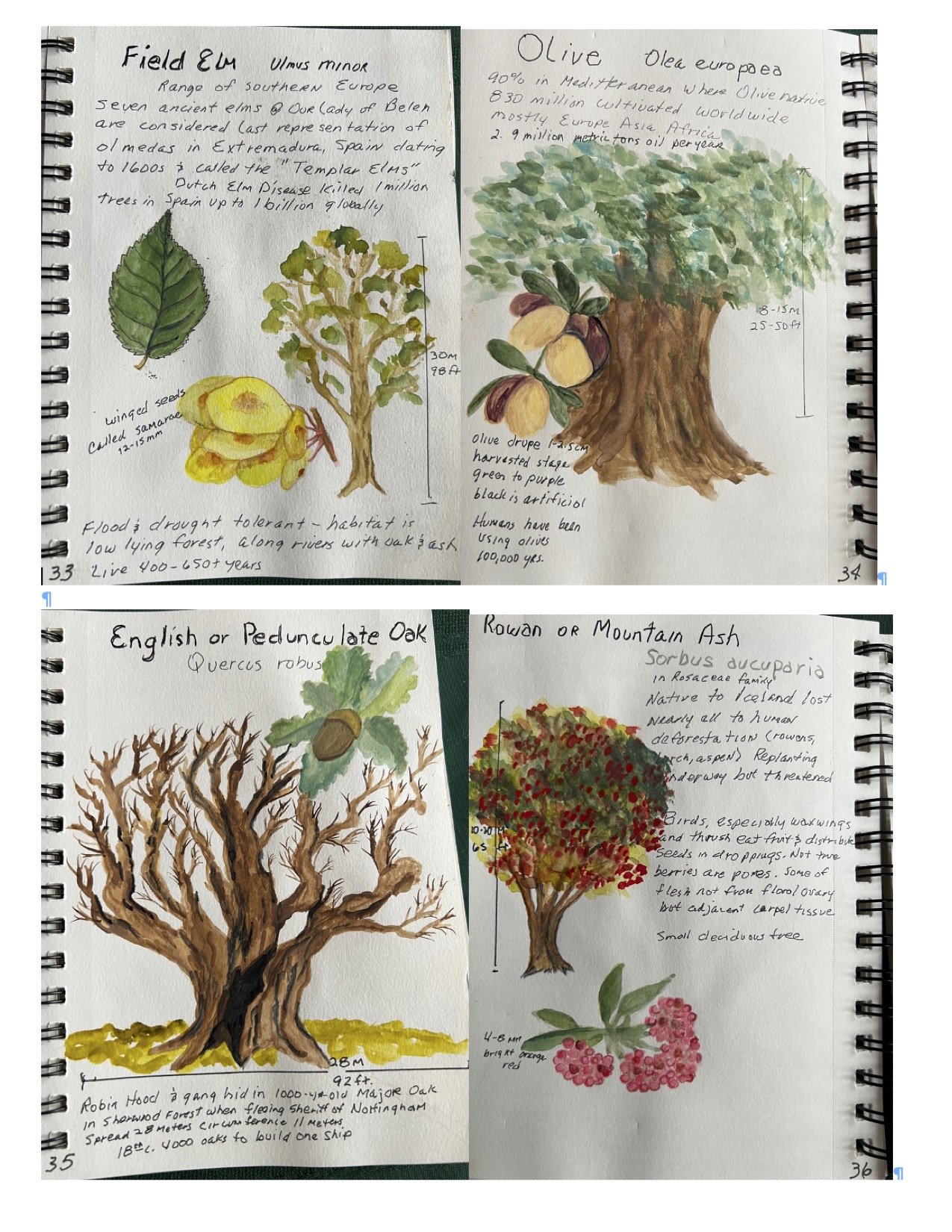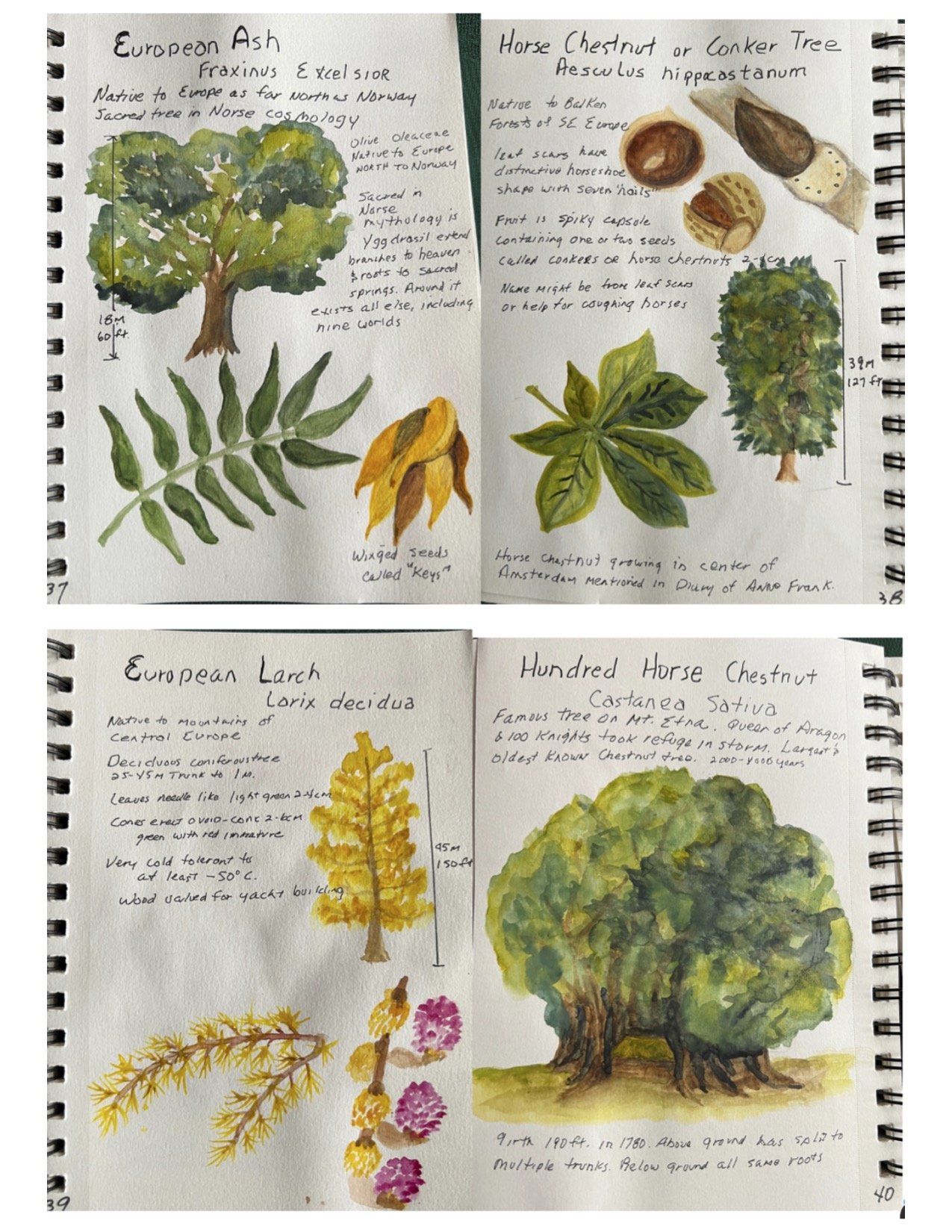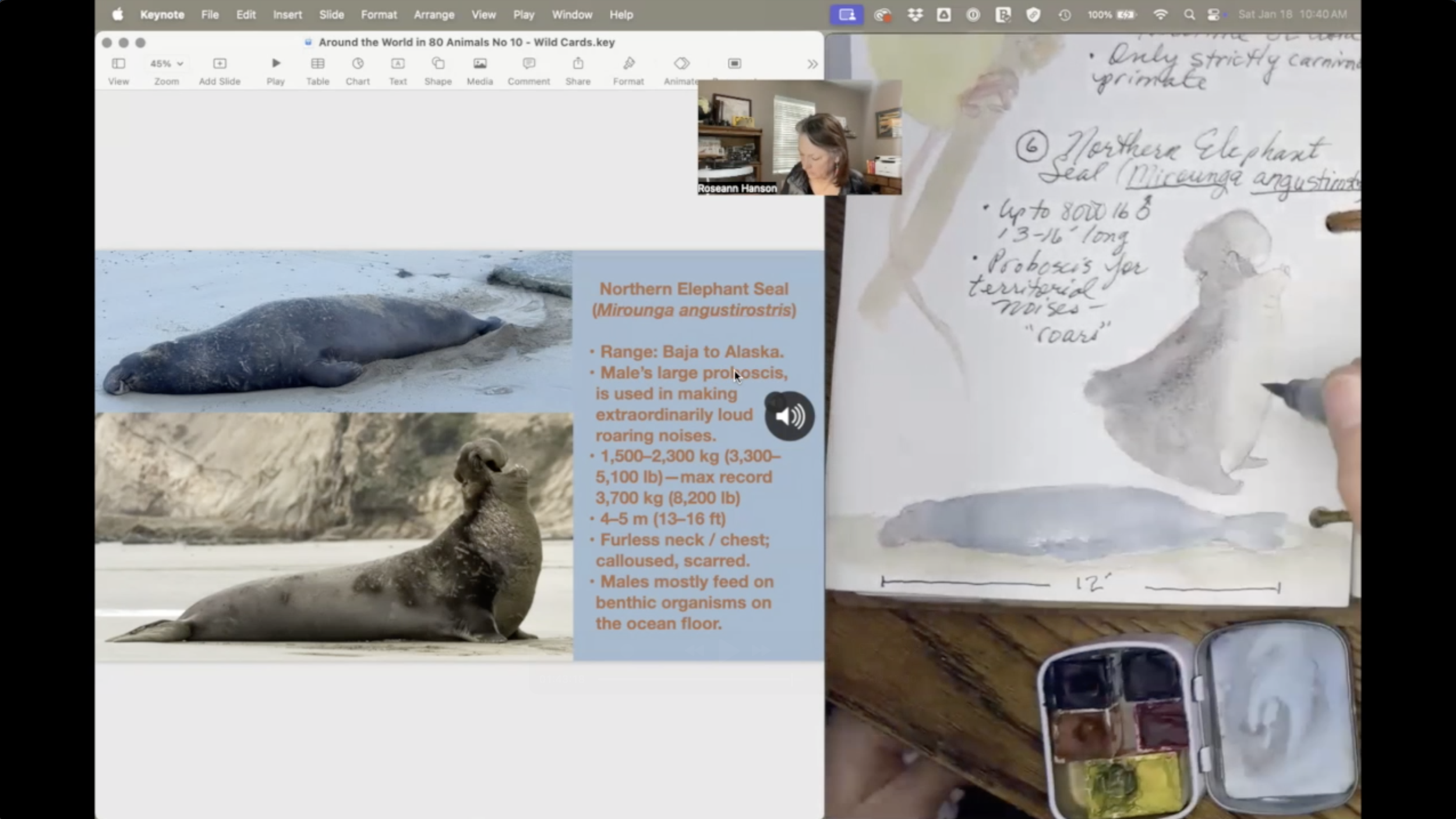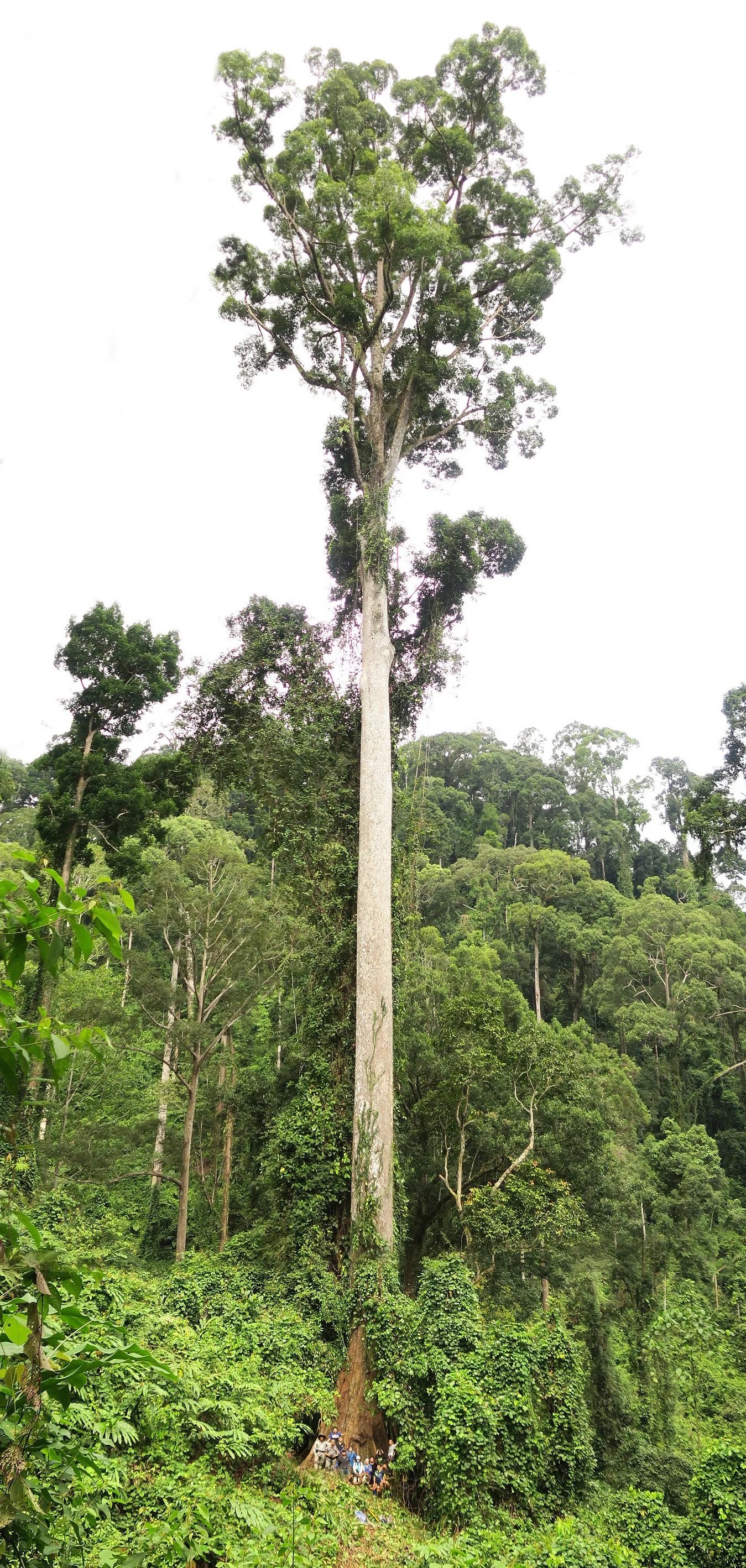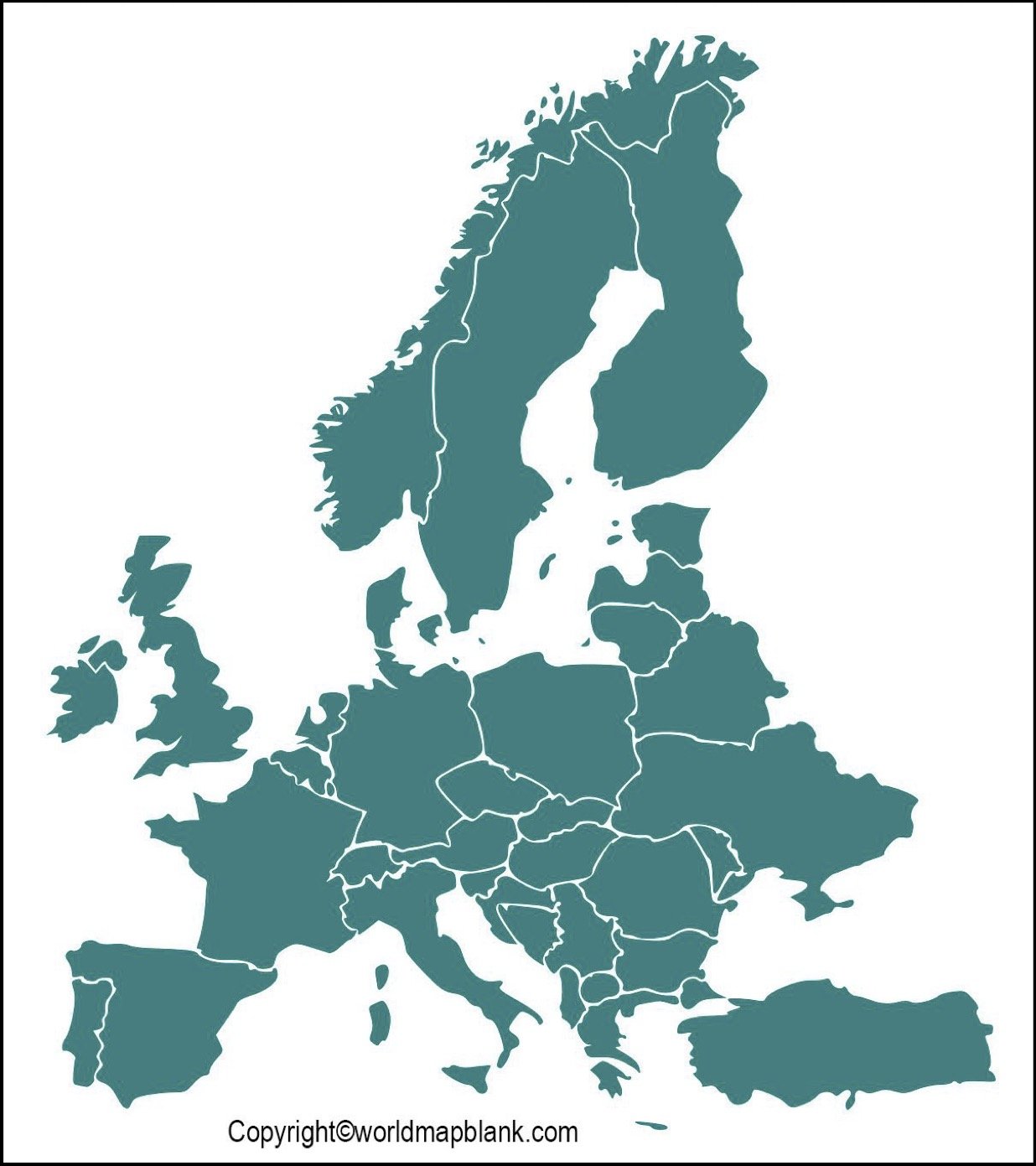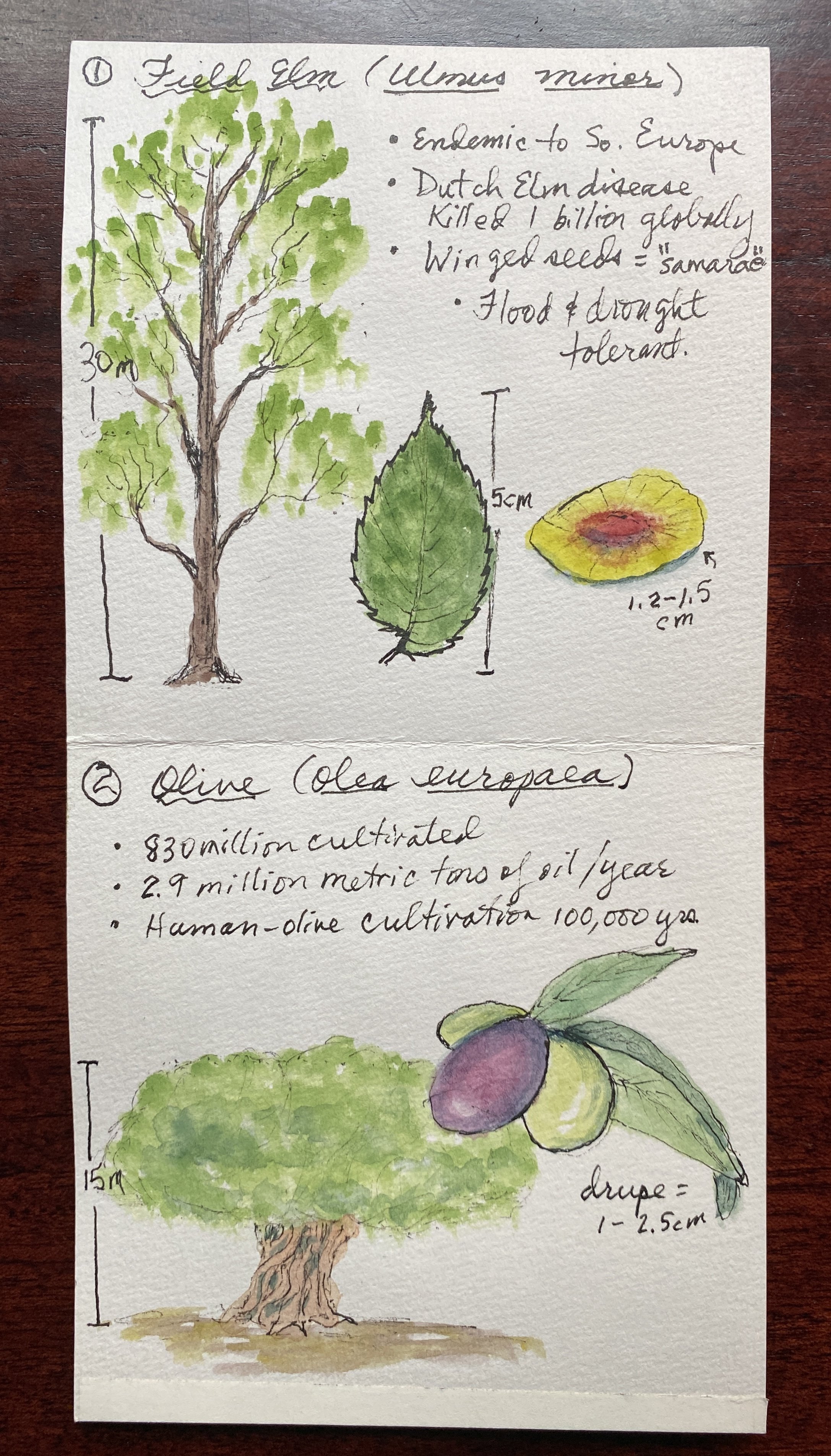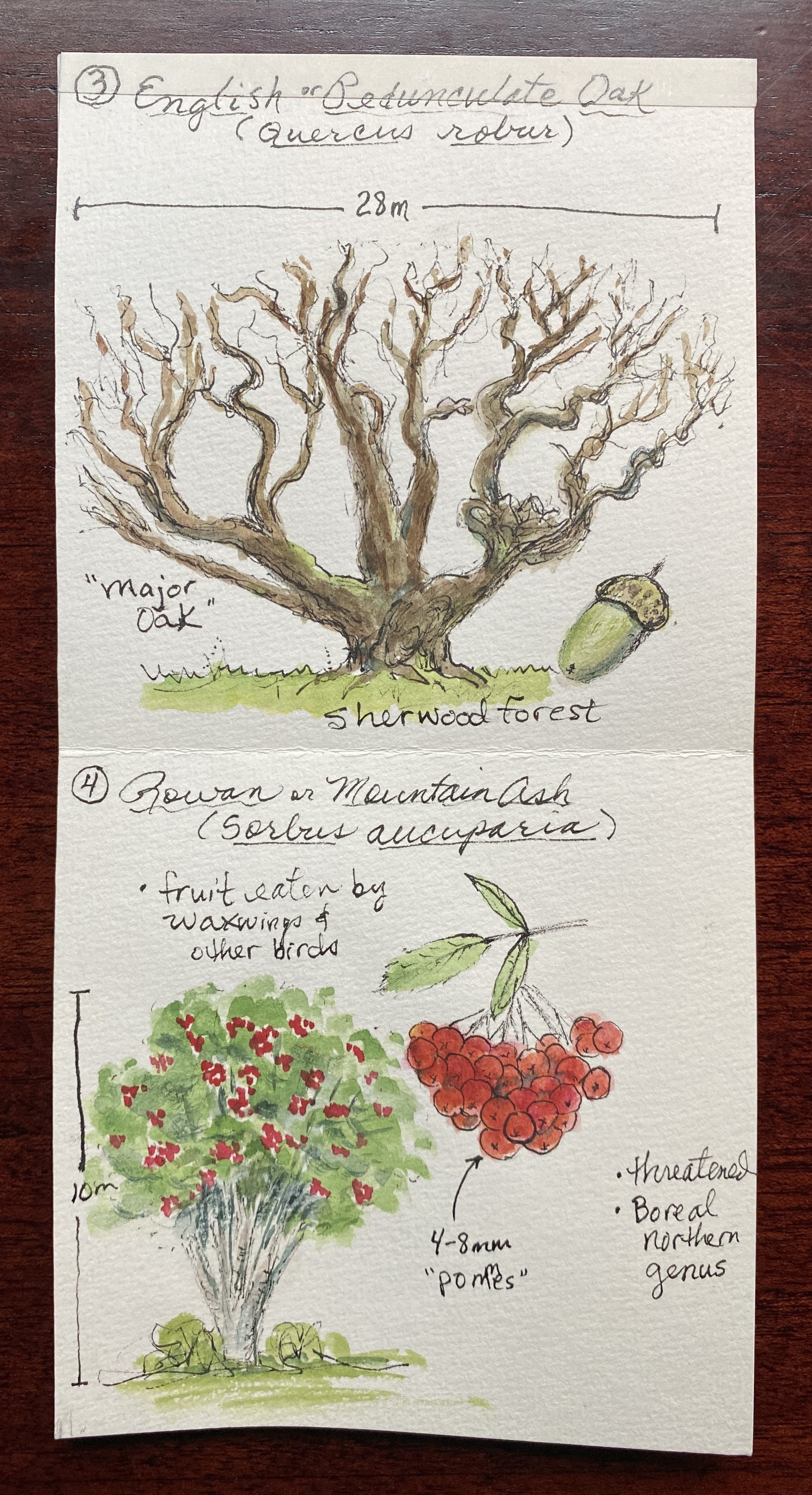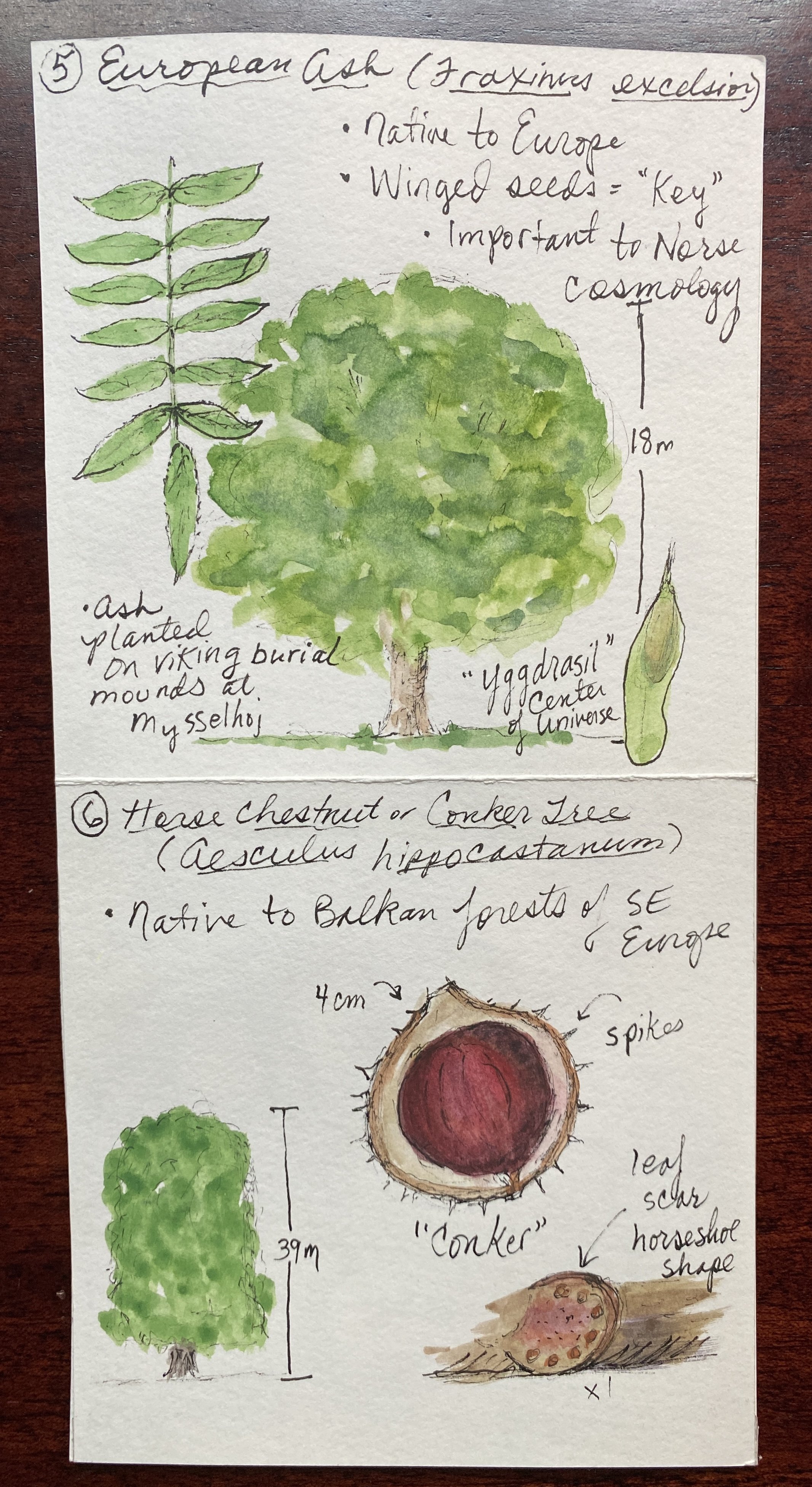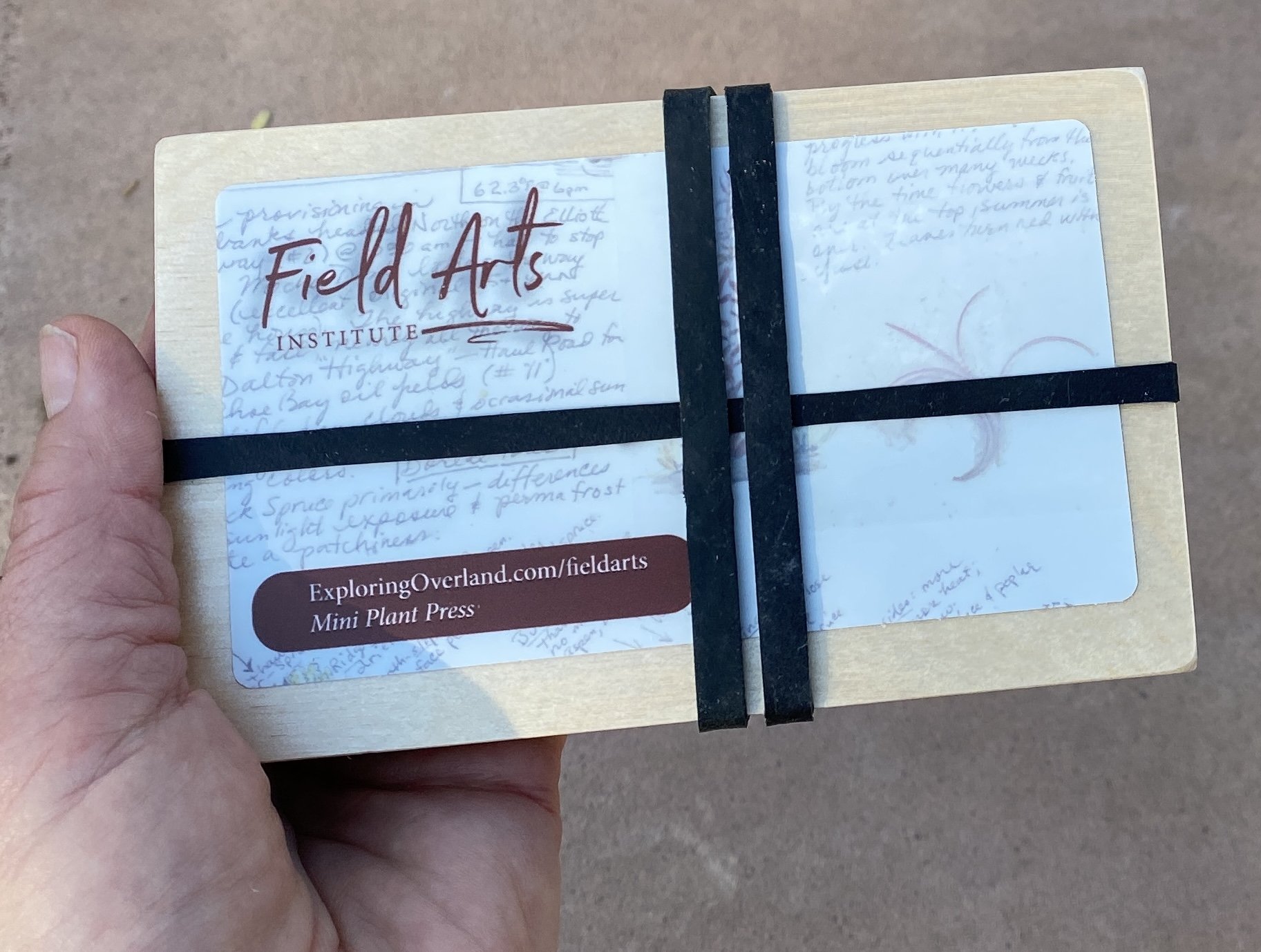Field Arts Workshop: Around the World in 80 Rocks, Fossils, and Formations No. 3 – South America
Note: you may turn on closed captions by clicking the “CC” button in the video controls. You can also view full screen by clicking the Expand arrows.
Based on my series Around the World in 80 Trees (in which we spent a year traveling around the globe by region and sketching interesting, weird, iconic, or beautiful trees and tree-like plants), this is a new series based on geology—we’ll travel the world and learn as much natural history as we can, plus master the art of quickly sketching rocks, fossils, and formations!
No. 3: South America
What you’ll need: a multi-media sketchbook or an accordion style booklet (see below), pen and / or pencil for our base drawings, and then watercolor or colored pencil to quickly bring them to life.
TIP: For plants I used a strip of heavy watercolor paper folded into four squares to create an “accordion” booklet to record my trees (8 total, 4 on each side).
Prepwork: I like to put a map on the first journal page showing where the specimen types were located—so find a good outline map of North America that takes in Alaska to Mexico.
Length: 2 hours
Downloads and Resources
Colors and brush I use:
I favor a simple primary “triad” plus two extra colors: Manganese Blue (“cyan”), Quinacridone Rose (“magenta”), Aureolin Yellow (“yellow”), and Burnt Sienna and Indanthrone Blue, all Daniel Smith.
I use an Isabey Squirrel Mop Travel Brush or a Pentel Waterbrush, depending on my mood!
Any amount is appreciated!
ROSEANN’S FINISHED PAGES
ATTENDEES’ Pages from the Workshop
Please post your pages on our Field Arts Community Forum! It’s free and easy to register, and private!
Field Arts Workshop: Around the World in 80 Rocks, Fossils, and Formations No. 2 – North America (Pt. 2)
Note: you may turn on closed captions by clicking the “CC” button in the video controls. You can also view full screen by clicking the Expand arrows.
Based on my series Around the World in 80 Trees (in which we spent a year traveling around the globe by region and sketching interesting, weird, iconic, or beautiful trees and tree-like plants), this is a new series based on geology—we’ll travel the world and learn as much natural history as we can, plus master the art of quickly sketching rocks, fossils, and formations!
No. 1: North America (Part 1)
What you’ll need: a multi-media sketchbook or an accordion style booklet (see below), pen and / or pencil for our base drawings, and then watercolor or colored pencil to quickly bring them to life.
TIP: For plants I used a strip of heavy watercolor paper folded into four squares to create an “accordion” booklet to record my trees (8 total, 4 on each side).
Prepwork: I like to put a map on the first journal page showing where the specimen types were located—so find a good outline map of North America that takes in Alaska to Mexico.
Length: 2 hours
Downloads and Resources
Colors and brush I use:
I favor a simple primary “triad” plus two extra colors: Manganese Blue (“cyan”), Quinacridone Rose (“magenta”), Aureolin Yellow (“yellow”), and Burnt Sienna and Indanthrone Blue, all Daniel Smith.
I use an Isabey Squirrel Mop Travel Brush or a Pentel Waterbrush, depending on my mood!
Any amount is appreciated!
ROSEANN’S FINISHED PAGES
ATTENDEES’ Pages from the Workshop
Please post your pages on our Field Arts Community Forum! It’s free and easy to register, and private!
Field Arts Workshop: Around the World in 80 Rocks, Fossils, and Formations No. 1 – North America (Pt. 1)
Note: you may turn on closed captions by clicking the “CC” button in the video controls. You can also view full screen by clicking the Expand arrows.
Based on my series Around the World in 80 Trees (in which we spent a year traveling around the globe by region and sketching interesting, weird, iconic, or beautiful trees and tree-like plants), this is a new series based on geology—we’ll travel the world and learn as much natural history as we can, plus master the art of quickly sketching rocks, fossils, and formations!
No. 1: North America (Part 1)
What you’ll need: a multi-media sketchbook or an accordion style booklet (see below), pen and / or pencil for our base drawings, and then watercolor or colored pencil to quickly bring them to life.
TIP: For plants I used a strip of heavy watercolor paper folded into four squares to create an “accordion” booklet to record my trees (8 total, 4 on each side).
Prepwork: I like to put a map on the first journal page showing where the specimen types were located—so find a good outline map of North America that takes in Alaska to Mexico.
Length: 2 hours
Downloads and Resources
Colors and brush I use:
I favor a simple primary “triad” plus two extra colors: Manganese Blue (“cyan”), Quinacridone Rose (“magenta”), Aureolin Yellow (“yellow”), and Burnt Sienna and Indanthrone Blue, all Daniel Smith.
I use an Isabey Squirrel Mop Travel Brush or a Pentel Waterbrush, depending on my mood!
Any amount is appreciated!
ROSEANN’S FINISHED PAGES
ATTENDEES’ Pages from the Workshop
Please post your pages on our Field Arts Community Forum! It’s free and easy to register, and private!
Field Arts Workshop: Around the World in 80 Animals No. 10 – Wild Cards!
Note: you may turn on closed captions by clicking the “CC” button in the video controls. You can also view full screen by clicking the Expand arrows.
Based on my series Around the World in 80 Trees (in which we spent a year traveling around the globe by region and sketching interesting, weird, iconic, or beautiful trees and tree-like plants), this is a new series based on animals—we’ll travel the world and learn as much natural history as we can, plus master the art of quickly sketching birds, mammals, monotremes, and more!
No. 10: Wild Cards!
What you’ll need: a multi-media sketchbook or an accordion style booklet (see below), pen and / or pencil for our base drawings, and then watercolor or colored pencil to quickly bring them to life.
TIP: For plants I used a strip of heavy watercolor paper folded into four squares to create an “accordion” booklet to record my trees (8 total, 4 on each side). For animals I recommend a full sketchbook, or larger squares, at least 5” if you choose an accordion.
Prepwork: One of the critters might do best on toned or black paper with white gel pen, white charcoal, or white gouache for sketching. I used a small square of black paper and glued it into my journal.
Length: 2 hours
Downloads and Resources
Colors and brush I use:
I favor a simple primary “triad” plus two extra colors: Manganese Blue (“cyan”), Quinacridone Rose (“magenta”), Aureolin Yellow (“yellow”), and Burnt Sienna and Indanthrone Blue, all Daniel Smith.
I use an Isabey Squirrel Mop Travel Brush or a Pentel Waterbrush, depending on my mood!
Any amount is appreciated!
ROSEANN’S FINISHED PAGES
ATTENDEES’ Pages from the Workshop
Please post your pages on our Field Arts Community Forum! It’s free and easy to register, and private!
Field Arts Workshop: Around the World in 80 Animals No. 9 – Oceania
Note: you may turn on closed captions by clicking the “CC” button in the video controls. You can also view full screen by clicking the Expand arrows.
Based on my series Around the World in 80 Trees (in which we spent a year traveling around the globe by region and sketching interesting, weird, iconic, or beautiful trees and tree-like plants), this is a new series based on animals—we’ll travel the world and learn as much natural history as we can, plus master the art of quickly sketching birds, mammals, monotremes, and more!
No. 9: Oceania
What you’ll need: a multi-media sketchbook or an accordion style booklet (see below), pen and / or pencil for our base drawings, and then watercolor or colored pencil to quickly bring them to life.
TIP: For plants I used a strip of heavy watercolor paper folded into four squares to create an “accordion” booklet to record my trees (8 total, 4 on each side). For animals I recommend a full sketchbook, or larger squares, at least 5” if you choose an accordion.
Prepwork: Create a map of the region so you can place the regions the species were located. Longtime “Around the World” series attendee Dorothea suggested this one (just be sure to acknowledge the source on your sketch): Simple Outline Oceania Map
Length: 2 hours
Downloads and Resources
PDF of the Presentation
Because I had so much trouble with the internet, I had to turn on the “talking head” box, and this showed up at times covering the titles on the slides, so here is a link to view the PDF of the slide show for detail. Please note this is for personal use only, and may not be used for any presentations or workshops without written permission.
Colors and brush I use:
I favor a simple primary “triad” plus two extra colors: Manganese Blue (“cyan”), Quinacridone Rose (“magenta”), Aureolin Yellow (“yellow”), and Burnt Sienna and Indanthrone Blue, all Daniel Smith.
I use an Isabey Squirrel Mop Travel Brush or a Pentel Waterbrush, depending on my mood!
Any amount is appreciated!
ROSEANN’S FINISHED PAGES
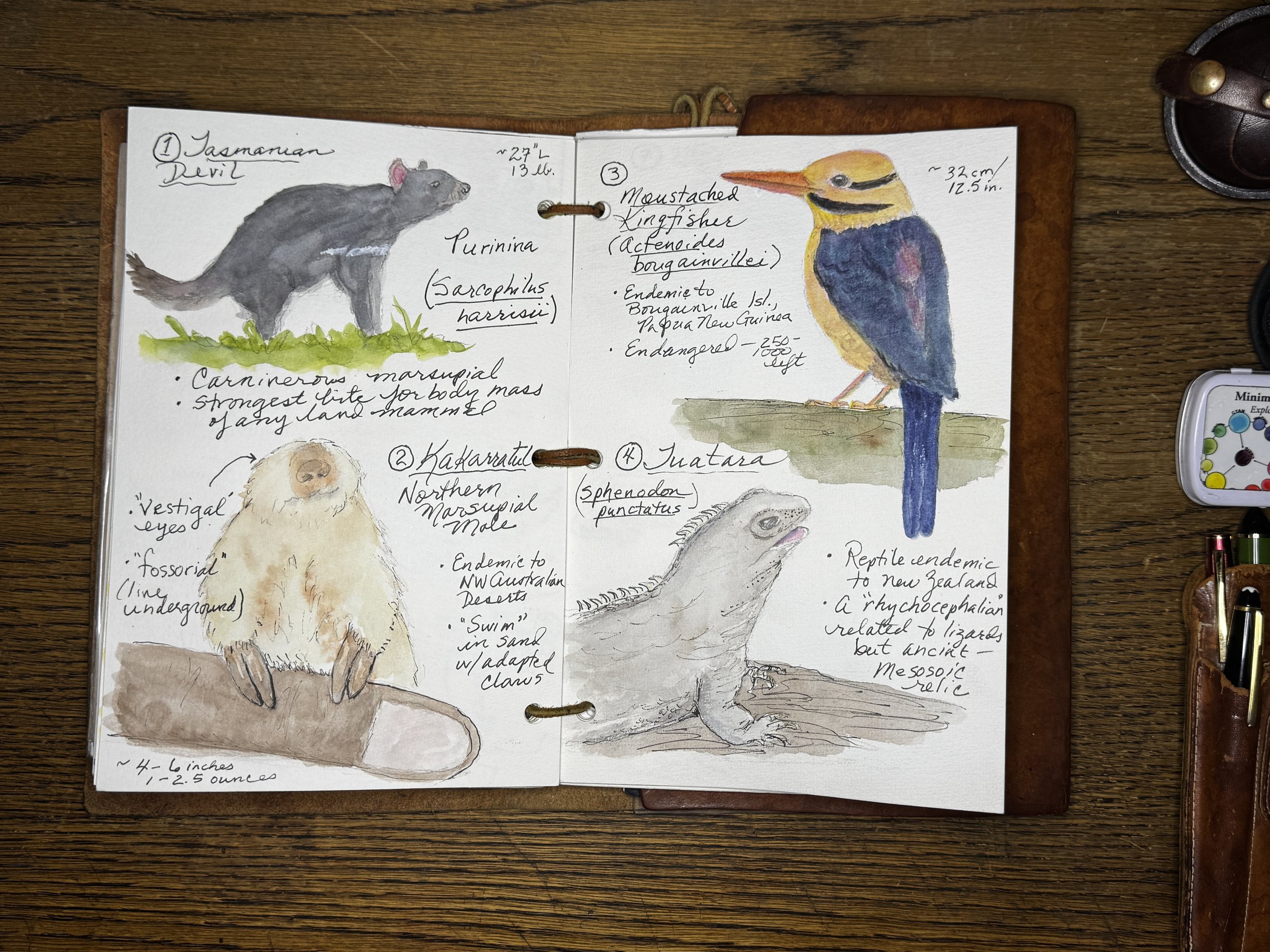
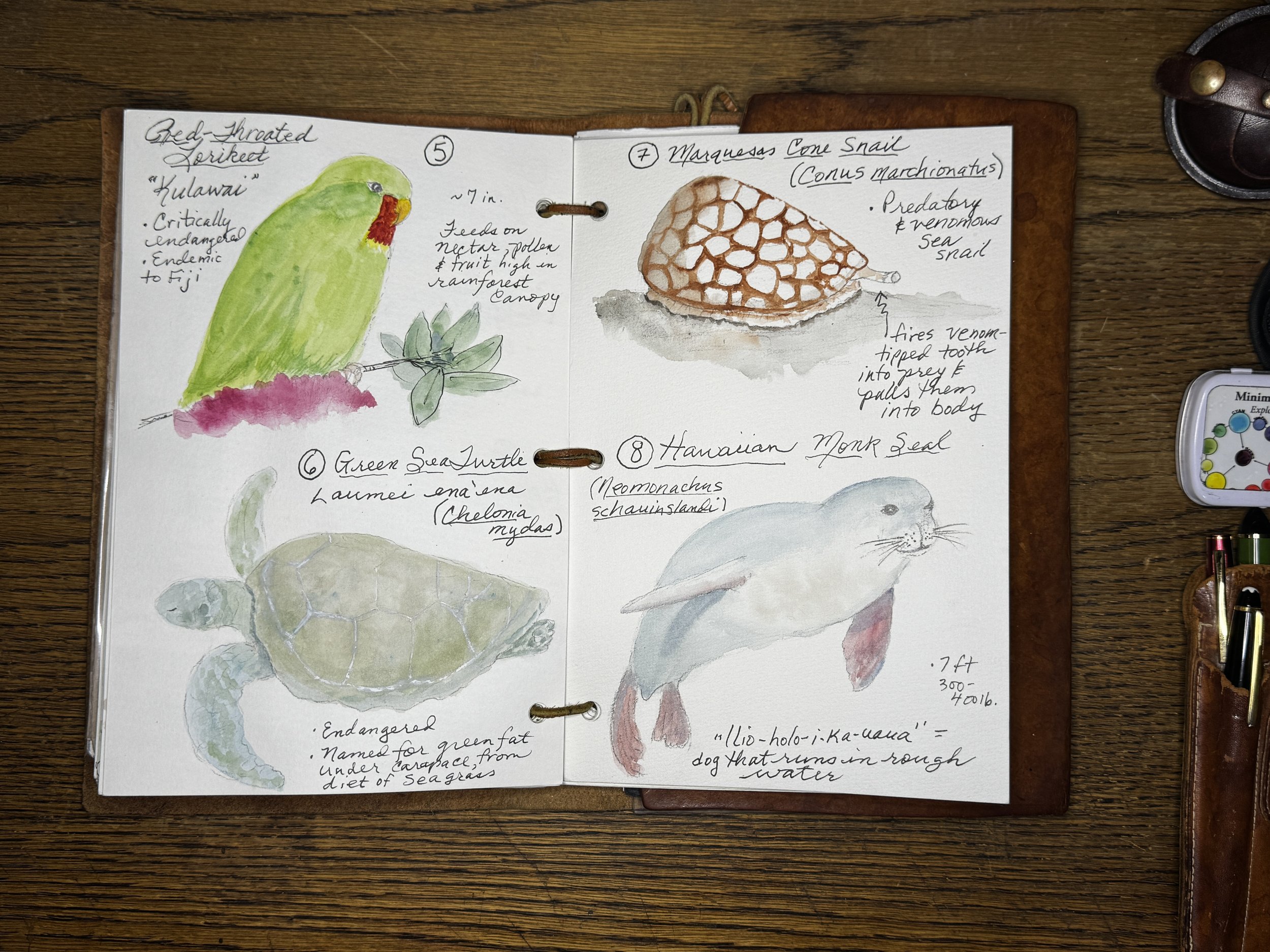
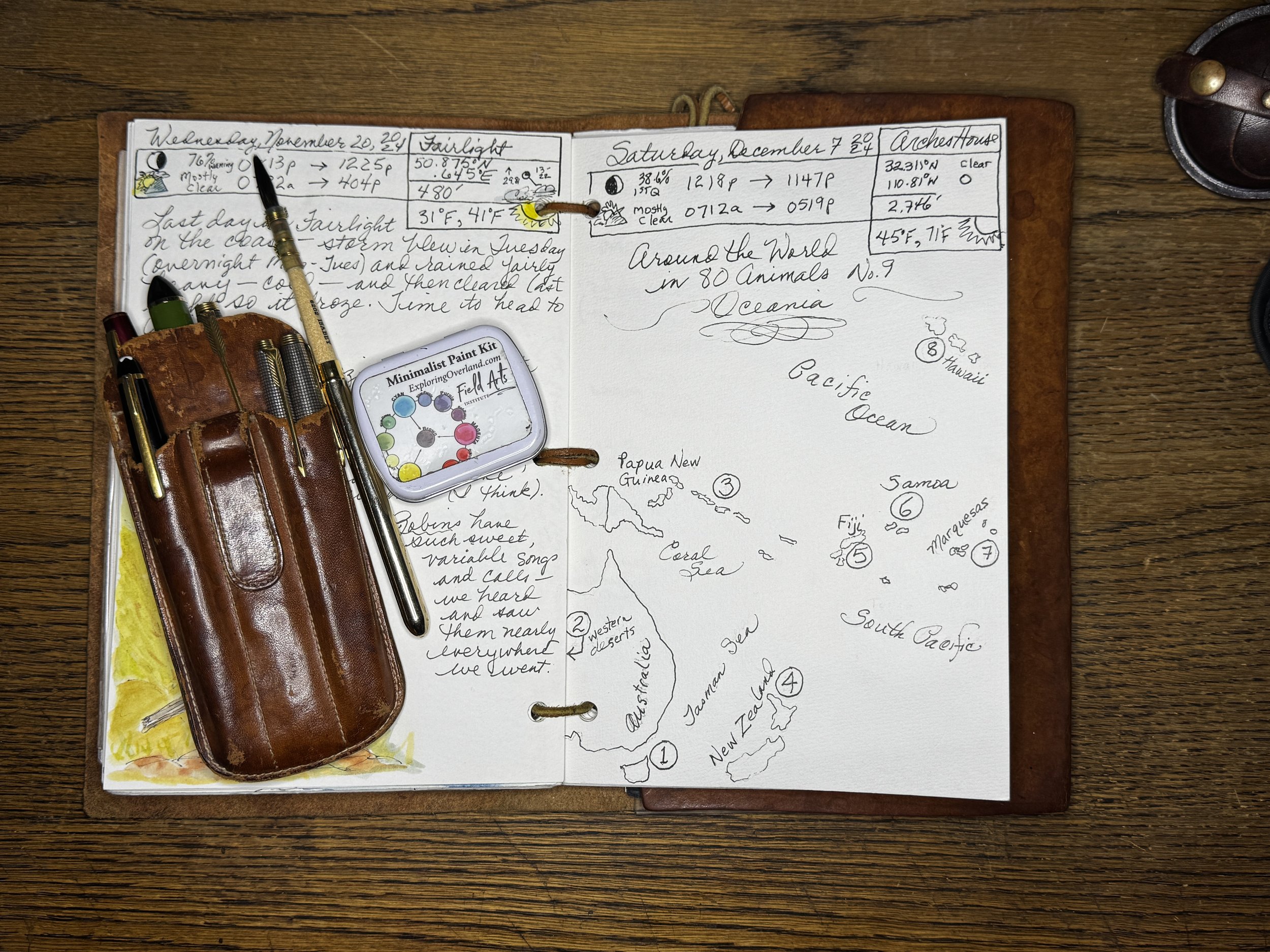
ATTENDEES’ Pages from the Workshop
Please post your pages on our Field Arts Community Forum! It’s free and easy to register, and private!
Field Arts Workshop: Around the World in 80 Animals No. 8 (East and South Asia)
Note: you may turn on closed captions by clicking the “CC” button in the video controls. You can also view full screen by clicking the Expand arrows.
Draco_spilonotus By A.S.Kono - Own work, CC BY-SA 3.0
Based on my series Around the World in 80 Trees (in which we spent a year traveling around the globe by region and sketching interesting, weird, iconic, or beautiful trees and tree-like plants), this is a new series based on animals—we’ll travel the world and learn as much natural history as we can, plus master the art of quickly sketching birds, mammals, monotremes, and more!
No. 8: Eastern and South Asia
What you’ll need: a multi-media sketchbook or an accordion style booklet (see below), pen and / or pencil for our base drawings, and then watercolor or colored pencil to quickly bring them to life.
TIP: For plants I used a strip of heavy watercolor paper folded into four squares to create an “accordion” booklet to record my trees (8 total, 4 on each side). For animals I recommend a full sketchbook, or larger squares, at least 5” if you choose an accordion.
Prepwork: Create a map of the region so you can place the regions the species were located.
Length: 2 hours
Downloads and Resources
Colors and brush I use:
I favor a simple primary “triad” plus two extra colors: Manganese Blue (“cyan”), Quinacridone Rose (“magenta”), Aureolin Yellow (“yellow”), and Burnt Sienna and Indanthrone Blue, all Daniel Smith.
I use an Isabey Squirrel Mop Travel Brush or a Pentel Waterbrush, depending on my mood!
Any amount is appreciated!
ROSEANN’S FINISHED PAGES
ATTENDEES’ Pages from the Workshop
Please post your pages on our Field Arts Community Forum! It’s free and easy to register, and private!
Field Arts Workshop: Around the World in 80 Animals No. 7 (Middle East and W. Asia)
Note: you may turn on closed captions by clicking the “CC” button in the video controls. You can also view full screen by clicking the Expand arrows.
Nubian ibex by Netzach Farbiash, Ph.D Pikiwiki Israel, CC BY 2.5 Wikipedia
Golden hamster By Harpoen - Own work, CC BY-SA 3.0
Based on my series Around the World in 80 Trees (in which we spent a year traveling around the globe by region and sketching interesting, weird, iconic, or beautiful trees and tree-like plants), this is a new series based on animals—we’ll travel the world and learn as much natural history as we can, plus master the art of quickly sketching birds, mammals, monotremes, and more!
No. 7: Middle East and Western Asia
What you’ll need: a multi-media sketchbook or an accordion style booklet (see below), pen and / or pencil for our base drawings, and then watercolor or colored pencil to quickly bring them to life.
TIP: For plants I used a strip of heavy watercolor paper folded into four squares to create an “accordion” booklet to record my trees (8 total, 4 on each side). For animals I recommend a full sketchbook, or larger squares, at least 5” if you choose an accordion.
Prepwork: Create a map of the region so you can place the regions the species were located.
Length: 2 hours
Downloads and Resources
Colors and brush I use:
I favor a simple primary “triad” plus two extra colors: Manganese Blue (“cyan”), Quinacridone Rose (“magenta”), Aureolin Yellow (“yellow”), and Burnt Sienna and Indanthrone Blue, all Daniel Smith.
I use an Isabey Squirrel Mop Travel Brush.
Any amount is appreciated!
ROSEANN’S FINISHED PAGES
ATTENDEES’ Pages from the Workshop
Please post your pages on our Field Arts Community Forum! It’s free and easy to register, and private!
Field Arts Workshop: Around the World in 80 Animals No. 6 (Europe)
Note: you may turn on closed captions by clicking the “CC” button in the video controls. You can also view full screen by clicking the Expand arrows.
Iberian wolf (by Arturo de Frias Marques - Own work, CC BY-SA 4.0, https://commons.wikimedia.org/w/index.php?curid=36546315)
Eurasian red squirrel (by hedera.baltica from Wrocław, Poland - Squirrel, CC BY-SA 2.0, https://commons.wikimedia.org/w/index.php?curid=43379772 )
Based on my series Around the World in 80 Trees (in which we spent a year traveling around the globe by region and sketching interesting, weird, iconic, or beautiful trees and tree-like plants), this is a new series based on animals—we’ll travel the world and learn as much natural history as we can, plus master the art of quickly sketching birds, mammals, monotremes, and more!
No. 6: Europe
What you’ll need: a multi-media sketchbook or an accordion style booklet (see below), pen and / or pencil for our base drawings, and then watercolor or colored pencil to quickly bring them to life.
TIP: For plants I used a strip of heavy watercolor paper folded into four squares to create an “accordion” booklet to record my trees (8 total, 4 on each side). For animals I recommend a full sketchbook, or larger squares, at least 5” if you choose an accordion.
Prepwork: Create a map of the region so you can place the regions the species were located.
Length: 2 hours
Downloads and Resources
Colors and brush I use:
I favor a simple primary “triad” plus two extra colors: Manganese Blue (“cyan”), Quinacridone Rose (“magenta”), Aureolin Yellow (“yellow”), and Burnt Sienna and Indanthrone Blue, all Daniel Smith.
I use an Isabey Squirrel Mop Travel Brush.
Any amount is appreciated!
ROSEANN’S FINISHED PAGE
ATTENDEES’ Pages from the Workshop
Please post your pages on our Field Arts Community Forum! It’s free and easy to register, and private!
Field Arts Workshop: Around the World in 80 Animals No. 5 (Africa, Pt. 2)
Note: you may turn on closed captions by clicking the “CC” button in the video controls. You can also view full screen by clicking the Expand arrows.
By Olaf Oliviero Riemer, CC BY-SA 3.0, https://commons.wikimedia.org/w/index.php?curid=18375332
naturepl.com / : Daniel Heuclin Media ID 20783286 © www.naturepl.com https://www.natureplprints.com/april-2021-highlights/sahara-sand-viper-cerastes-vipera-20783286.html
Based on my series Around the World in 80 Trees (in which we spent a year traveling around the globe by region and sketching interesting, weird, iconic, or beautiful trees and tree-like plants), this is a new series based on animals—we’ll travel the world and learn as much natural history as we can, plus master the art of quickly sketching birds, mammals, monotremes, and more!
No. 4: Africa (Part 1)
What you’ll need: a multi-media sketchbook or an accordion style booklet (see below), pen and / or pencil for our base drawings, and then watercolor or colored pencil to quickly bring them to life.
TIP: For plants I used a strip of heavy watercolor paper folded into four squares to create an “accordion” booklet to record my trees (8 total, 4 on each side). For animals I recommend a full sketchbook, or larger squares, at least 5” if you choose an accordion.
Prepwork: Create a map of the region so you can place the regions the species were located.
Length: 2 hours
Downloads and Resources
Colors and brush I use:
I favor a simple primary “triad” plus two extra colors: Manganese Blue (“cyan”), Quinacridone Rose (“magenta”), Aureolin Yellow (“yellow”), and Burnt Sienna and Indanthrone Blue, all Daniel Smith.
I use an Isabey Squirrel Mop Travel Brush.
Any amount is appreciated!
ROSEANN’S FINISHED PAGE
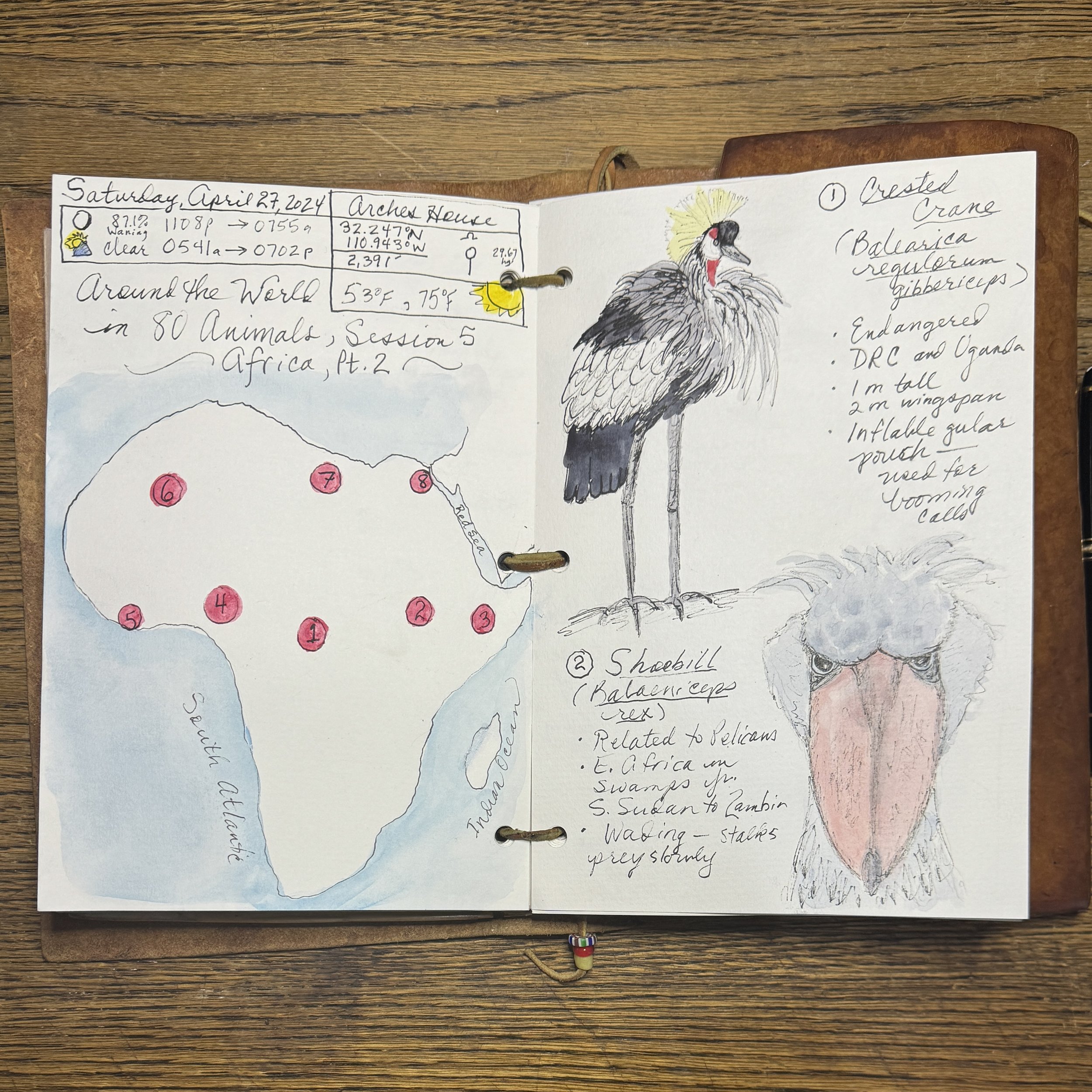
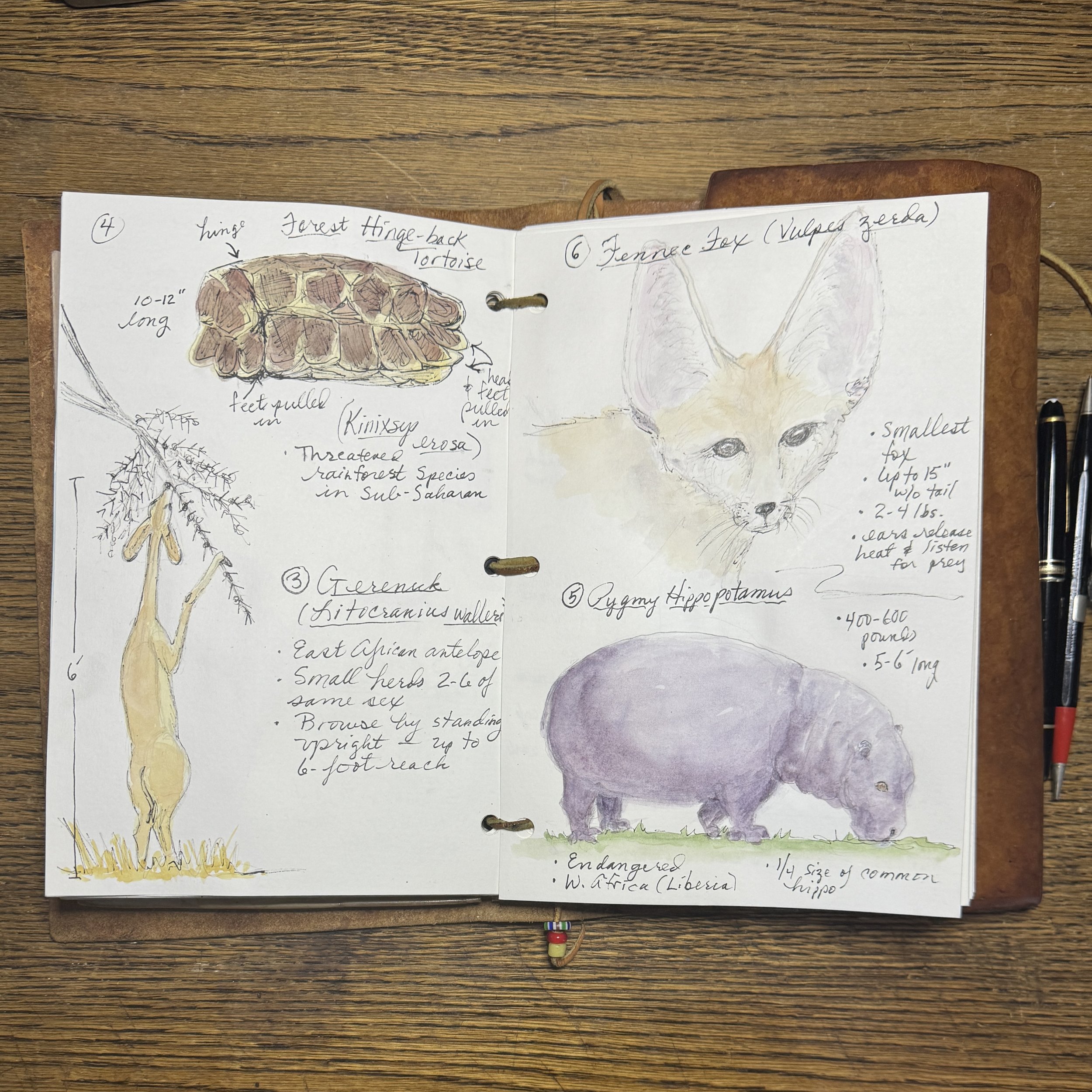
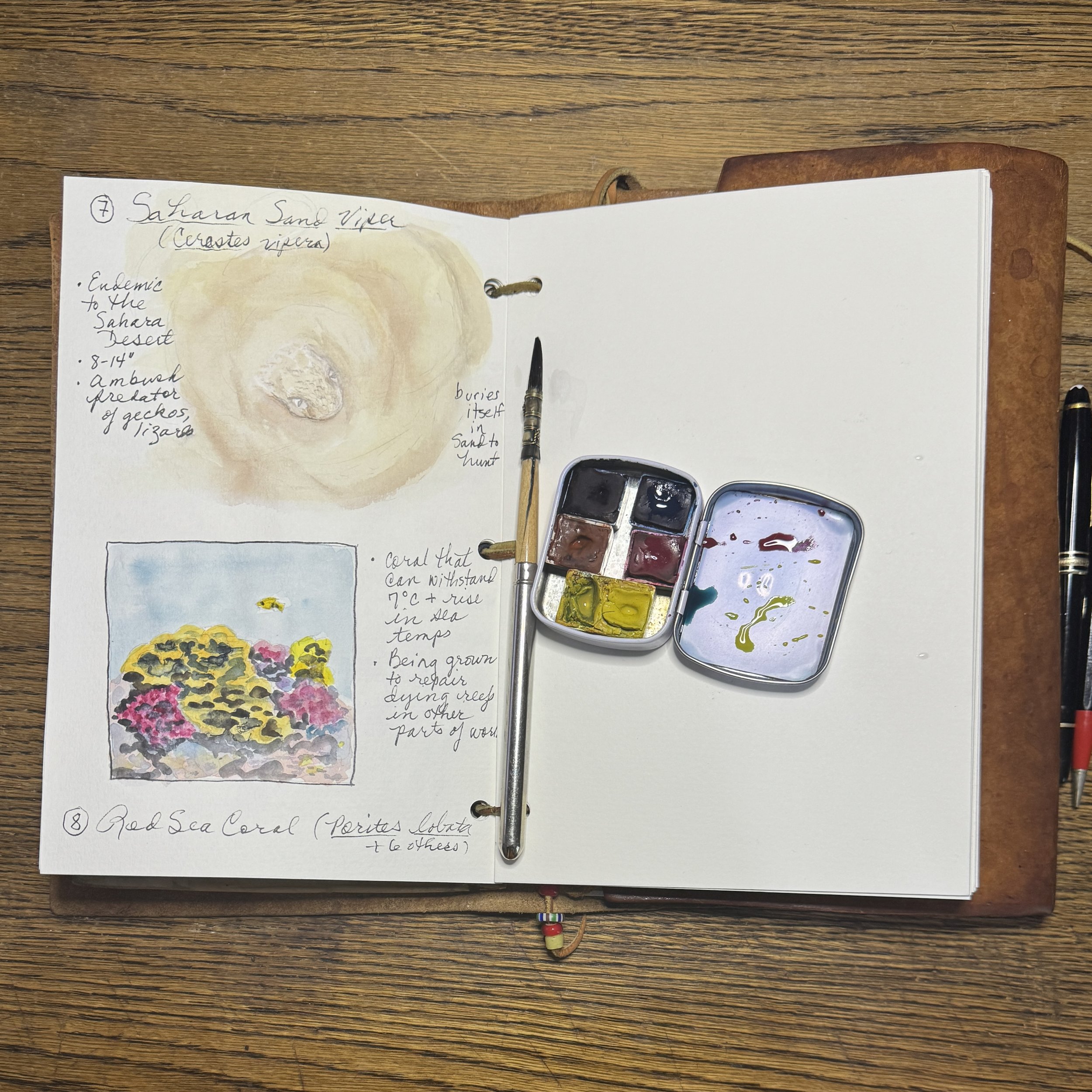
ATTENDEES’ Pages from the Workshop
Please post your pages on our Field Arts Community Forum! It’s free and easy to register, and private!
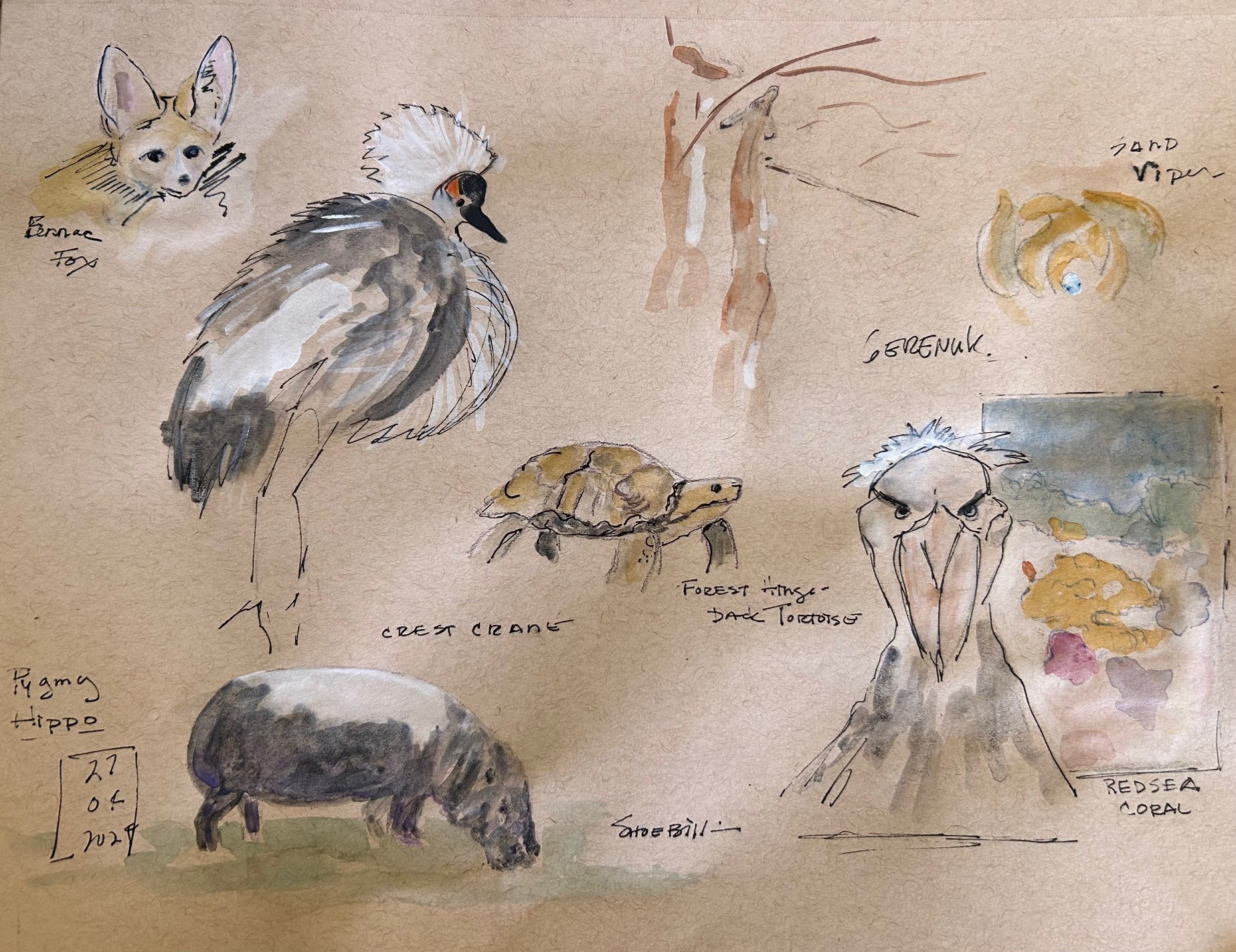
Field Arts Workshop: Around the World in 80 Animals No. 4 (Africa, Pt. 1)
Note: you may turn on closed captions by clicking the “CC” button in the video controls. You can also view full screen by clicking the Expand arrows.
Getty Images - Unsplash Plus.com
Based on my series Around the World in 80 Trees (in which we spent a year traveling around the globe by region and sketching interesting, weird, iconic, or beautiful trees and tree-like plants), this is a new series based on animals—we’ll travel the world and learn as much natural history as we can, plus master the art of quickly sketching birds, mammals, monotremes, and more!
No. 4: Africa (Part 1)
What you’ll need: a multi-media sketchbook or an accordion style booklet (see below), pen and / or pencil for our base drawings, and then watercolor or colored pencil to quickly bring them to life.
TIP: For plants I used a strip of heavy watercolor paper folded into four squares to create an “accordion” booklet to record my trees (8 total, 4 on each side). For animals I recommend a full sketchbook, or larger squares, at least 5” if you choose an accordion.
Prepwork: Create a map of the region so you can place the regions the species were located.
Length: 2 hours
Downloads and Resources
Colors and brush I use:
I favor a simple primary “triad” plus two extra colors: Manganese Blue (“cyan”), Quinacridone Rose (“magenta”), Aureolin Yellow (“yellow”), and Burnt Sienna and Indanthrone Blue, all Daniel Smith.
I use an Isabey Squirrel Mop Travel Brush.
Any amount is appreciated!
ROSEANN’S FINISHED PAGE
ATTENDEES’ Pages from the Workshop
Please post your pages on our Field Arts Community Forum! It’s free and easy to register, and private!
Field Arts Workshop: Around the World in 80 Animals No. 3 (South America)
Note: you may turn on closed captions by clicking the “CC” button in the video controls. You can also view full screen by clicking the Expand arrows.
Photo: Jonathan Hanson
Electrophorus_electricus_showing_lateral_line_pits By Oleksandr (Alex) Zakletsky - Own work, CC BY 4.0, Wikipedia
Based on my series Around the World in 80 Trees (in which we spent a year traveling around the globe by region and sketching interesting, weird, iconic, or beautiful trees and tree-like plants), this is a new series based on animals—we’ll travel the world and learn as much natural history as we can, plus master the art of quickly sketching birds, mammals, monotremes, and more!
No. 3: South America
What you’ll need: a multi-media sketchbook or an accordion style booklet (see below), pen and / or pencil for our base drawings, and then watercolor or colored pencil to quickly bring them to life.
TIP: For plants I used a strip of heavy watercolor paper folded into four squares to create an “accordion” booklet to record my trees (8 total, 4 on each side). For animals I recommend a full sketchbook, or larger squares, at least 5” if you choose an accordion.
Prepwork: Create a map of the region so you can place the regions the species were located.
Length: 2 hours, 17 minutes
Downloads and Resources
Colors and brush I use:
I favor a simple primary “triad” plus two extra colors: Manganese Blue (“cyan”), Quinacridone Rose (“magenta”), Aureolin Yellow (“yellow”), and Burnt Sienna and Indanthrone Blue, all Daniel Smith.
I use an Isabey Squirrel Mop Travel Brush.
Any amount is appreciated!
ROSEANN’S FINISHED PAGES
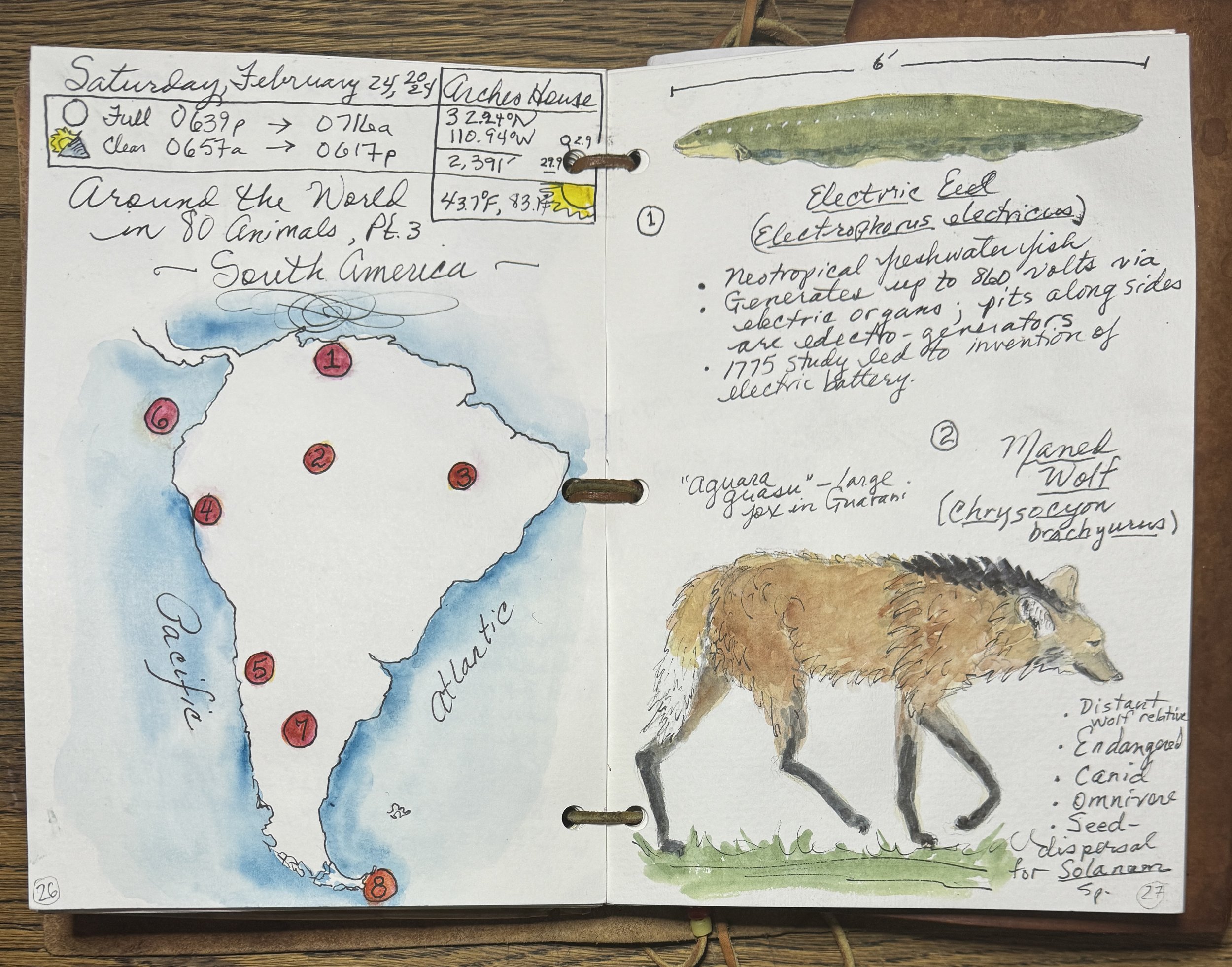

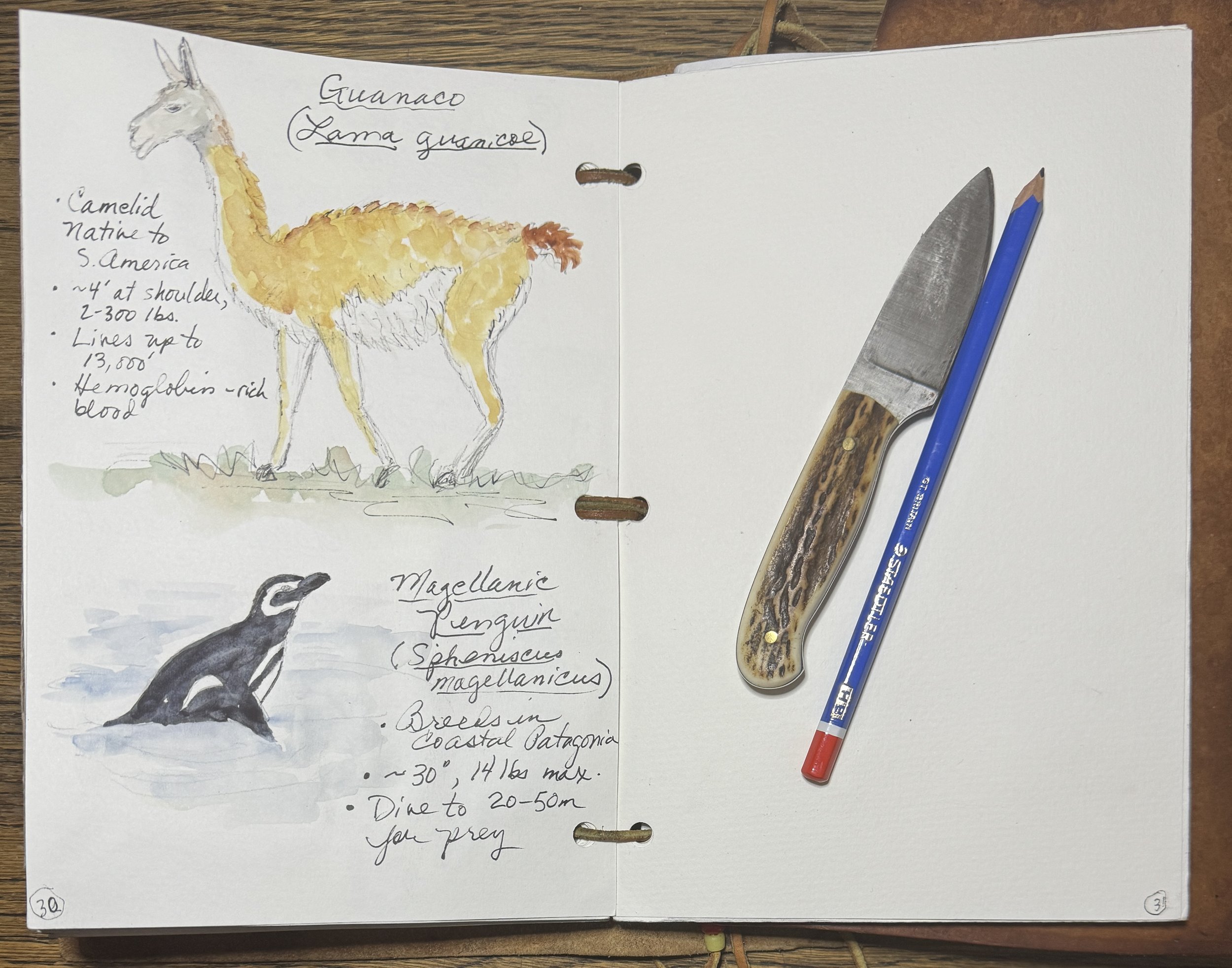
ATTENDEES’ Pages from the Workshop
Please post your pages on our Field Arts Community Forum! It’s free and easy to register, and private!
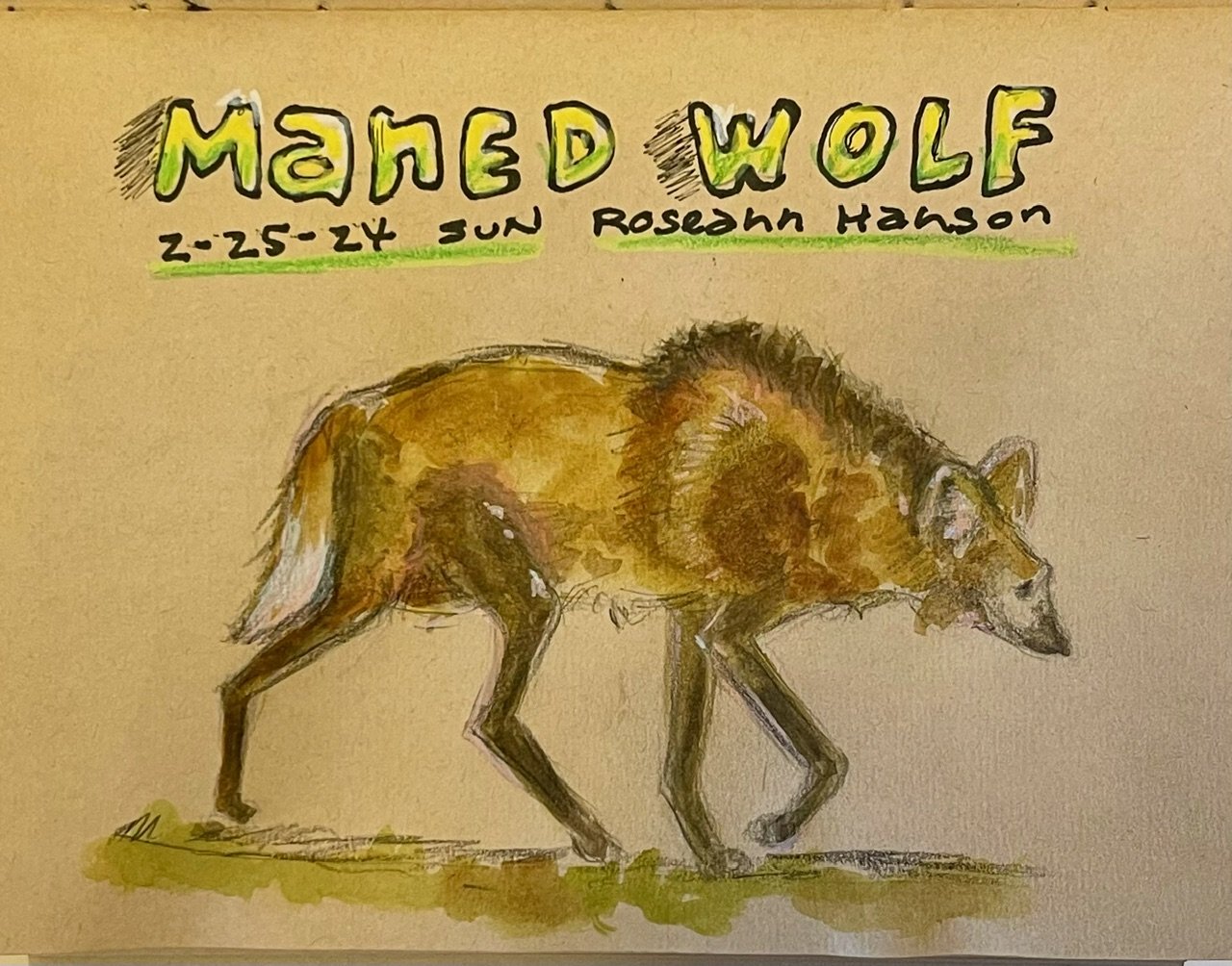
Field Arts Workshop: Around the World in 80 Animals No. 2 (North America Part 2)
Note: you may turn on closed captions by clicking the “CC” button in the video controls. You can also view full screen by clicking the Expand arrows.
Click on images for larger view.
Based on my series Around the World in 80 Trees (in which we spent a year traveling around the globe by region and sketching interesting, weird, iconic, or beautiful trees and tree-like plants), this is a new series based on animals—we’ll travel the world and learn as much natural history as we can, plus master the art of quickly sketching birds, mammals, monotremes, and more!
No. 2: North America, Part 2, the South
What you’ll need: a multi-media sketchbook or an accordion style booklet (see below), pen and / or pencil for our base drawings, and then watercolor or colored pencil to quickly bring them to life.
TIP: I used a strip of heavy watercolor paper folded into four squares to create an “accordion” booklet to record my trees (8 total, 4 on each side). For animals I recommend larger squares, at least 5” if you choose an accordion.
Prepwork: Create a map of the region so you can place the regions the species were located.
Length: 2 hours
Downloads and Resources
Colors and brush I use:
I favor a simple primary “triad” plus two extra colors: Manganese Blue (“cyan”), Quinacridone Rose (“magenta”), Aureolin Yellow (“yellow”), and Burnt Sienna and Indanthrone Blue, all Daniel Smith.
I use an Isabey Squirrel Mop Travel Brush.
Any amount is appreciated!
ROSEANN’S FINISHED PAGES
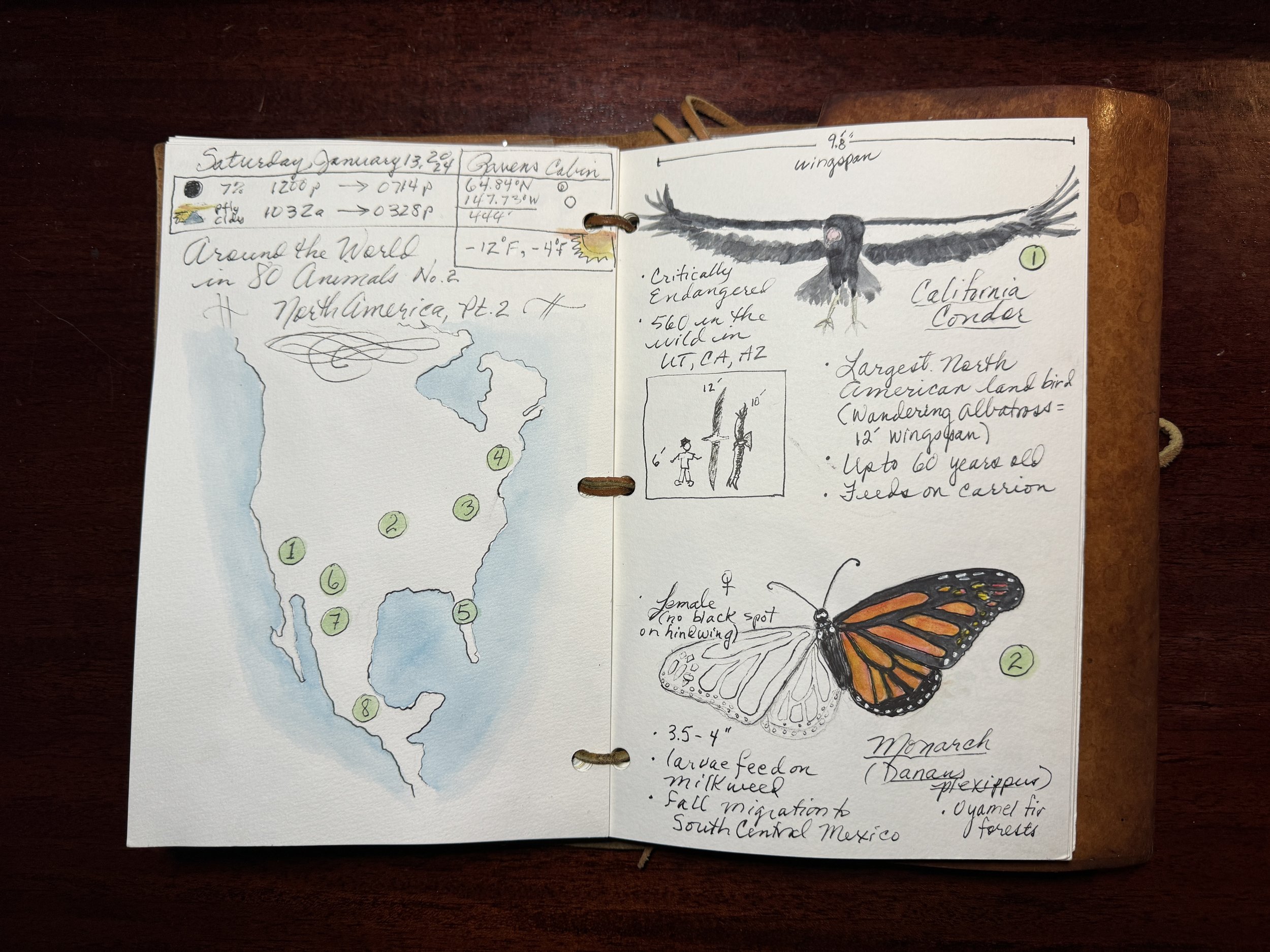
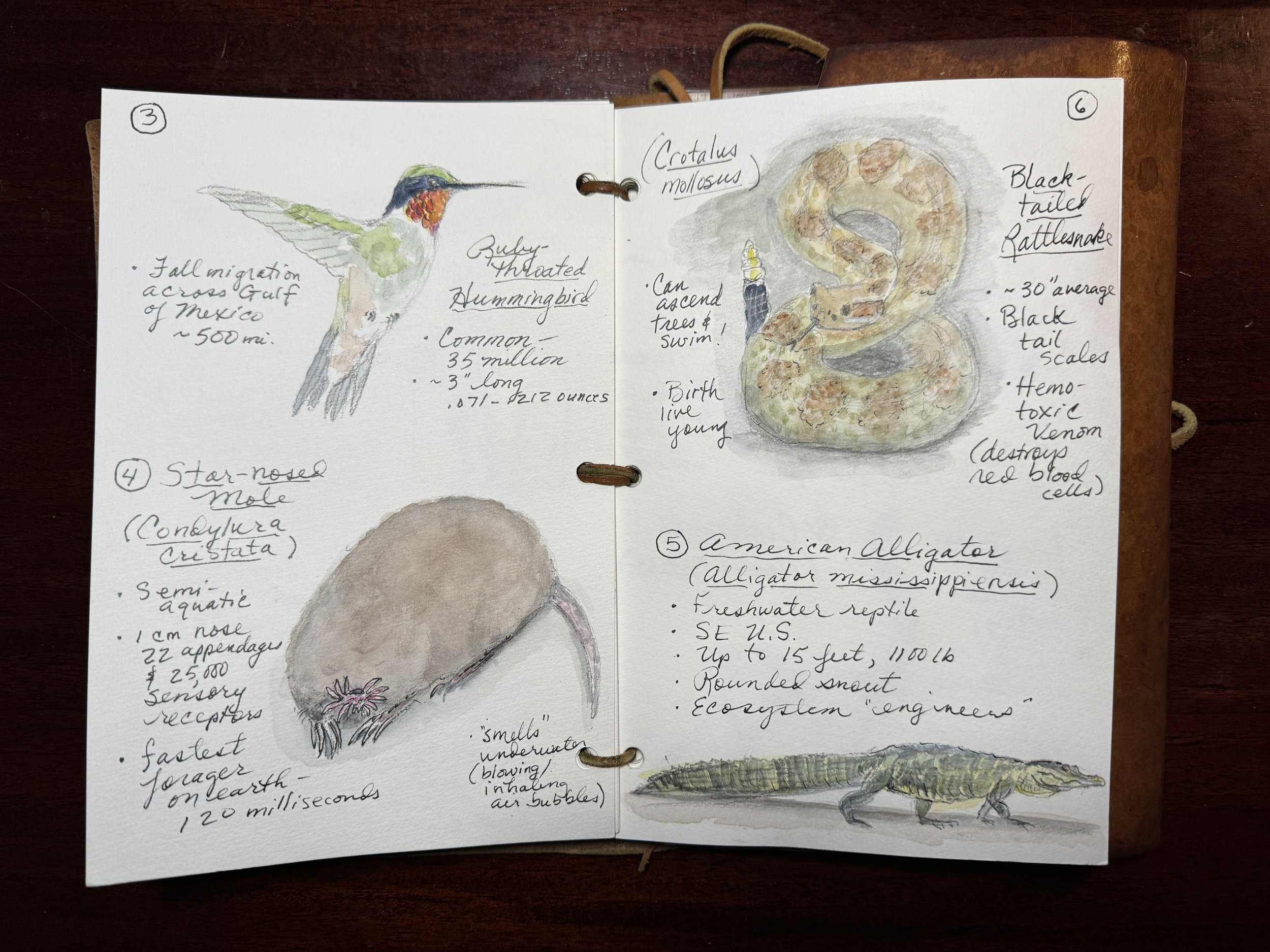
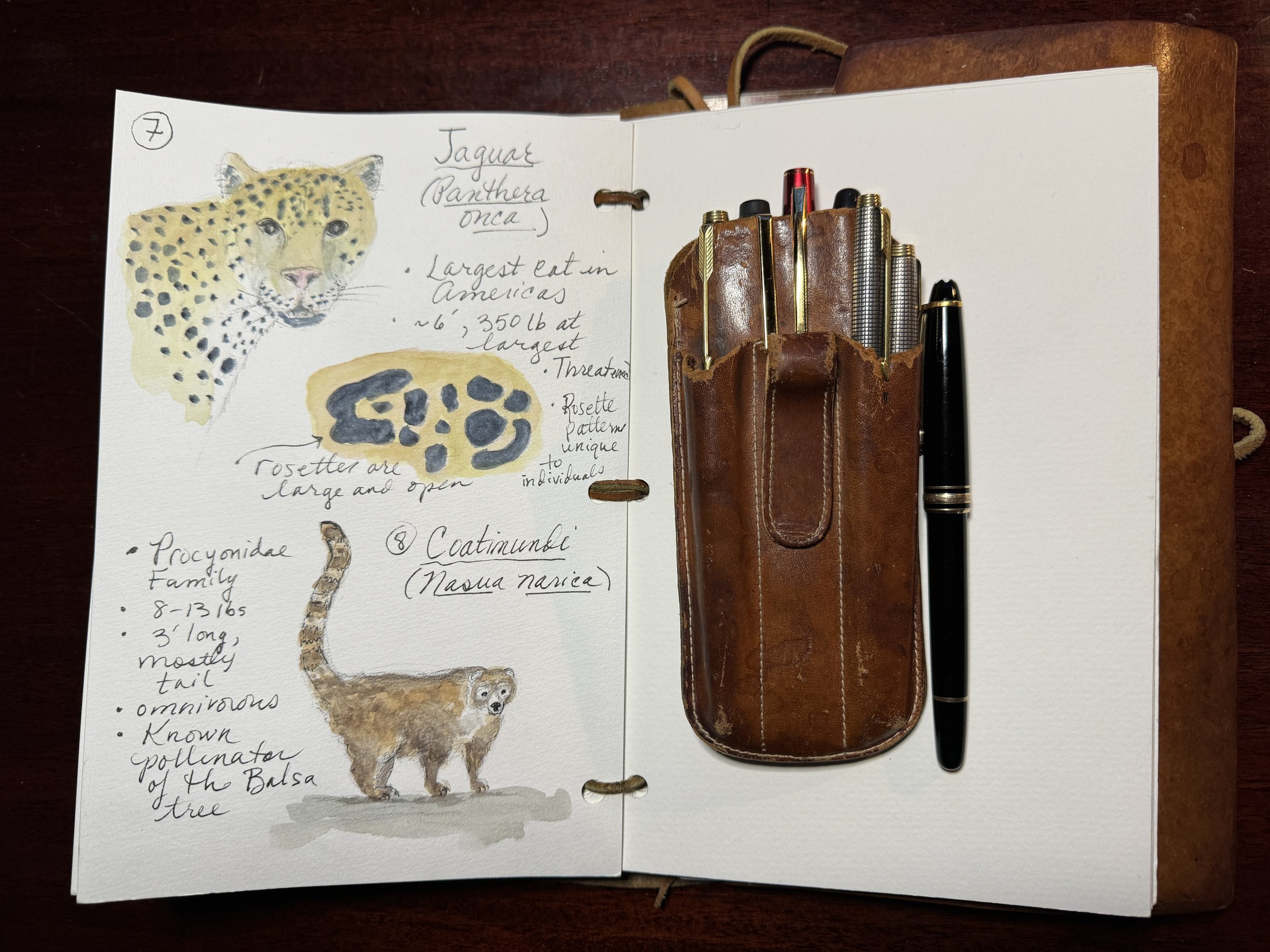
ATTENDEES’ Pages from the Workshop
Please post your pages on our Field Arts Community Forum! It’s free and easy to register, and private!
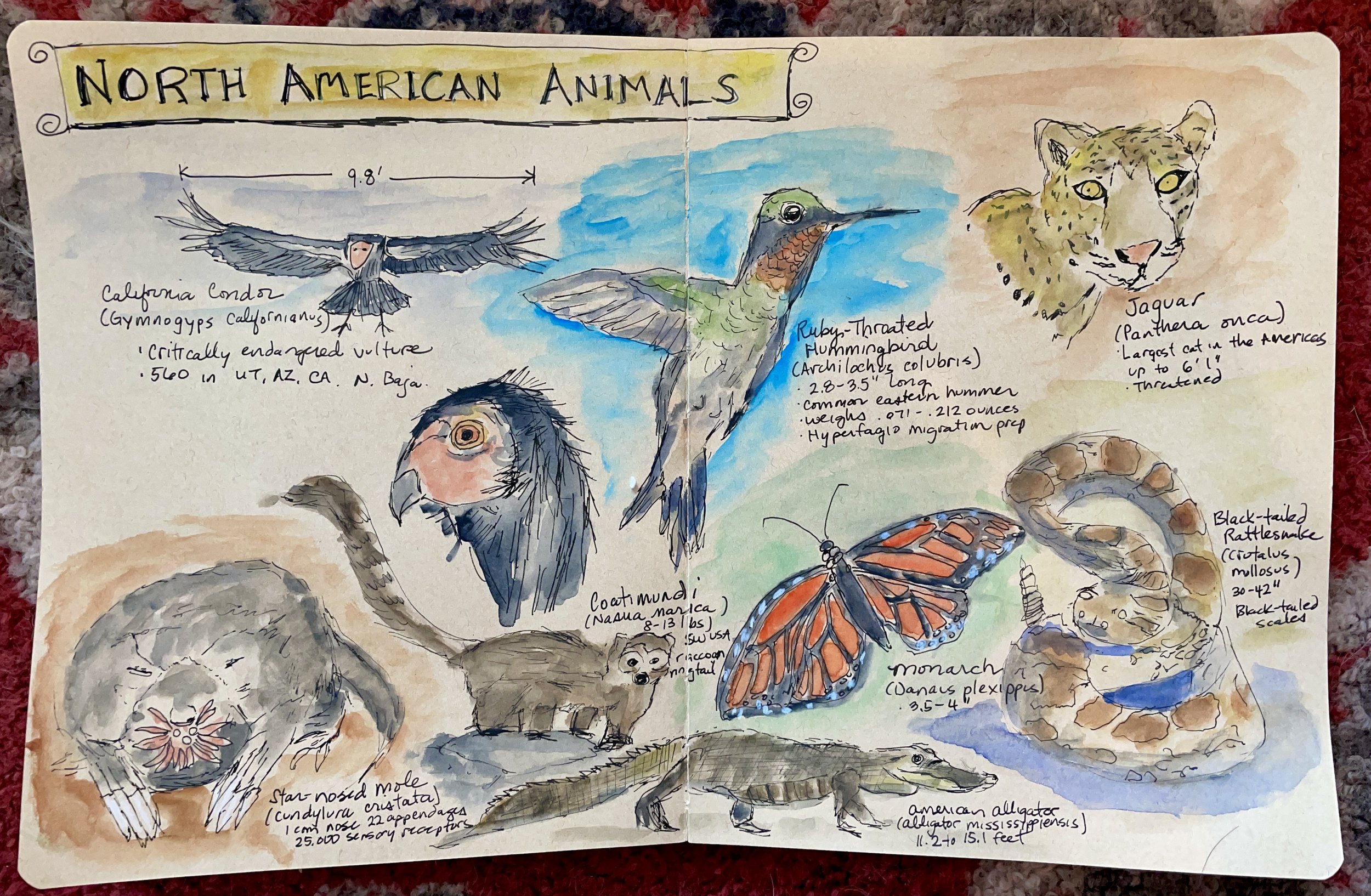
Field Arts Workshop: Around the World in 80 Animals No. 1 (North America Part 1)
Note: you may turn on closed captions by clicking the “CC” button in the video controls. You can also view full screen by clicking the Expand arrows.
Click on images for larger view.
Based on my series Around the World in 80 Trees (in which we spent a year traveling around the globe by region and sketching interesting, weird, iconic, or beautiful trees and tree-like plants), this is a new series based on animals—we’ll travel the world and learn as much natural history as we can, plus master the art of quickly sketching birds, mammals, monotremes, and more!
No. 1: North America, Part 1, the North
What you’ll need: a multi-media sketchbook or an accordion style booklet (see below), pen and / or pencil for our base drawings, and then watercolor or colored pencil to quickly bring them to life.
TIP: I used a strip of heavy watercolor paper folded into four squares to create an “accordion” booklet to record my trees (8 total, 4 on each side). For animals I recommend larger squares, at least 5” if you choose an accordion.
Prepwork: Create a map of the world so you can sketch location points for each species (North America, Pacific, Australia Europe).
Length: 2 hours
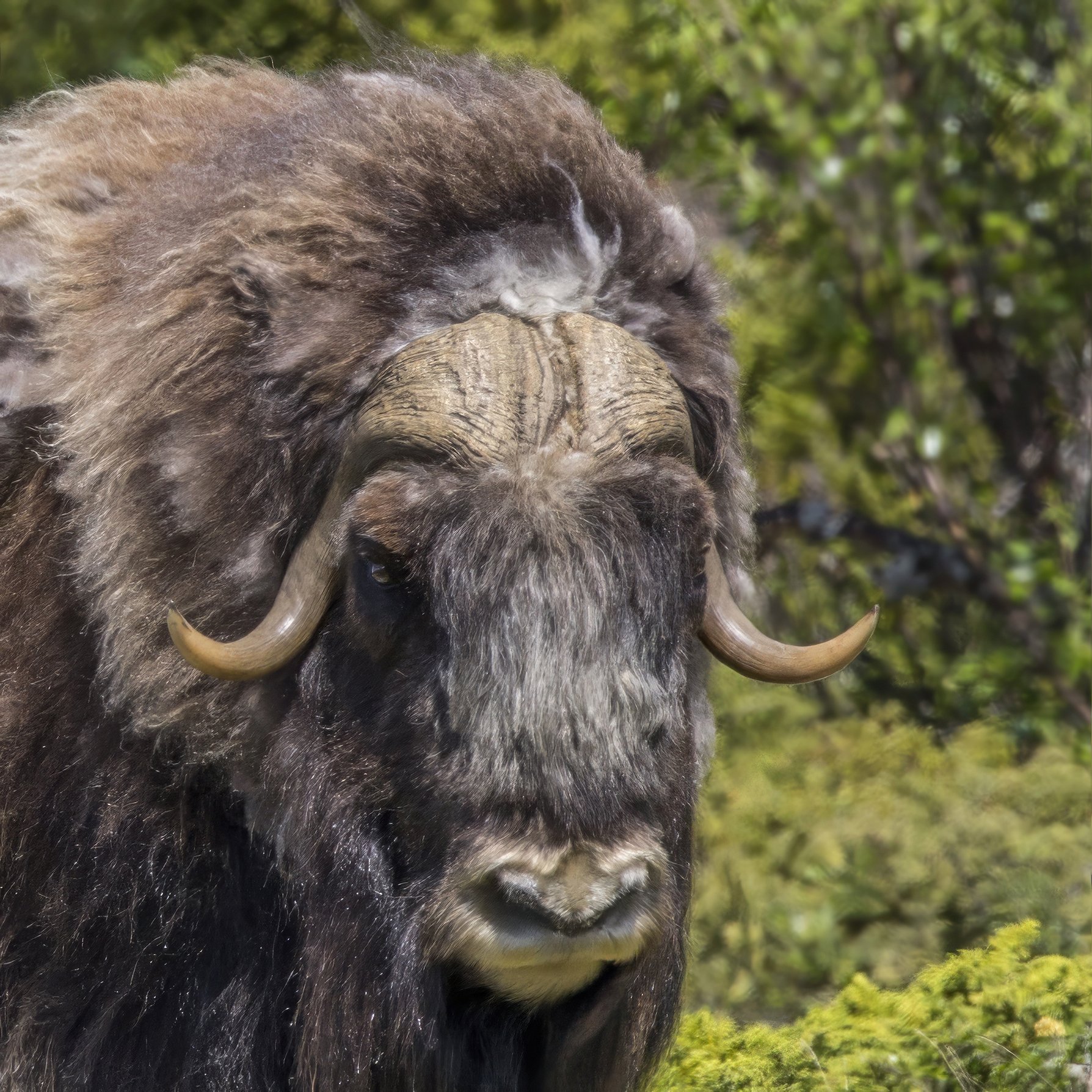
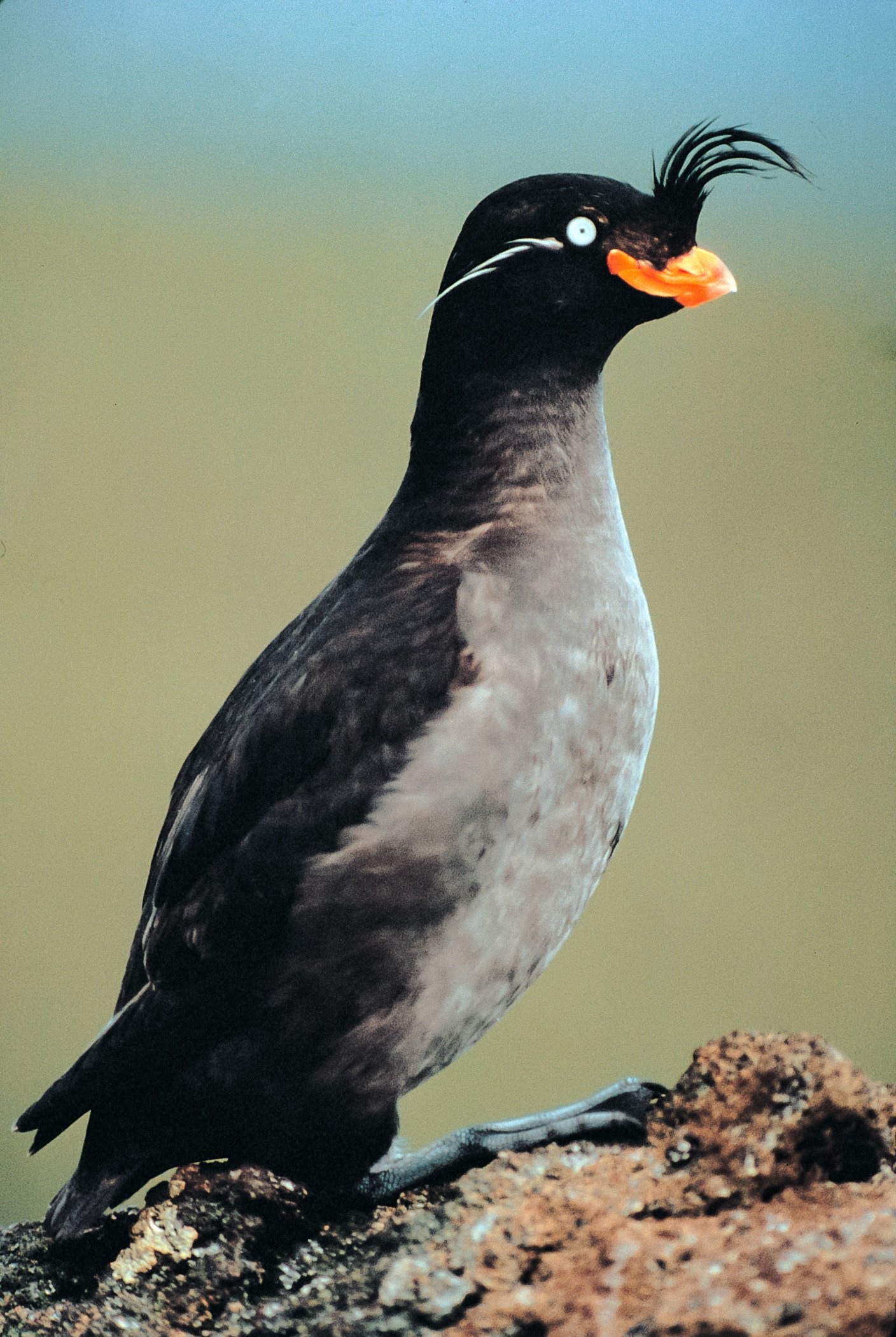
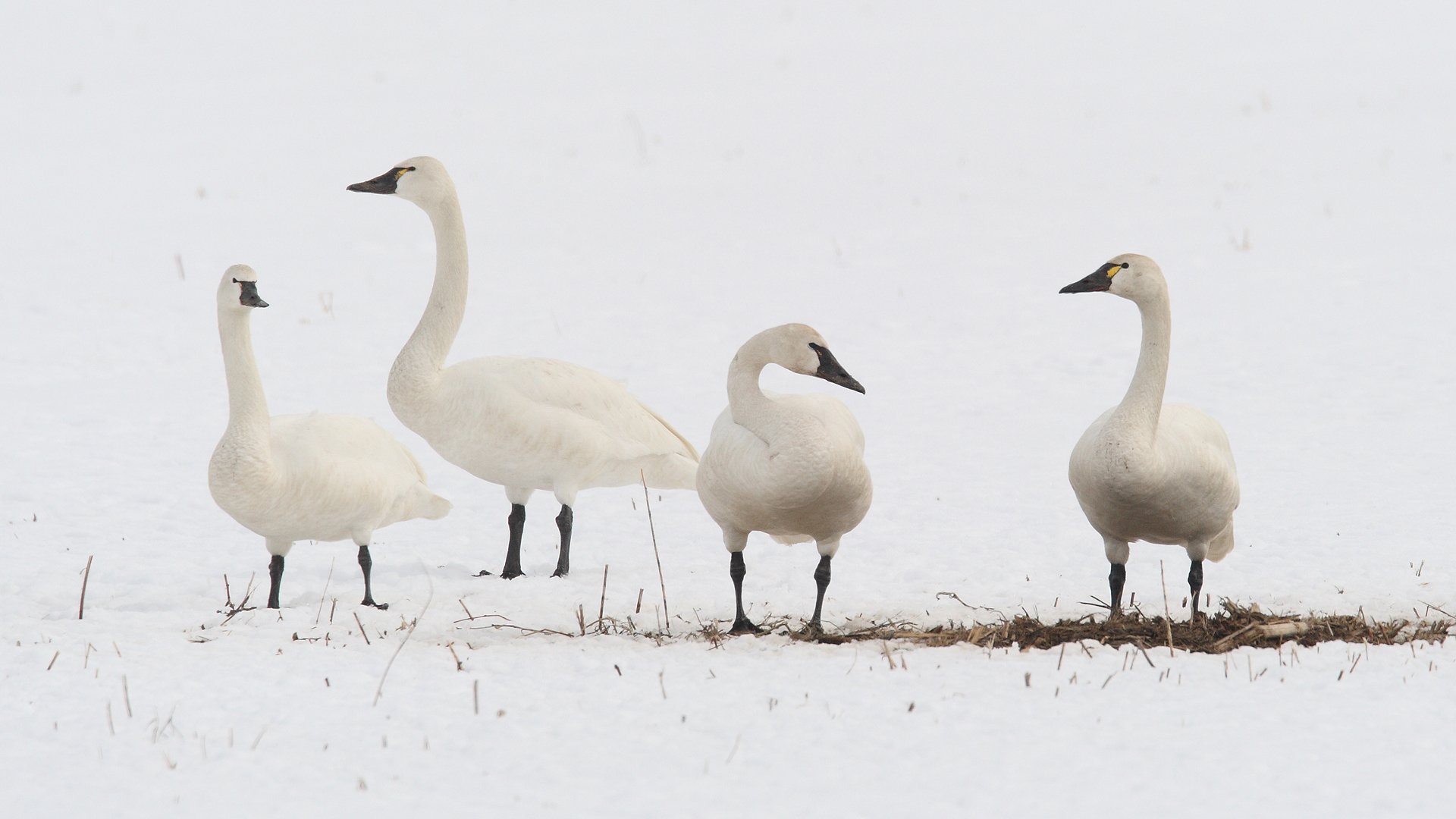
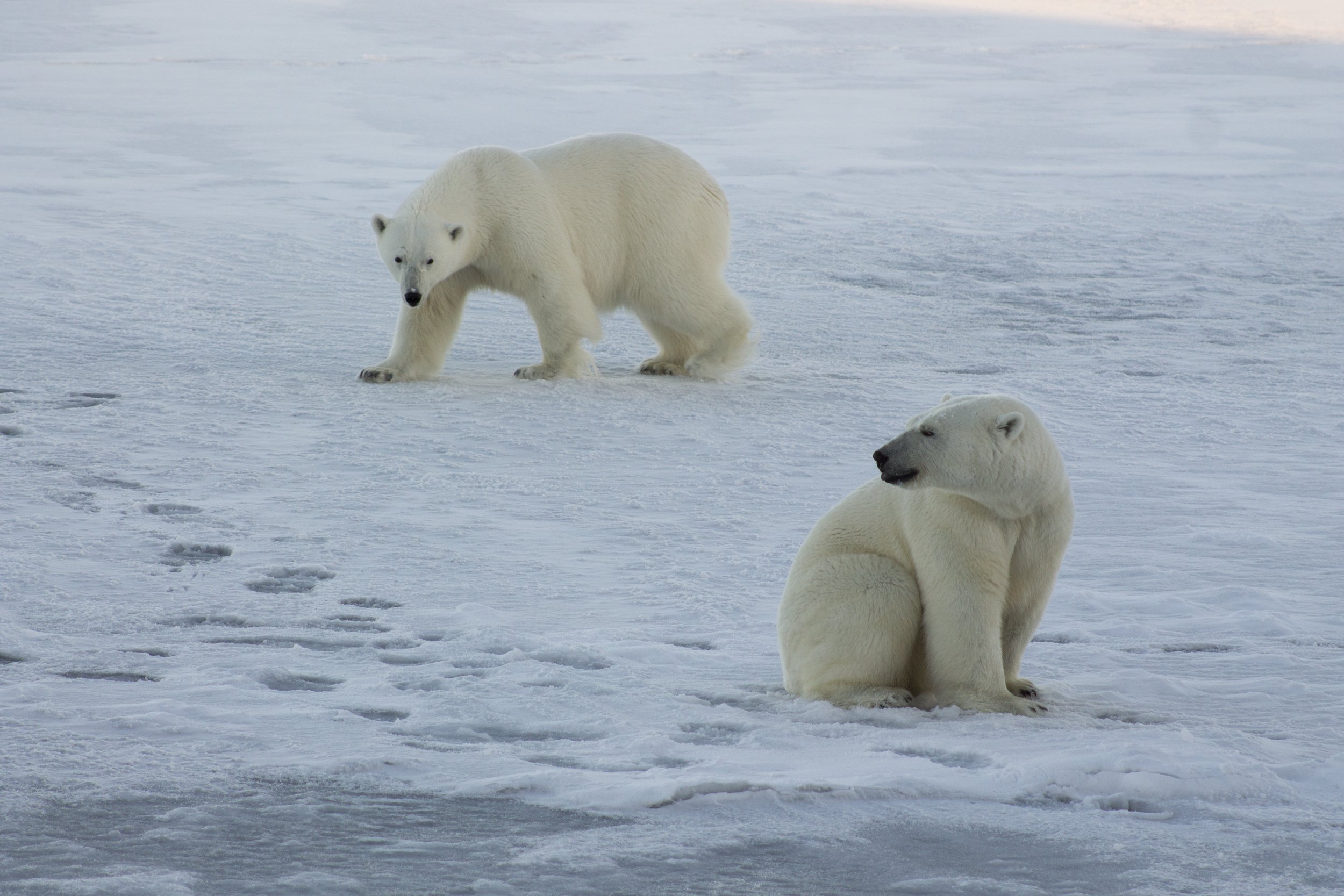
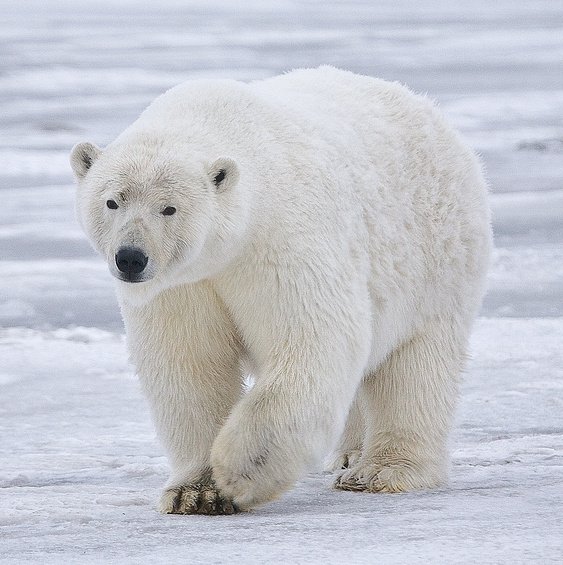
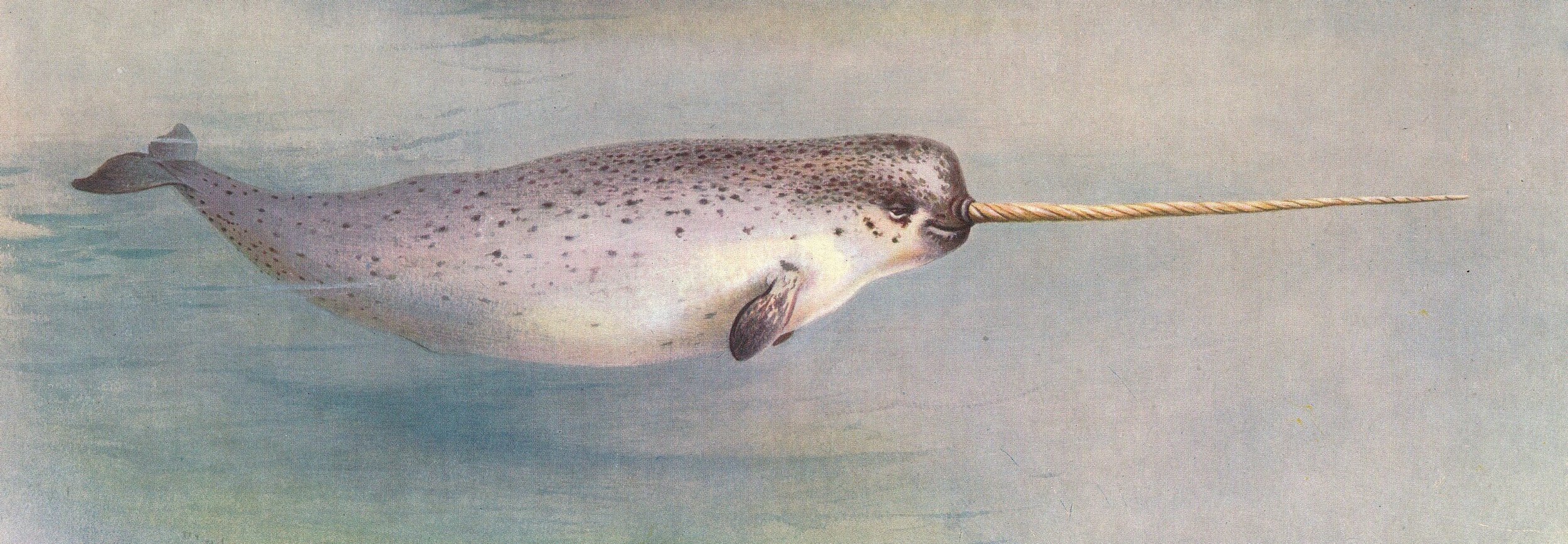
Downloads and Resources
Colors and brush I use:
I favor a simple primary “triad” plus two extra colors: Manganese Blue (“cyan”), Quinacridone Rose (“magenta”), Aureolin Yellow (“yellow”), and Burnt Sienna and Indanthrone Blue, all Daniel Smith.
I use an Isabey Squirrel Mop Travel Brush.
ROSEANN’S FINISHED PAGES—I didn’t do a world map this time! I will next episode
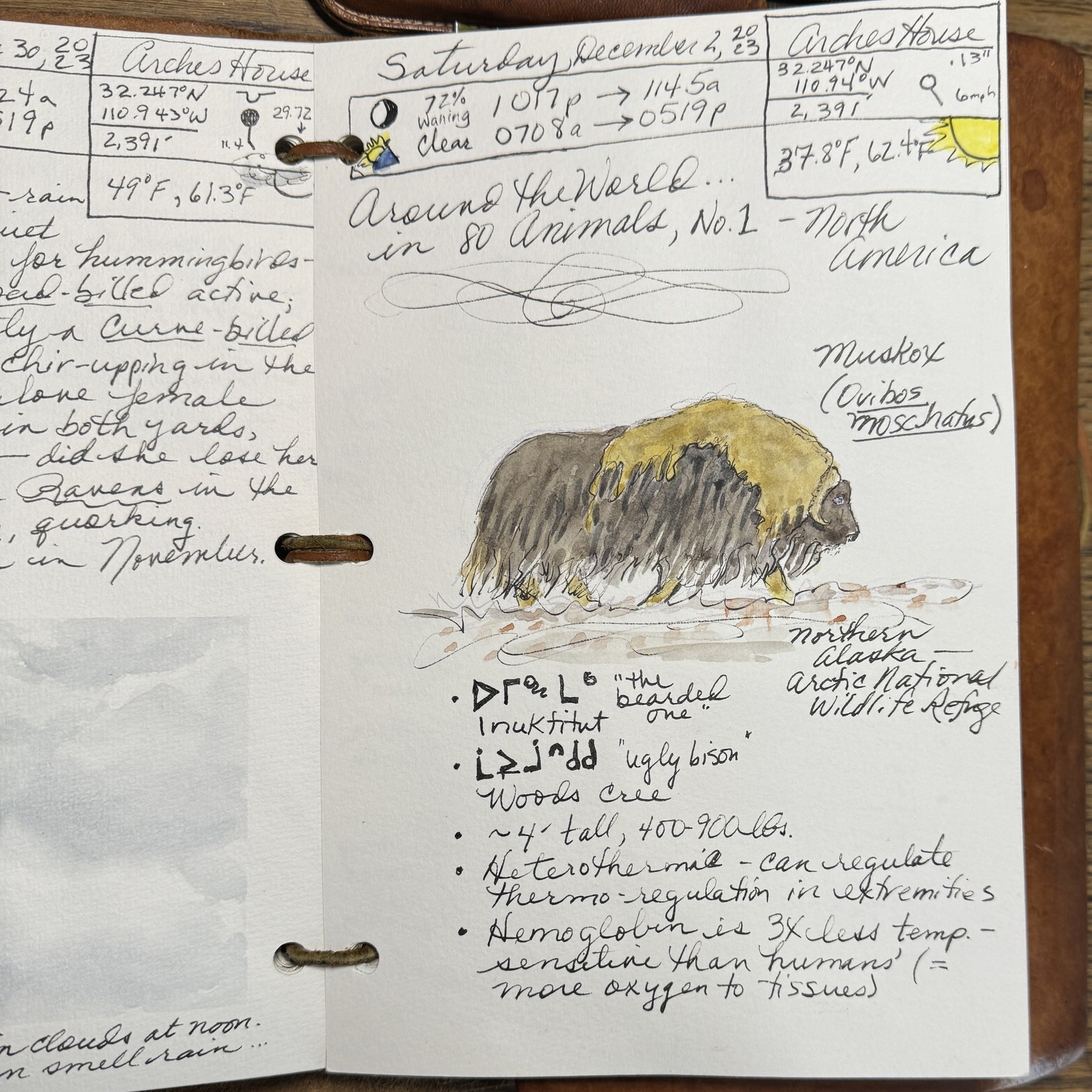
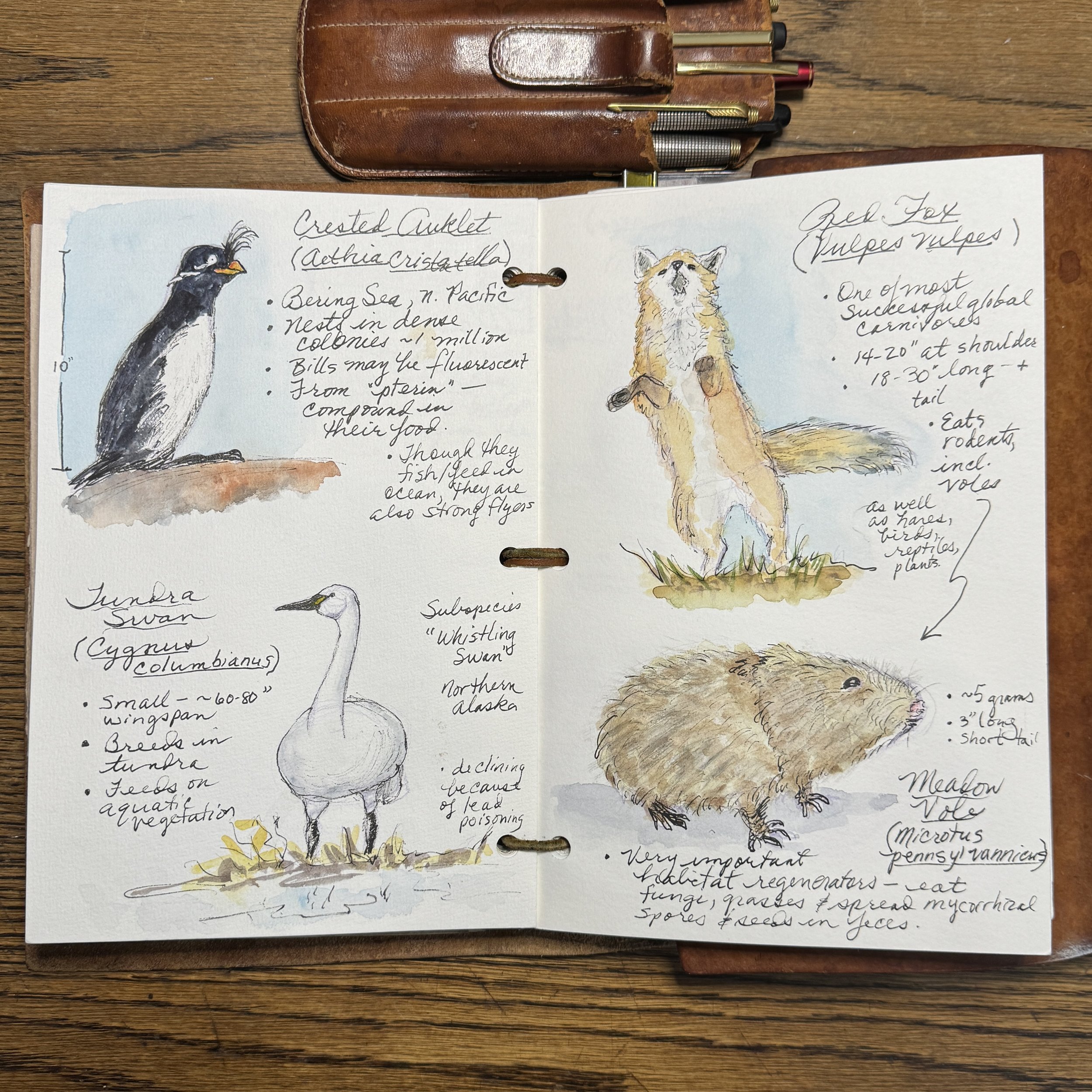
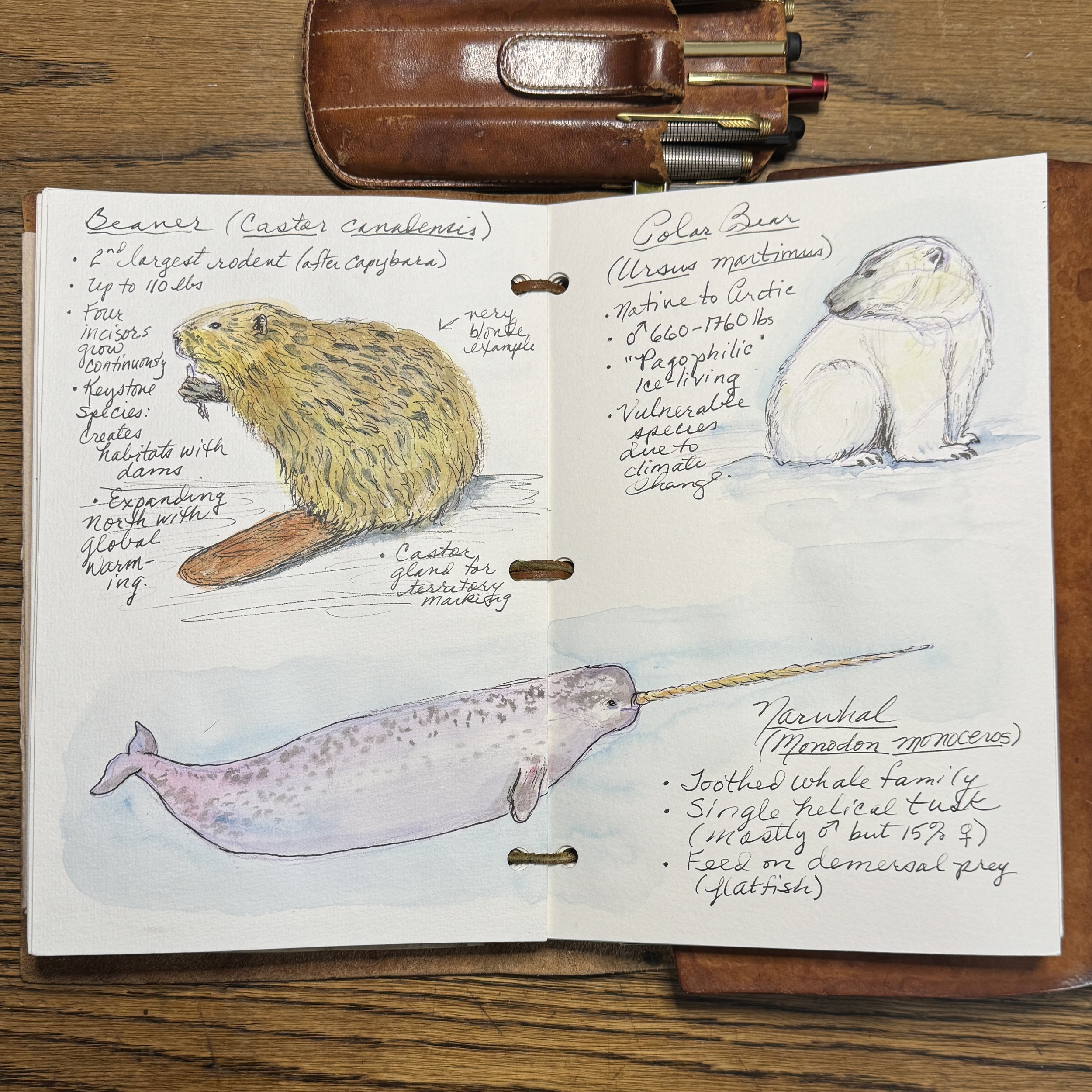
ATTENDEES’ Pages from the Workshop
Please post your pages on our Field Arts Community Forum! It’s free and easy to register, and private!
Field Arts Workshop: Around the World in 80 Trees No. 10 (Final Episode!)
Note: you may turn on closed captions by clicking the “CC” button in the video controls. You can also view full screen by clicking the Expand arrows.
Inspired by Jonathan Drori’s wonderful books Around the World in 80 Trees and Around the World Plants, we’re going to travel around the globe by region and sketch interesting, weird, iconic, or beautiful trees and tree-like plants.
Part 10: Viewer Favorites
What you’ll need: a multi-media sketchbook or an accordion style booklet (see below), pen and / or pencil for our base drawings, and then watercolor or colored pencil to quickly bring them to life.
TIP: I used a strip of heavy watercolor paper folded into four squares to create an “accordion” booklet to record my trees (8 total, 4 on each side).
Prepwork: Create a map of the world so you can sketch location points for each species (North America, Pacific, Australia Europe).
Length: 2 hours
Downloads and Resources
Books and References:
Plants of the World, hosted by Kew Royal Botanical Gardens, is an amazing resource. The hardbound book of the same name is a treasure, and I use it extensively in my research for this series.
Colors and brush I use:
I favor a simple primary “triad” plus two extra colors: Manganese Blue (“cyan”), Quinacridone Rose (“magenta”), Aureolin Yellow (“yellow”), and Burnt Sienna and Indanthrone Blue, all Daniel Smith.
I use an Isabey Squirrel Mop Travel Brush.
ROSEANN’S FINISHED ACCORDION PAGE
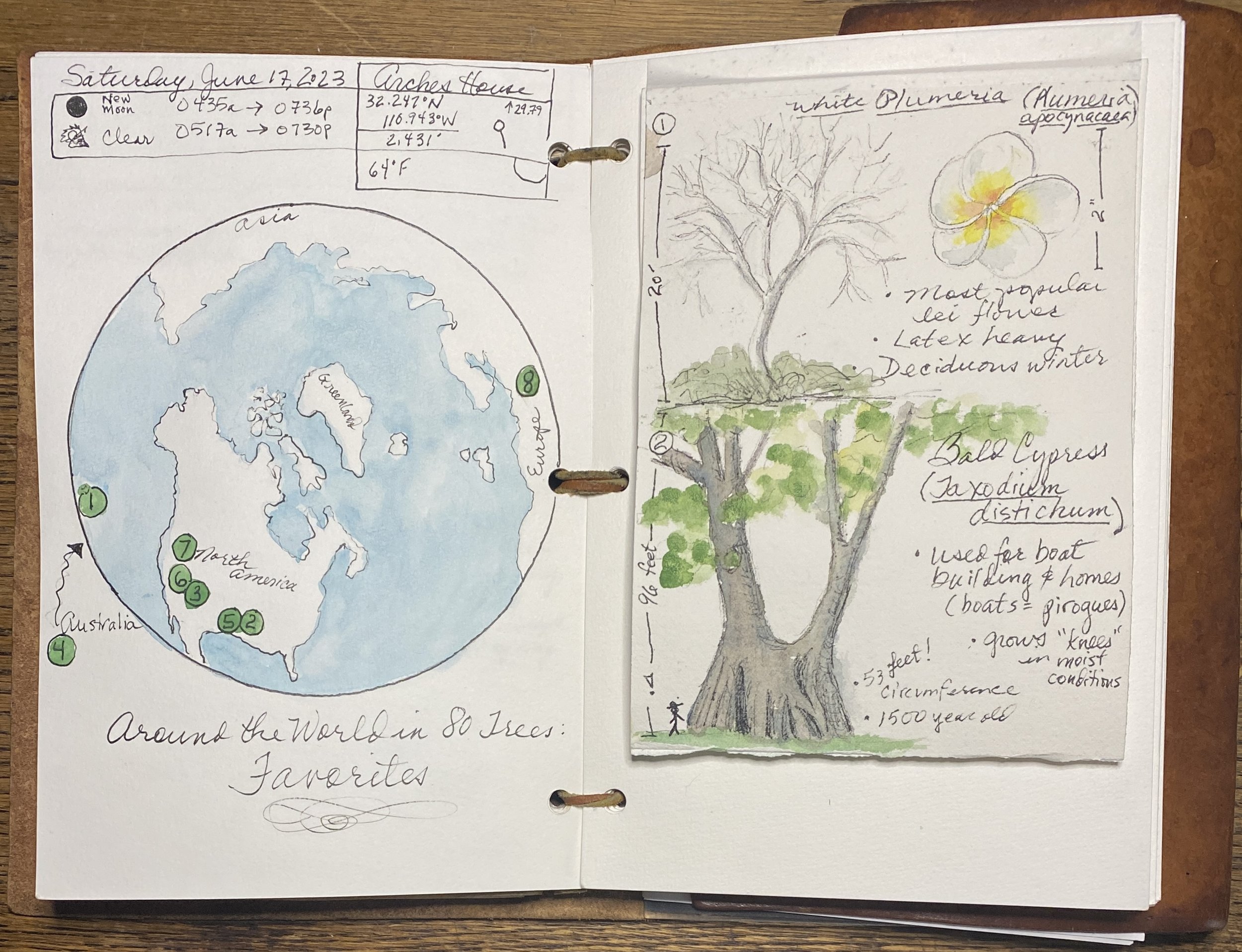
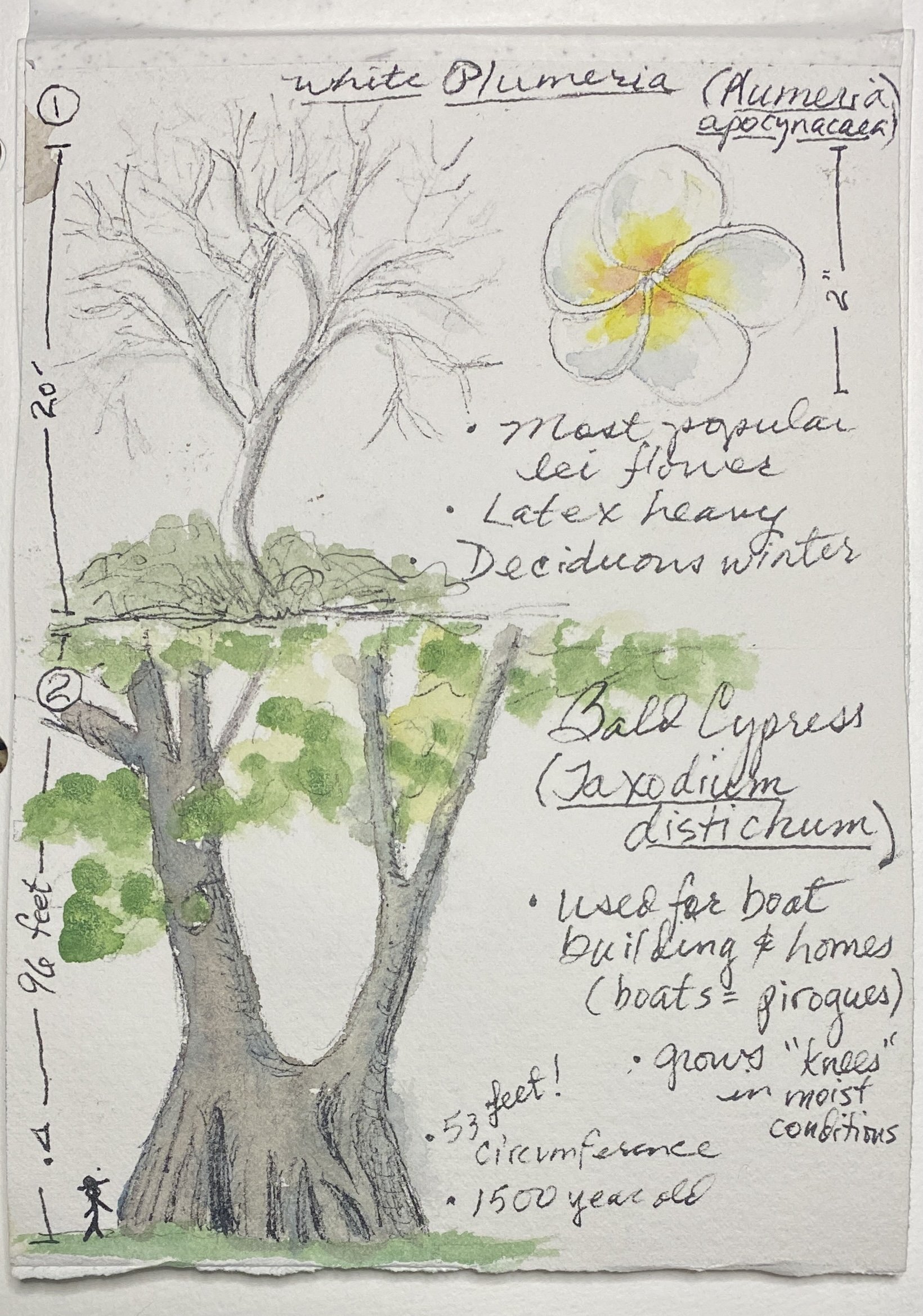
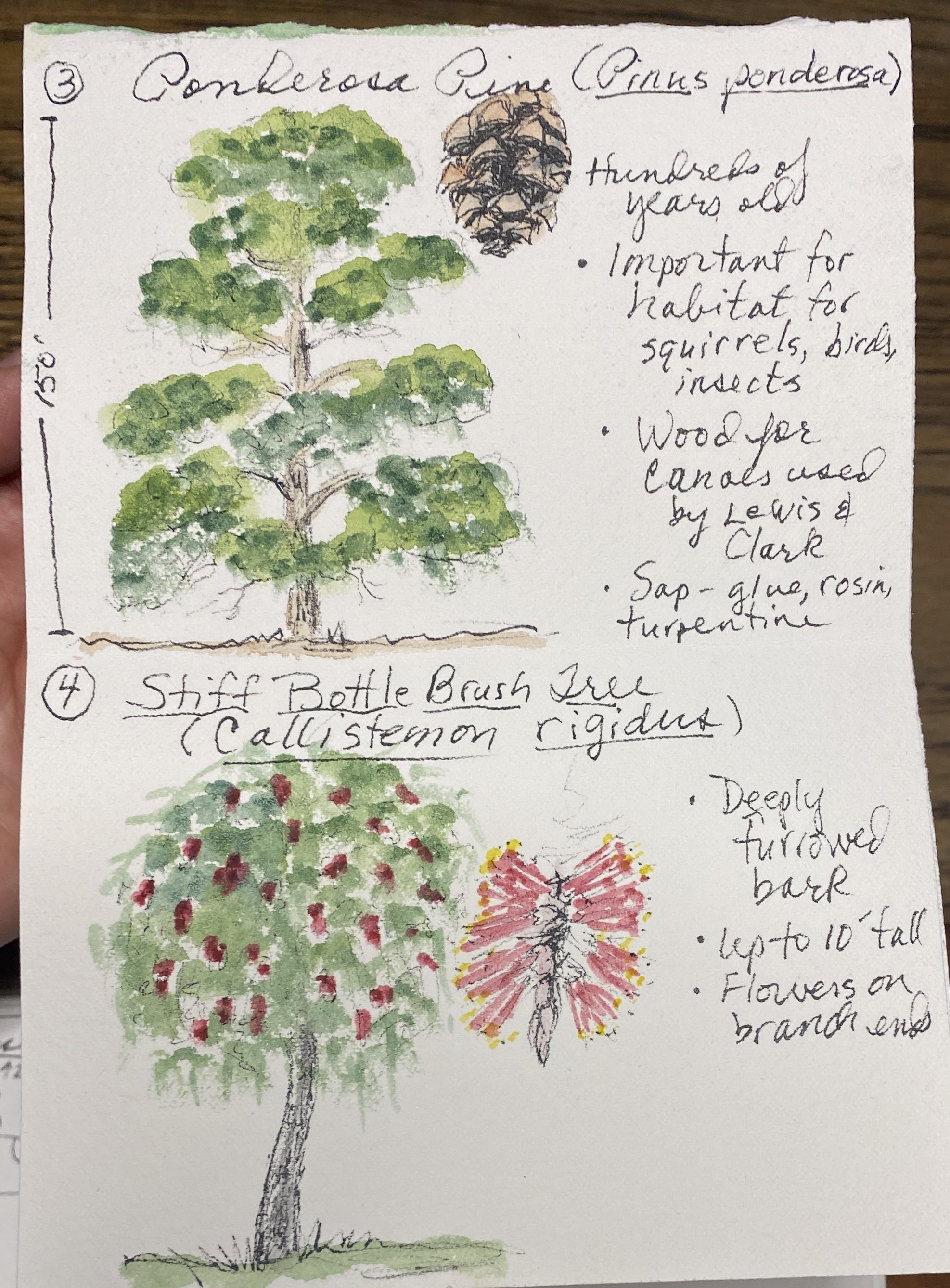
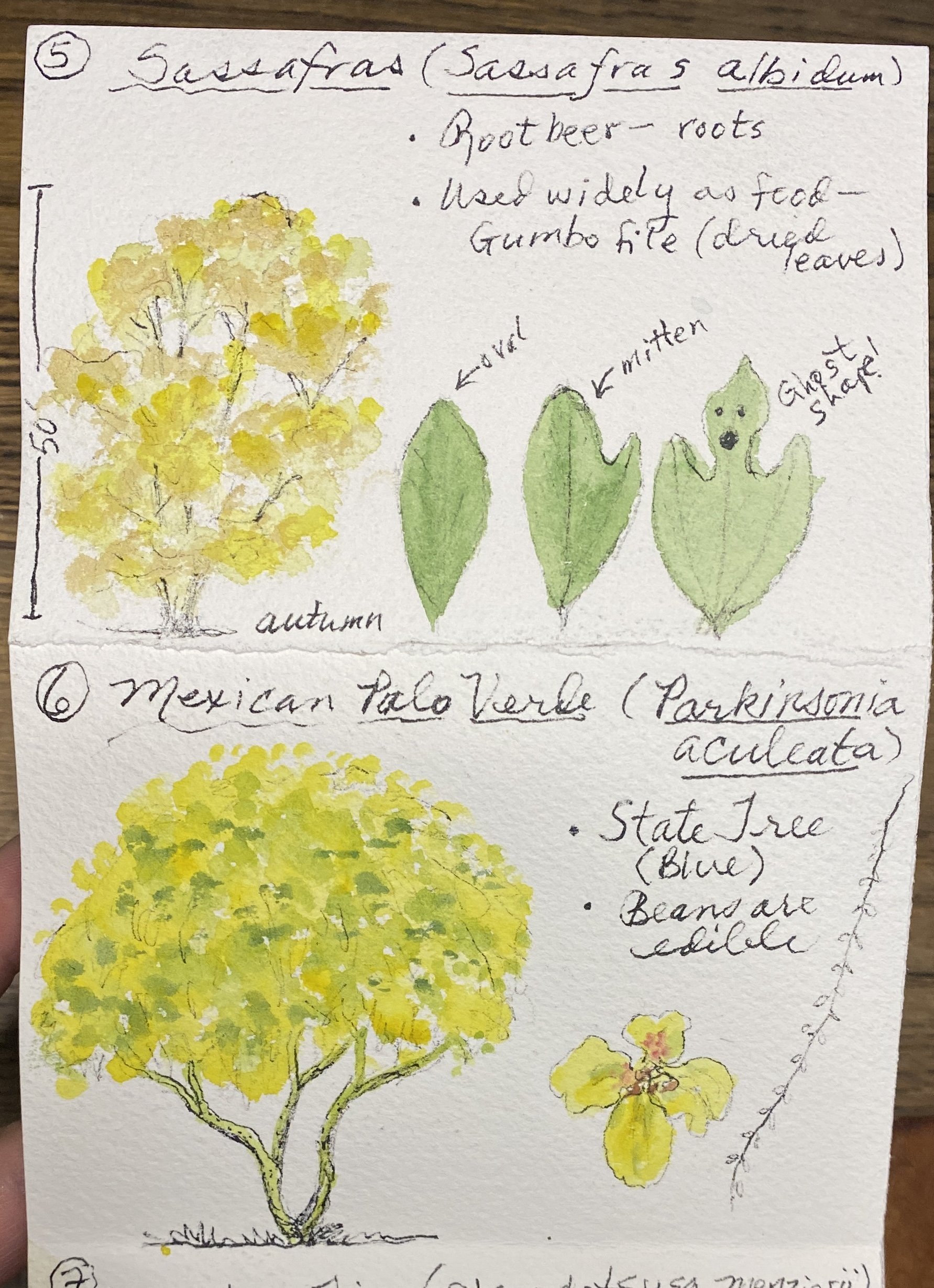
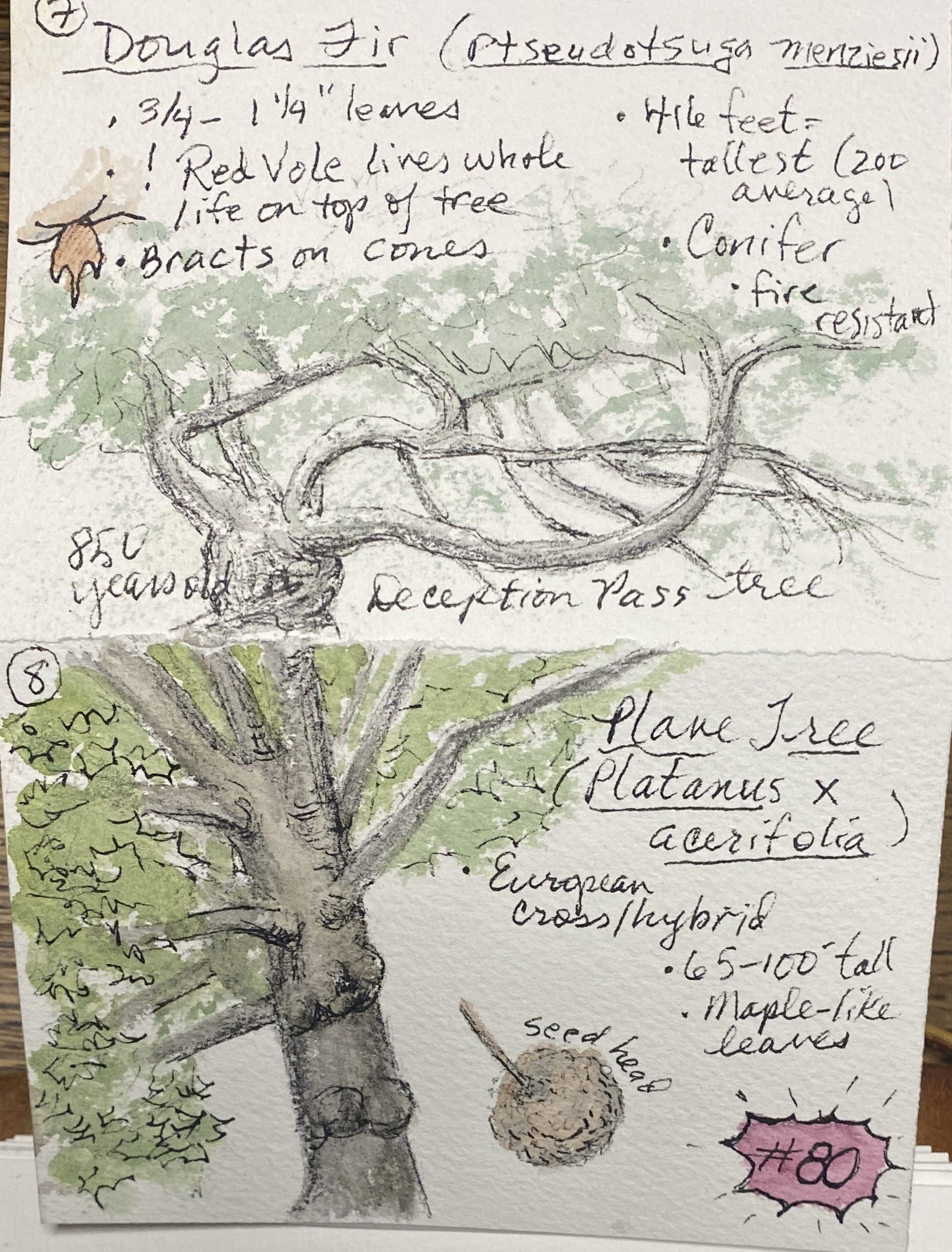
ATTENDEES’ Pages from the Workshop
Please post your pages on our Field Arts Community Forum! It’s free and easy to register, and private!
Field Arts Workshop: Around the World in 80 Trees No. 9 (Oceania)
Note: you may turn on closed captions by clicking the “CC” button in the video controls. You can also view full screen by clicking the Expand arrows.
Inspired by Jonathan Drori’s wonderful books Around the World in 80 Trees and Around the World Plants, we’re going to travel around the globe by region and sketch interesting, weird, iconic, or beautiful trees and tree-like plants.
Part 9: Oceania
What you’ll need: a multi-media sketchbook or an accordion style booklet (see below), pen and / or pencil for our base drawings, and then watercolor or colored pencil to quickly bring them to life.
TIP: I used a strip of heavy watercolor paper folded into four squares to create an “accordion” booklet to record my trees (8 total, 4 on each side).
Prepwork: have on hand a simple outline map of Oceana, taking in New Zealand to Rapa Nui, and north to Hawai’i (see resources below) so you can sketch location points for each species.
Length: 2 hours
Click here to view all past workshops!
Register for our Final Workshop No. 10 - Wild Cards—NOTE THE SPECIAL INSTRUCTIONS ON HOW TO SUBMIT YOUR DRAWINGS AND ENTER TO WIN A $50 GIFT CERTIFICATE! >>CLICK HERE<<
Downloads and Resources
Locations of the 8 species for this workshop (these are not the ranges, but the site where the specimen we sketch is located).
Books and References:
Plants of the World, hosted by Kew Royal Botanical Gardens, is an amazing resource. The hardbound book of the same name is a treasure, and I use it extensively in my research for this series.
Colors and brush I use:
I favor a simple primary “triad” plus two extra colors: Manganese Blue (“cyan”), Quinacridone Rose (“magenta”), Aureolin Yellow (“yellow”), and Burnt Sienna and Indanthrone Blue, all Daniel Smith.
I use an Isabey Squirrel Mop Travel Brush.
ROSEANN’S FINISHED ACCORDION PAGE
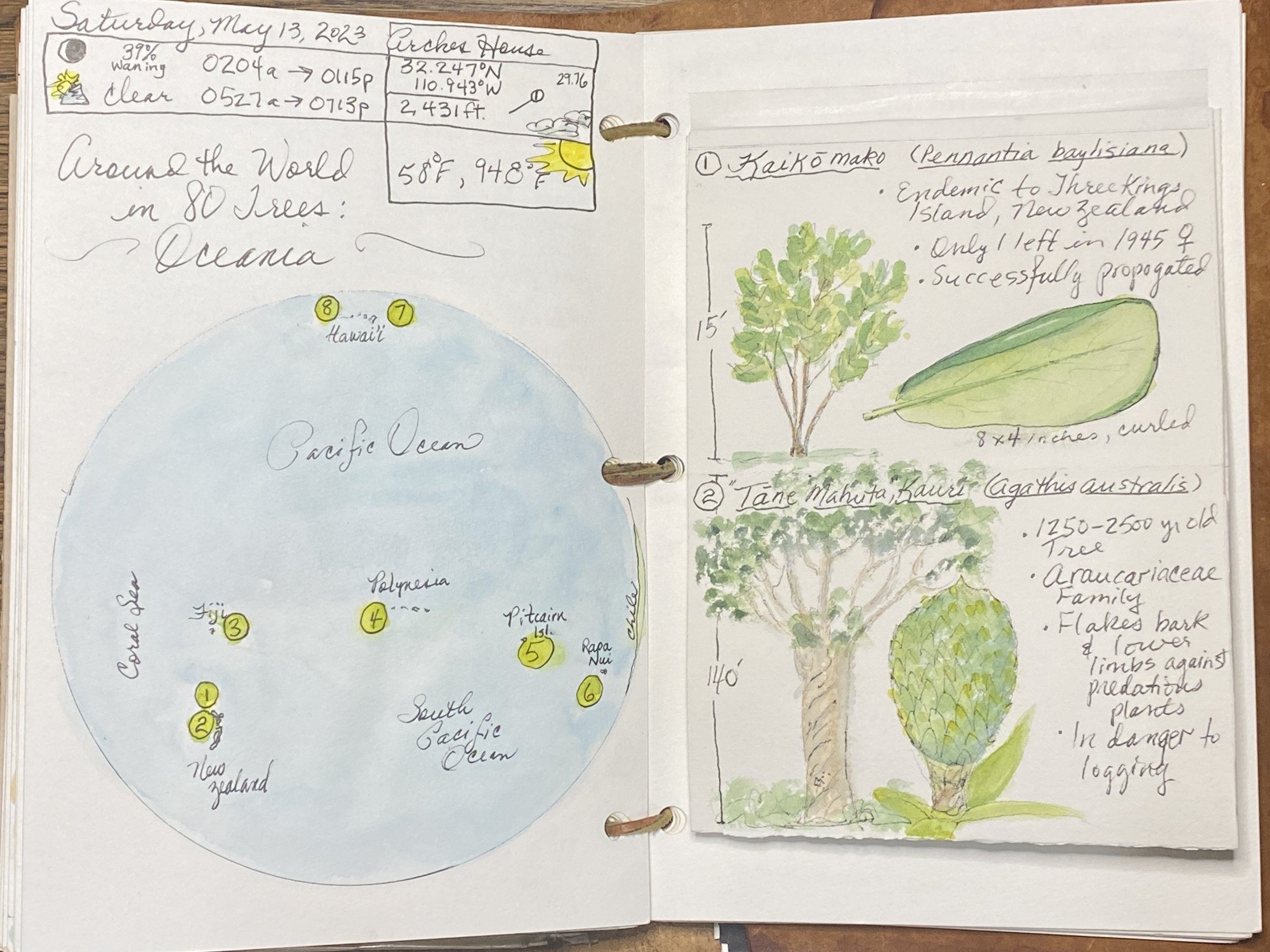
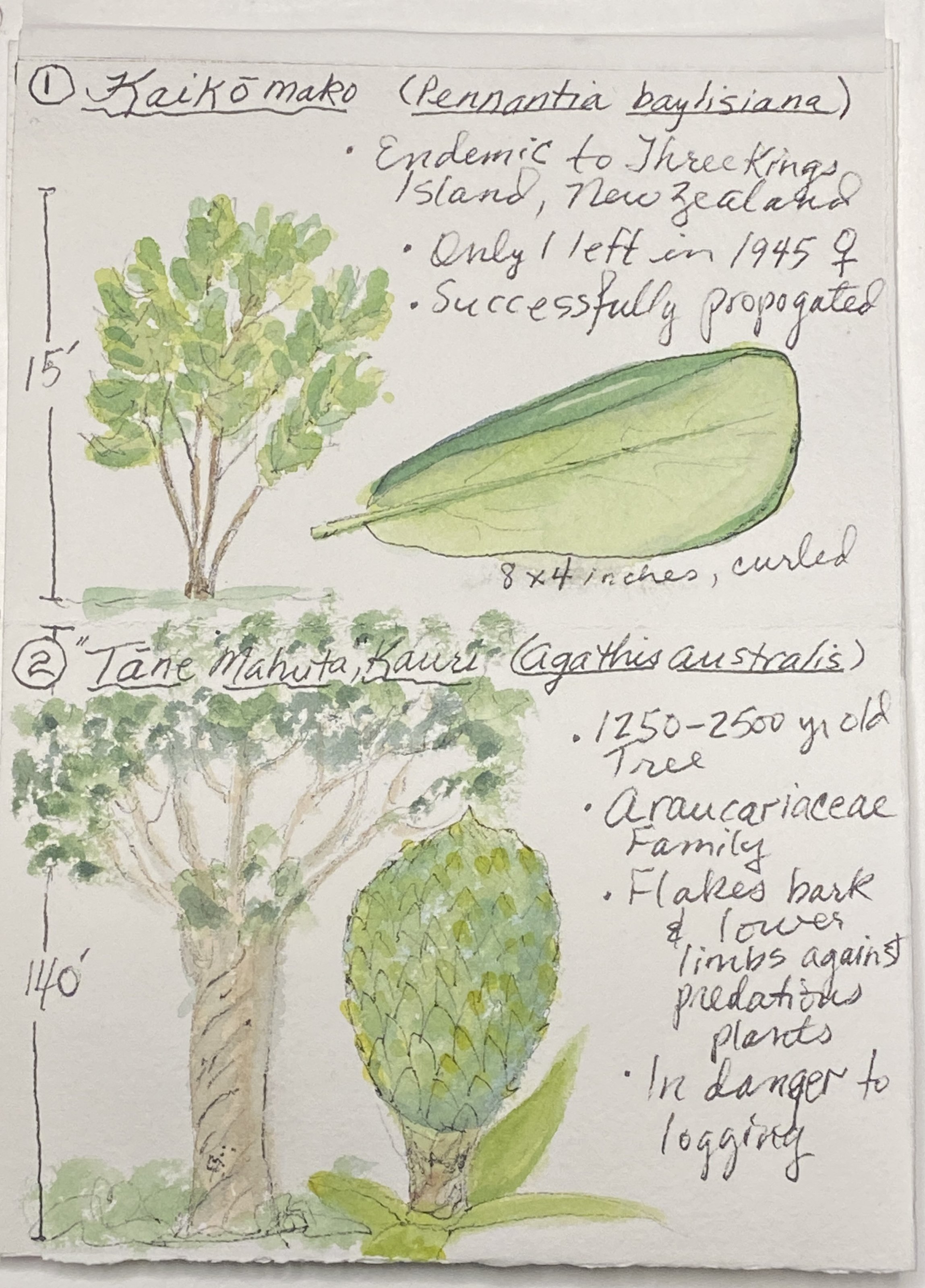
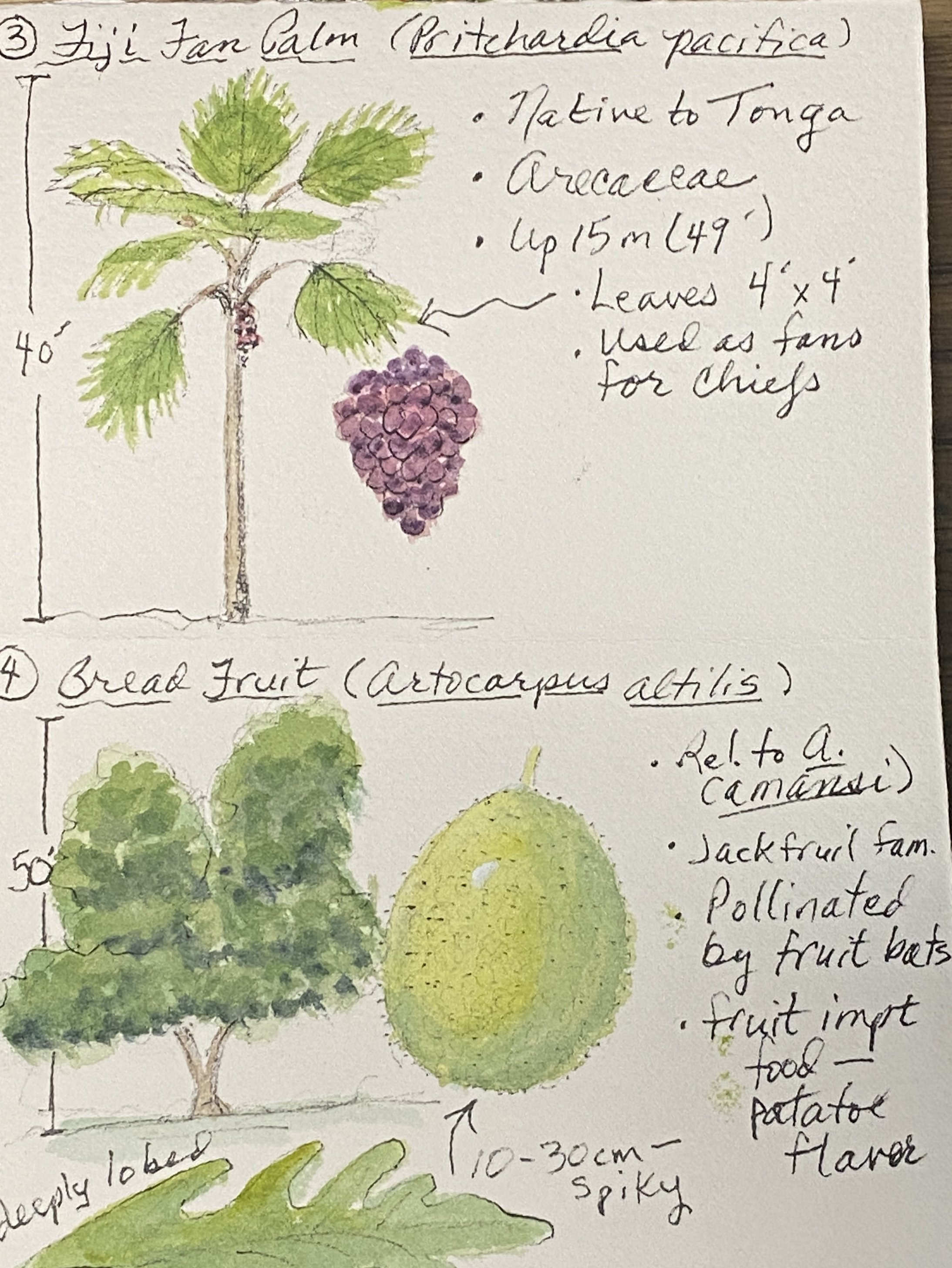
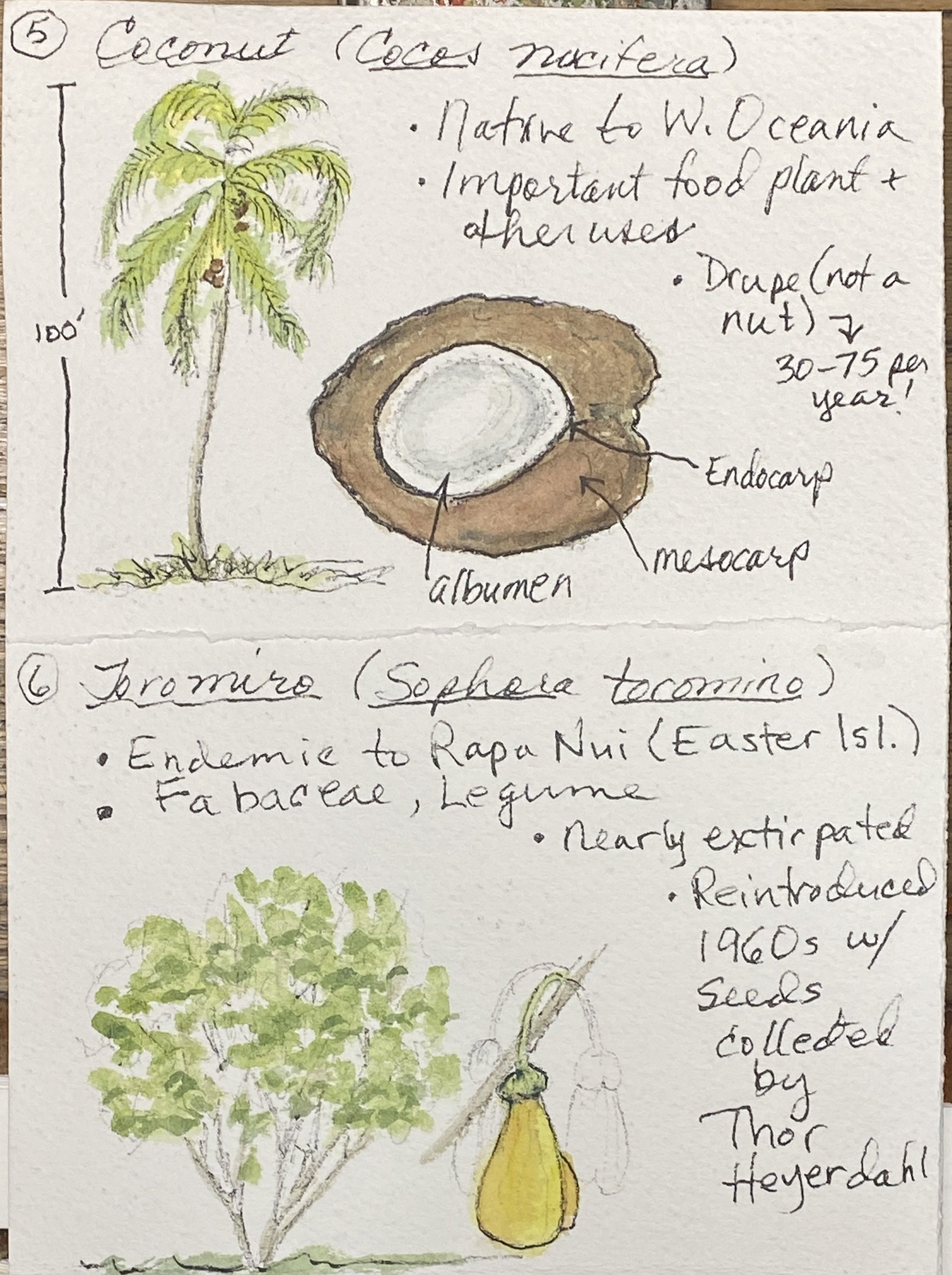
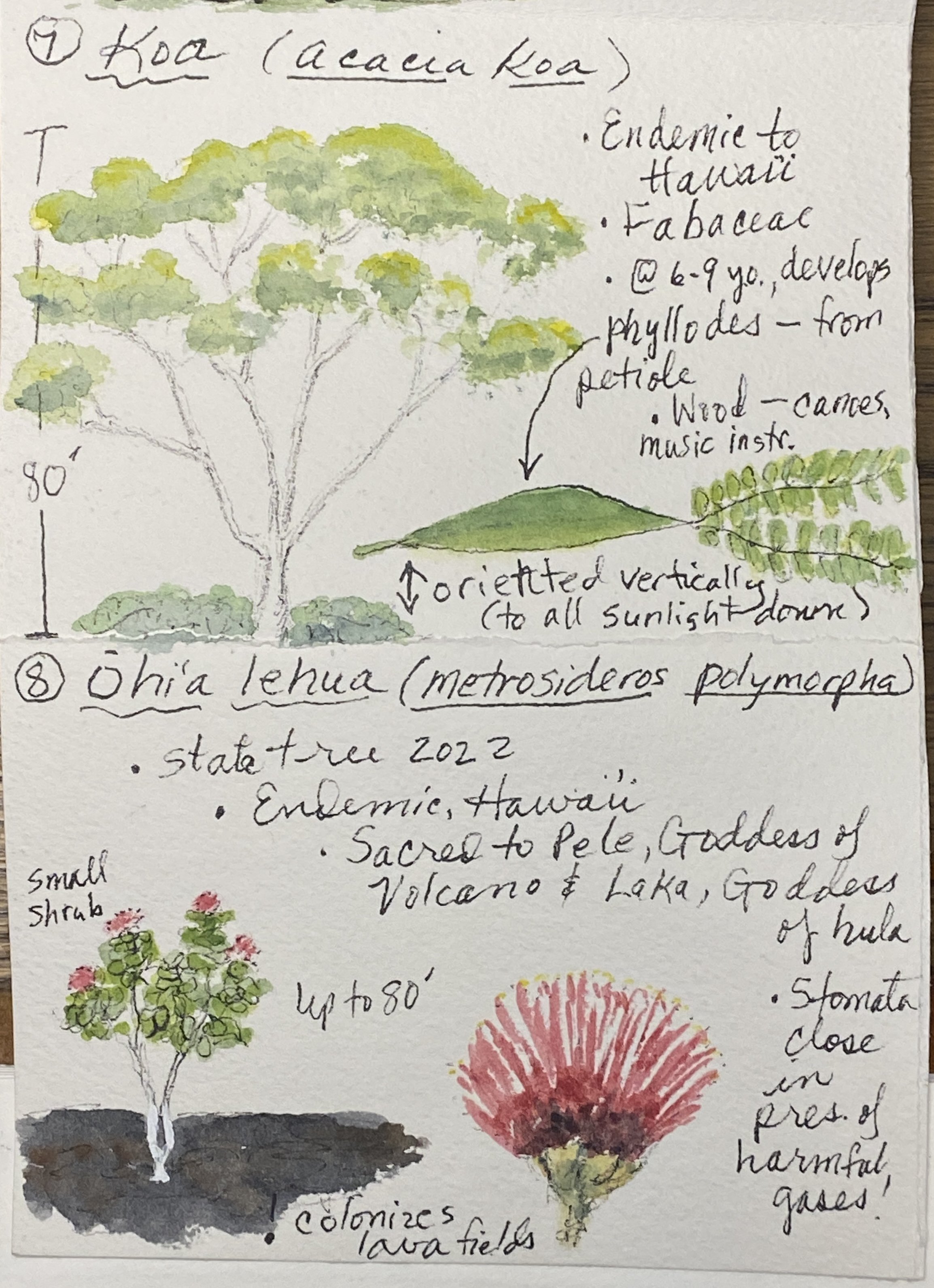
ATTENDEES’ Pages from the Workshop
Please send your pages and I will upload!
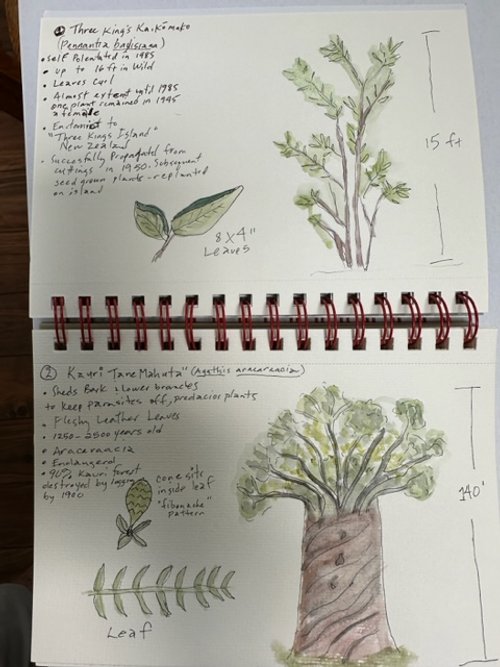
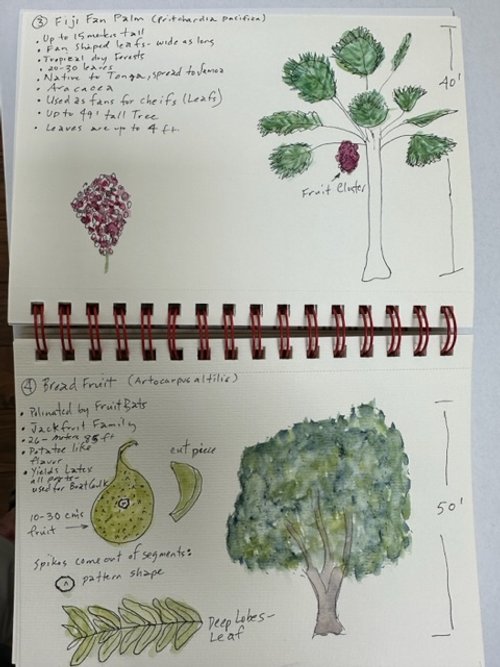
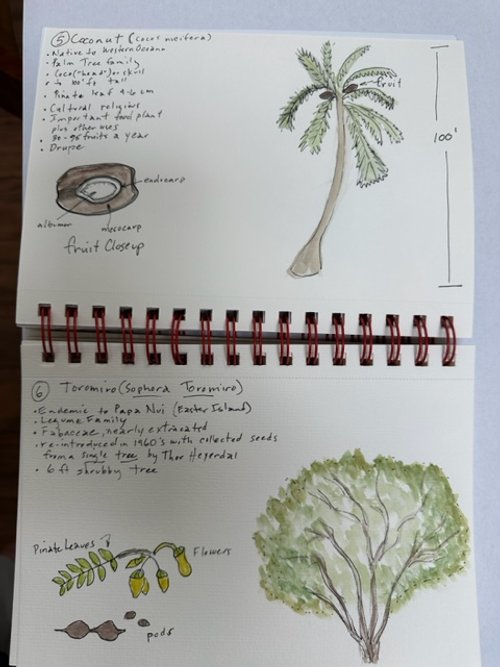
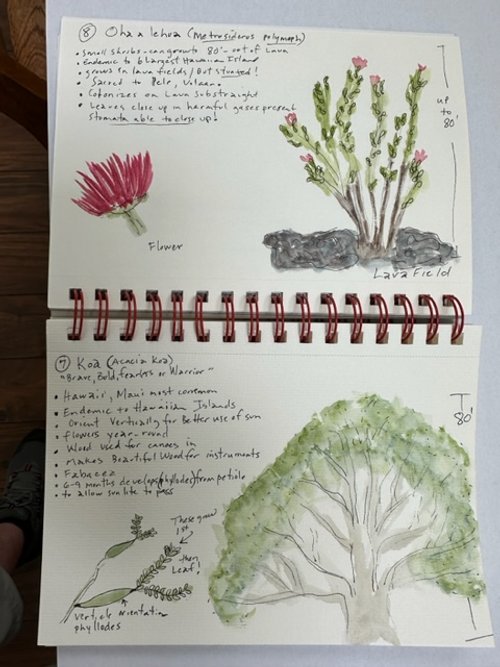






Field Arts Workshop: Around the World in 80 Trees No. 8 (SE Asia)
Note: you may turn on closed captions by clicking the “CC” button in the video controls. You can also view full screen by clicking the Expand arrows.
Inspired by Jonathan Drori’s wonderful books Around the World in 80 Trees and Around the World Plants, we’re going to travel around the globe by region and sketch interesting, weird, iconic, or beautiful trees and tree-like plants.
Part 8: Southeast Asia
What you’ll need: a multi-media sketchbook or an accordion style booklet (see below), pen and / or pencil for our base drawings, and then watercolor or colored pencil to quickly bring them to life.
TIP: I used a strip of heavy watercolor paper folded into four squares to create an “accordion” booklet to record my trees (8 total, 4 on each side).
Prepwork: have on hand a simple outline map of SE Asia (see resources below) so you can sketch location points for each species.
Length: 2 hours
Downloads and Resources
Locations of the 8 species for this workshop (these are not the ranges, but the site where the specimen we sketch is located).
Books and References:
Plants of the World, hosted by Kew Royal Botanical Gardens, is an amazing resource. The hardbound book of the same name is a treasure, and I use it extensively in my research for this series.
Colors and brush I use:
I favor a simple primary “triad” plus two extra colors: Manganese Blue (“cyan”), Quinacridone Rose (“magenta”), Aureolin Yellow (“yellow”), and Burnt Sienna and Indanthrone Blue, all Daniel Smith.
I use an Isabey Squirrel Mop Travel Brush.
ROSEANN’S FINISHED ACCORDION PAGE
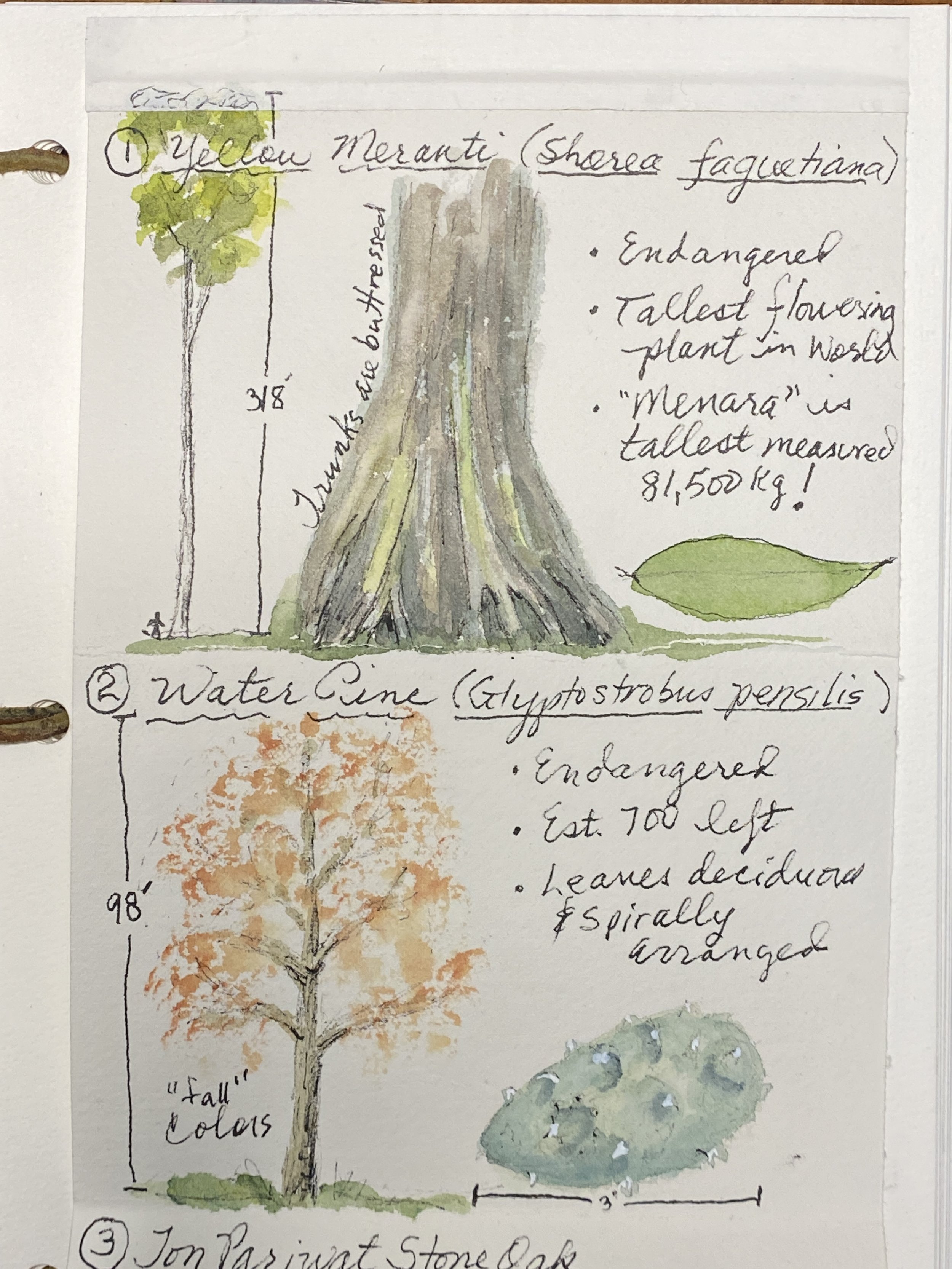
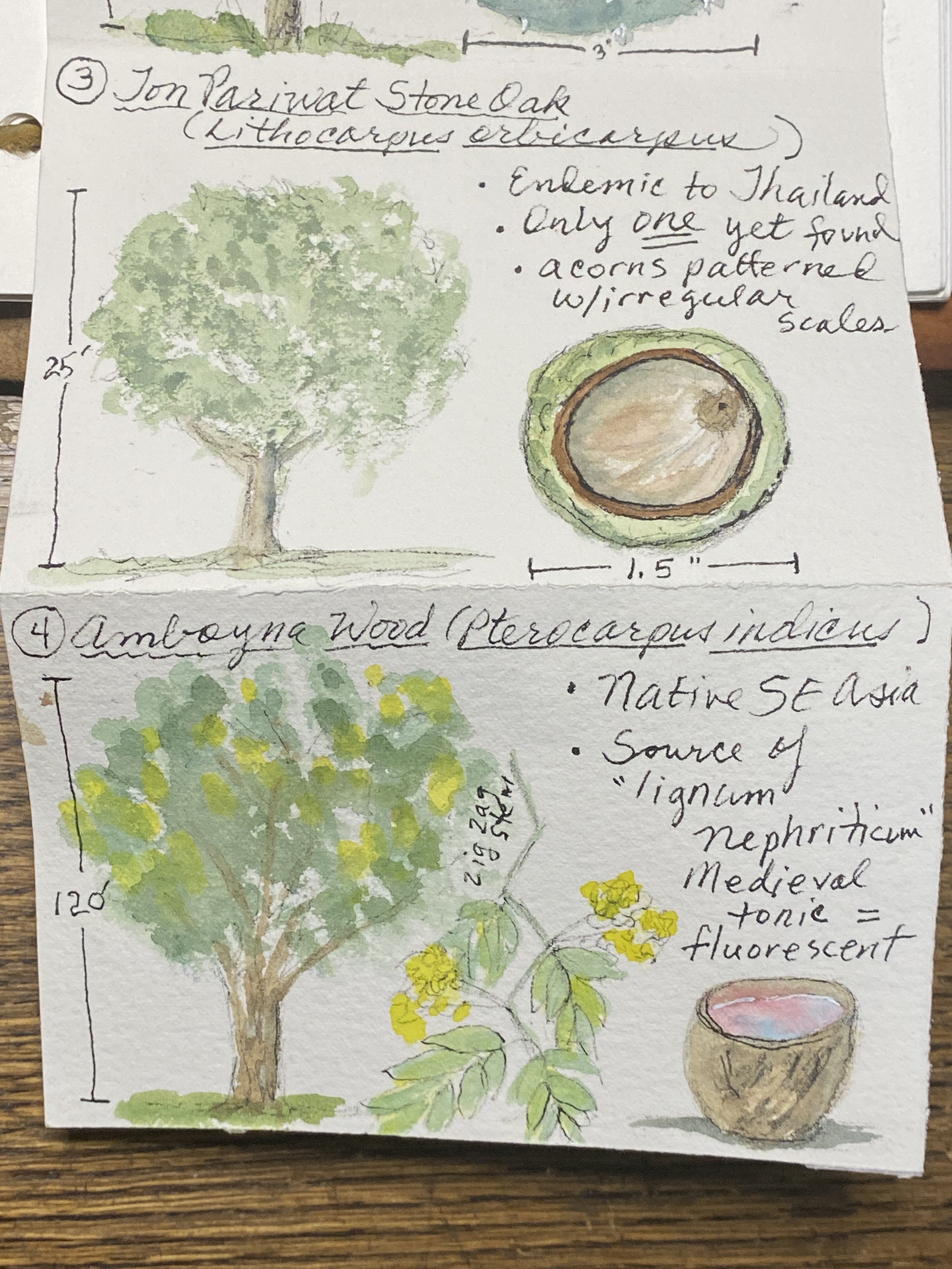

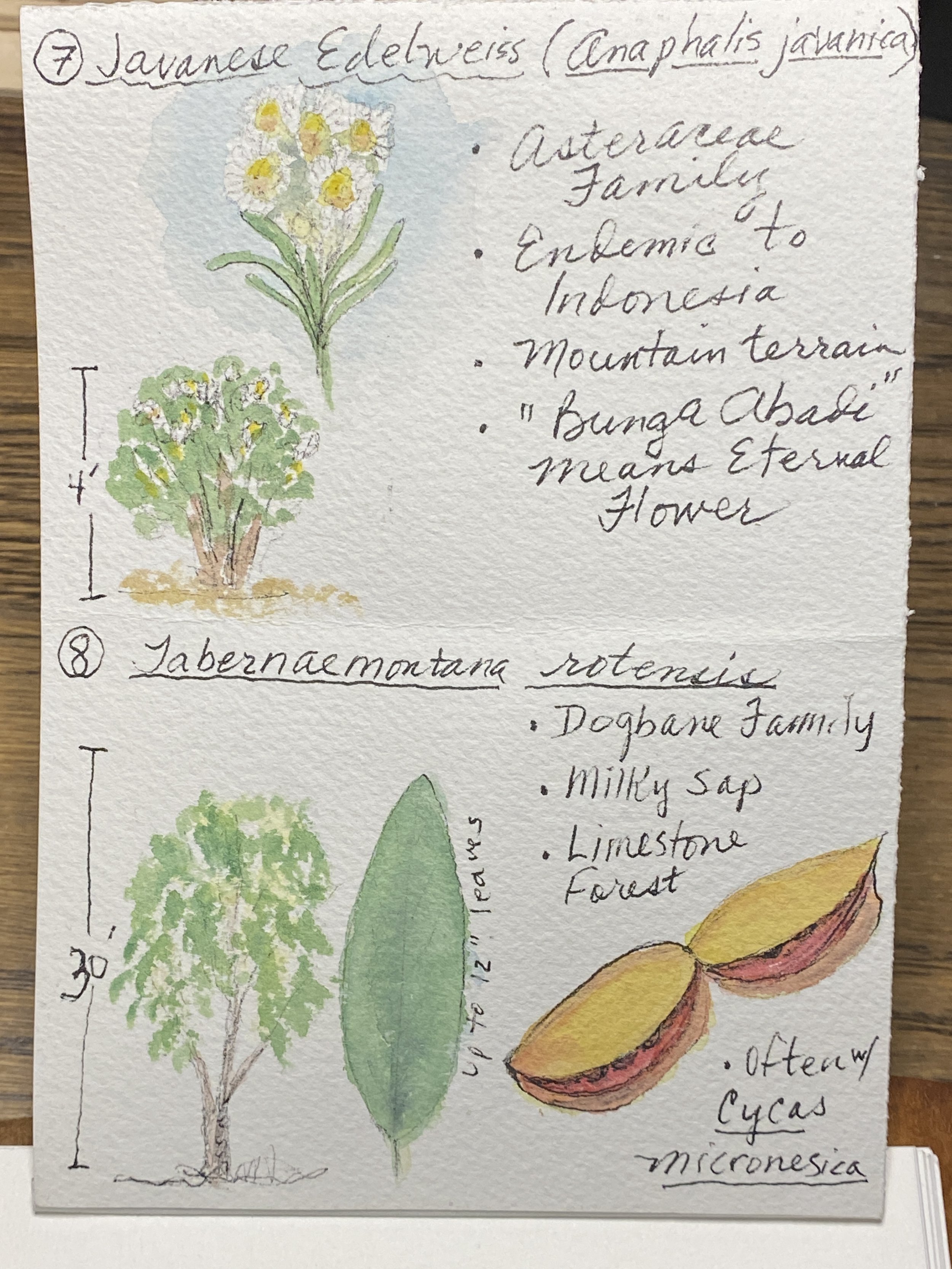
ATTENDEES’ Pages from the Workshop
Please send your pages and I will upload!




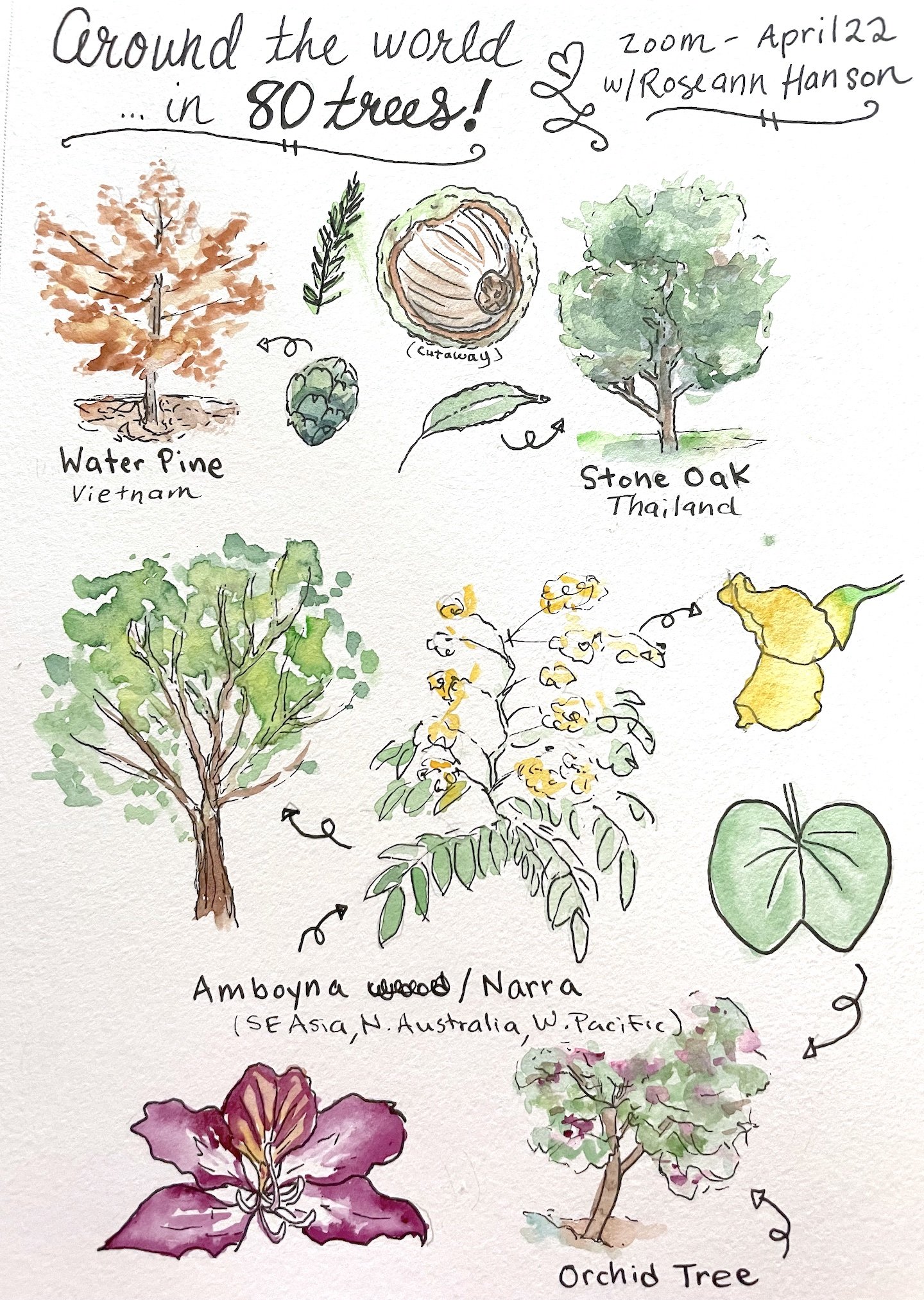
Field Arts Workshop: Around the World in 80 Trees No. 7 (Australia)
Inspired by Jonathan Drori’s wonderful books Around the World in 80 Trees and Around the World Plants, we’re going to travel around the globe by region and sketch interesting, weird, iconic, or beautiful trees and tree-like plants.
Part 7: Australia
What you’ll need: a multi-media sketchbook or an accordion style booklet (see below), pen and / or pencil for our base drawings, and then watercolor or colored pencil to quickly bring them to life.
TIP: I used a strip of heavy watercolor paper folded into four squares to create an “accordion” booklet to record my trees (8 total, 4 on each side).
Prepwork: have on hand a simple outline map of Asia (see resources below) so you can sketch location points for each species.
Length: 2 hours
Downloads and Resources
Locations of the 8 species for this workshop (these are not the ranges, but the site where the specimen we sketch is located).
Books and References:
Plants of the World, hosted by Kew Royal Botanical Gardens, is an amazing resource. The hardbound book of the same name is a treasure, and I use it extensively in my research for this series.
Colors and brush I use:
I favor a simple primary “triad” plus two extra colors: Manganese Blue (“cyan”), Quinacridone Rose (“magenta”), Aureolin Yellow (“yellow”), and Burnt Sienna and Indanthrone Blue, all Daniel Smith.
I use an Isabey Squirrel Mop Travel Brush.
ROSEANN’S FINISHED ACCORDION PAGE
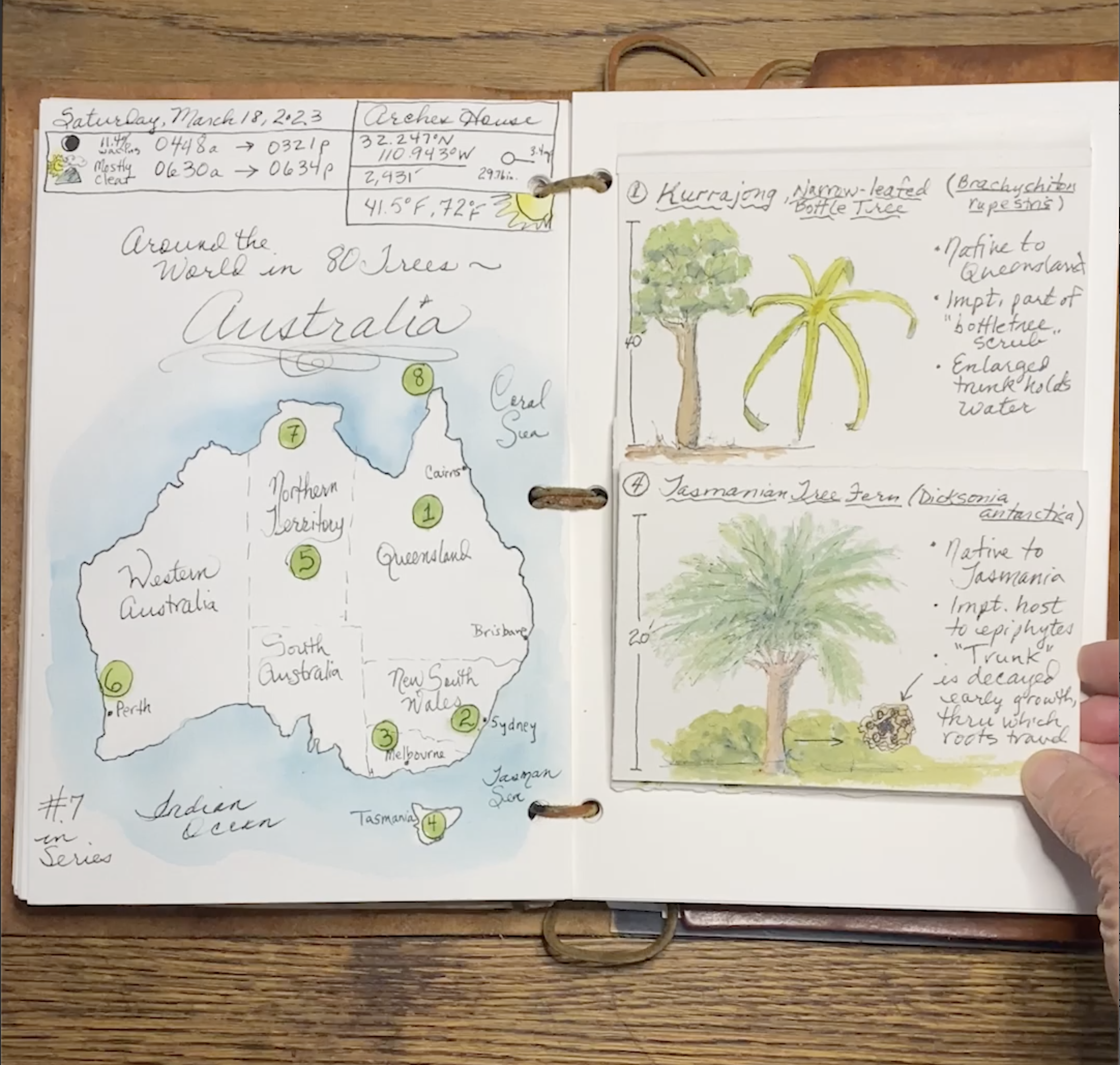
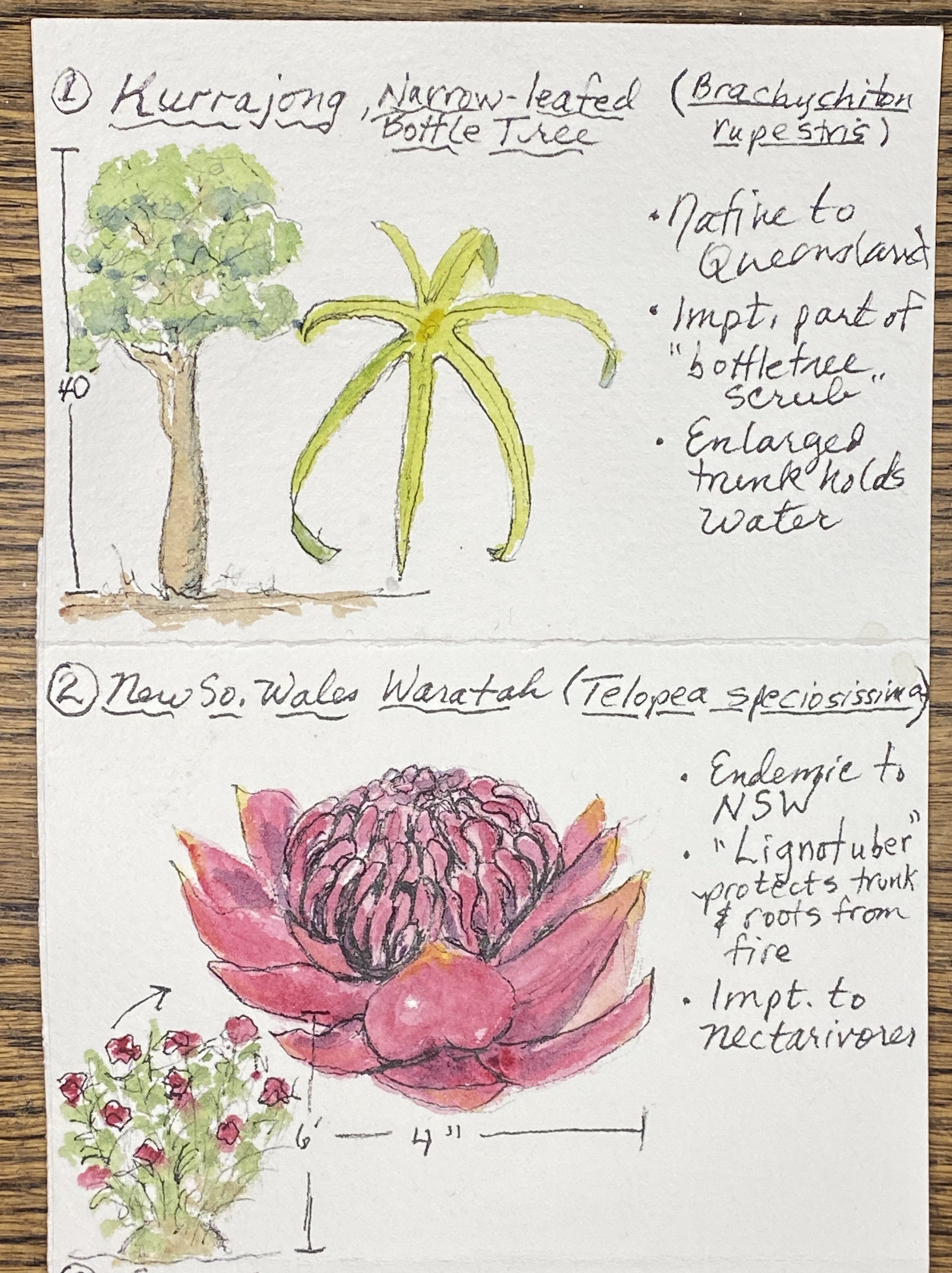
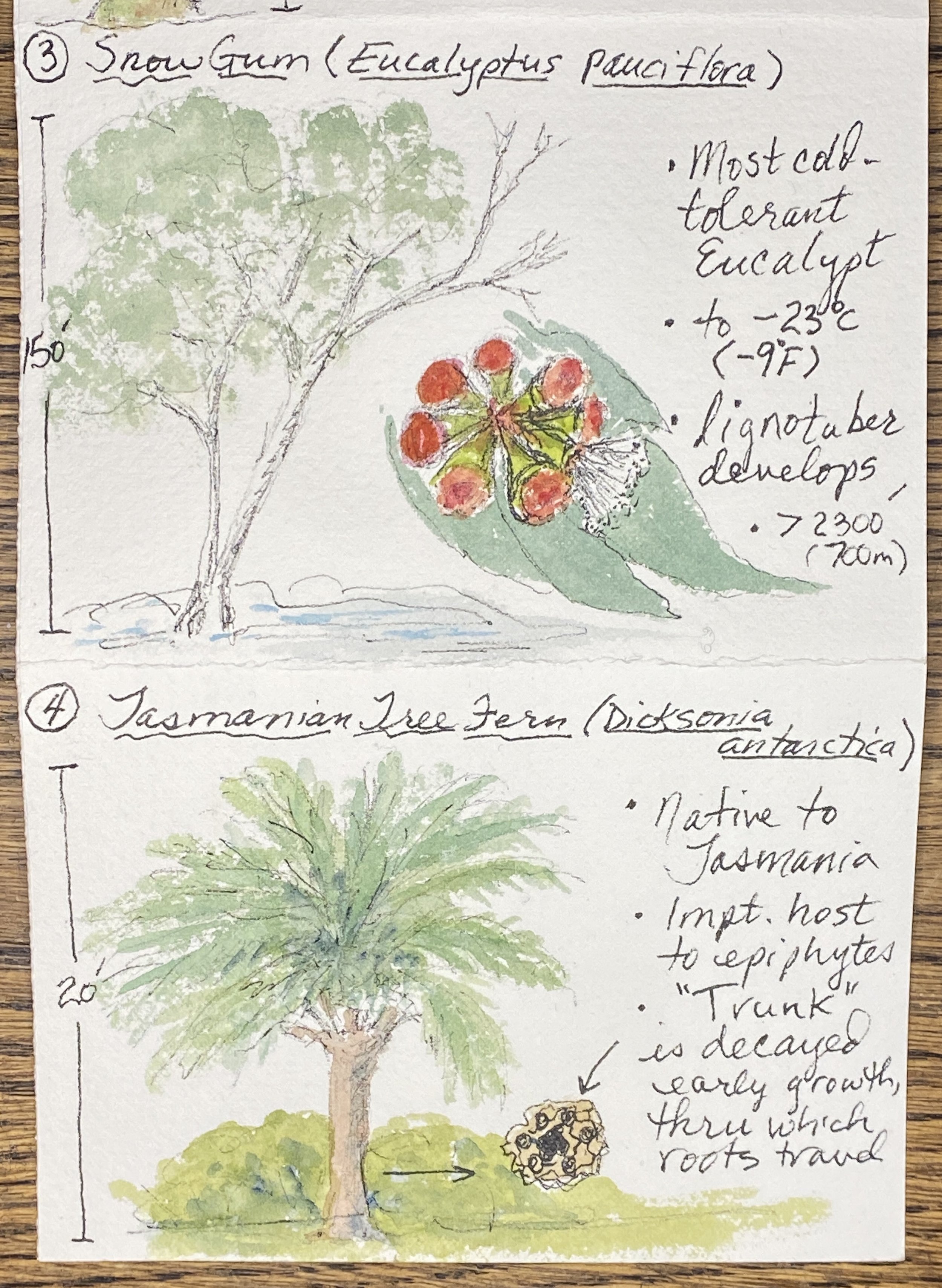
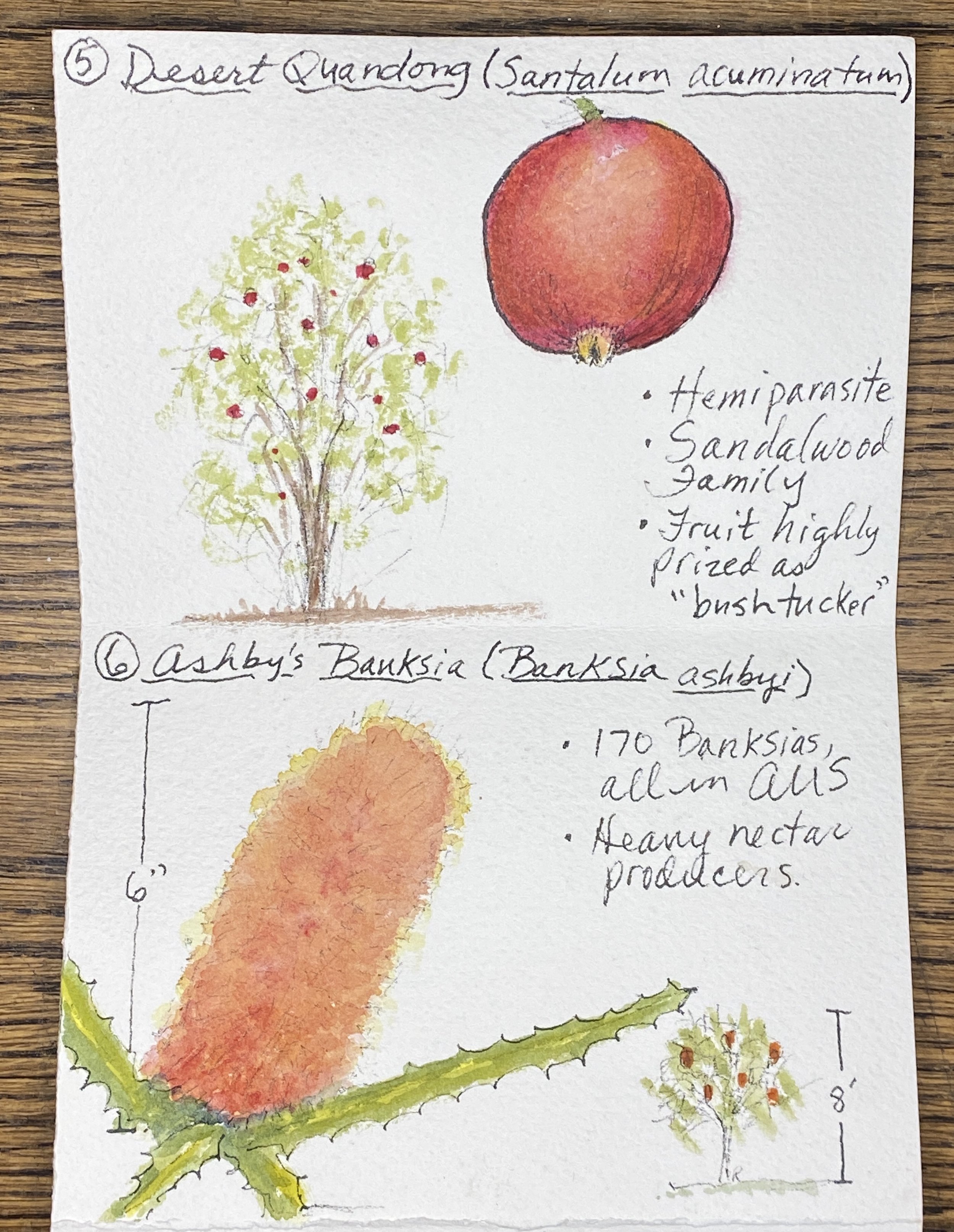
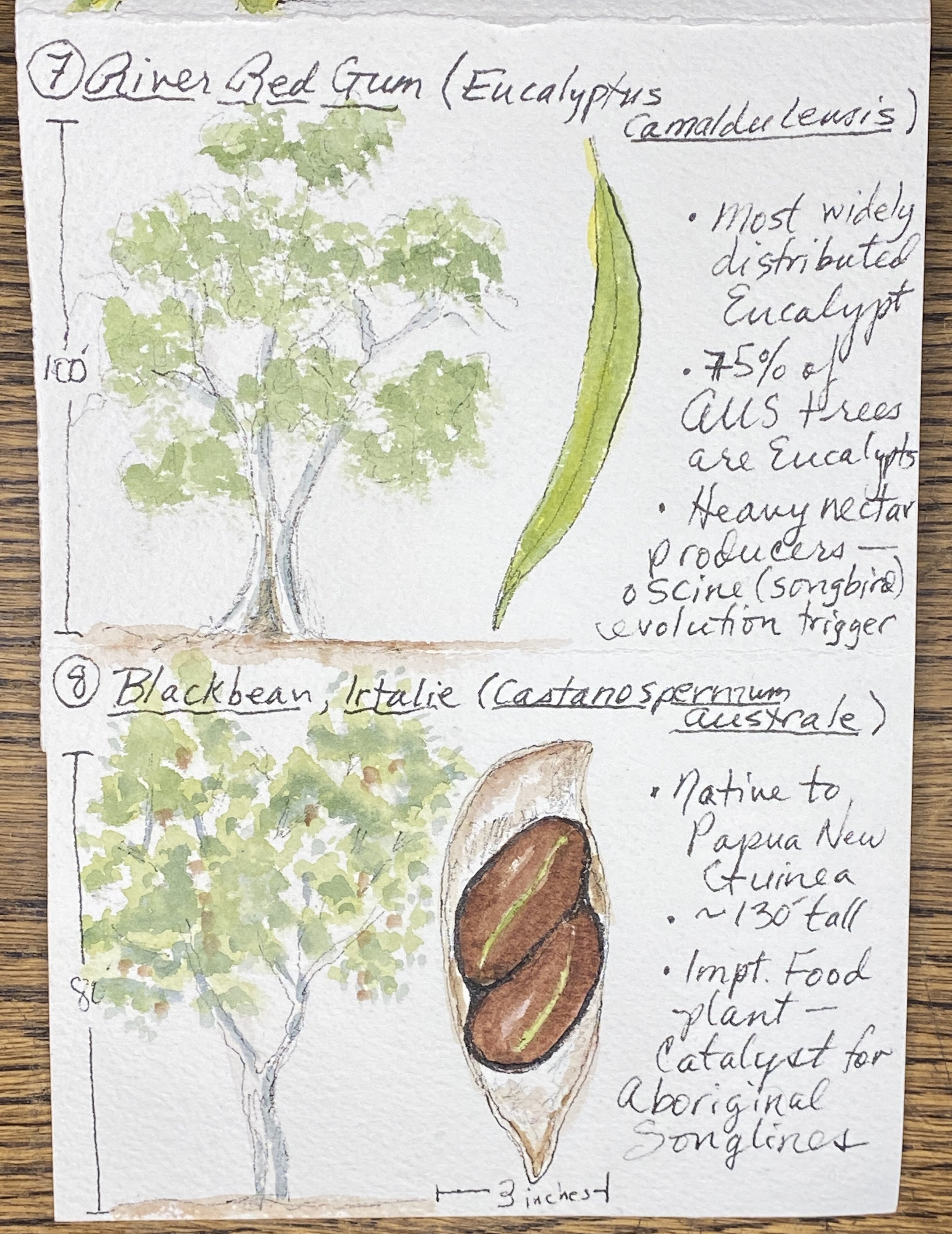
ATTENDEES’ Pages from the Workshop
Please send your pages and I will upload!
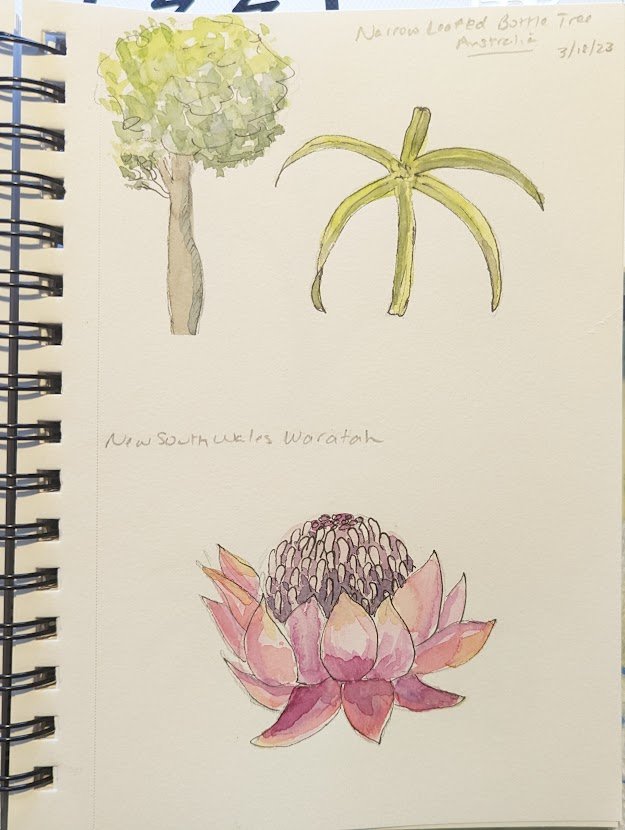
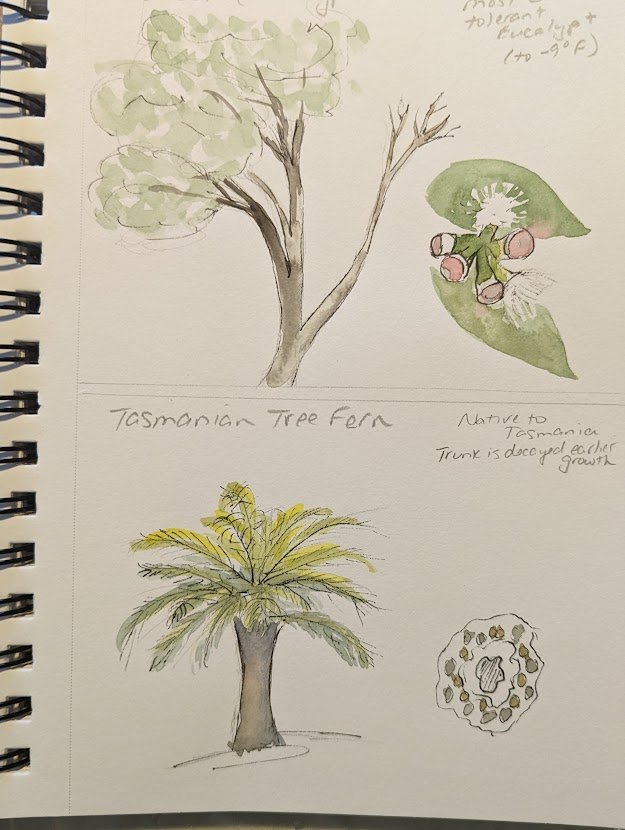
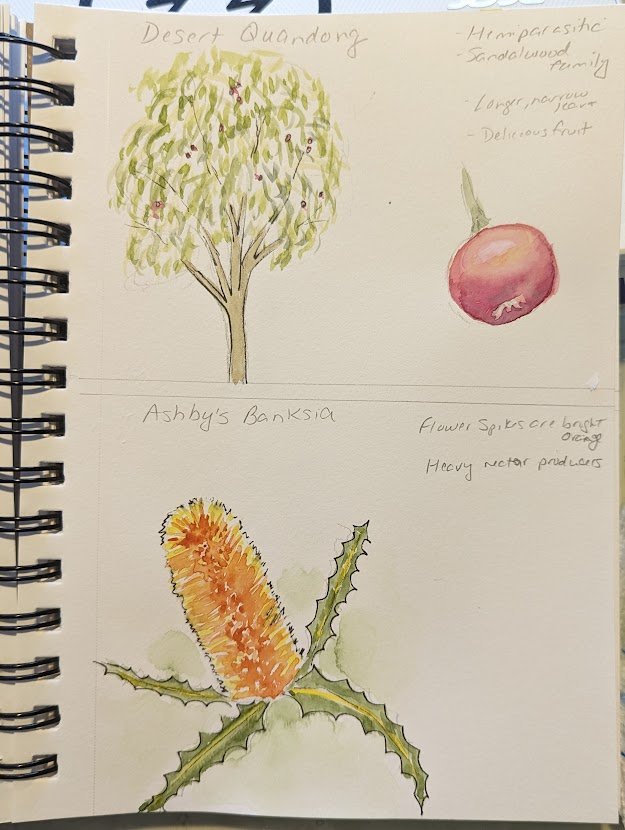
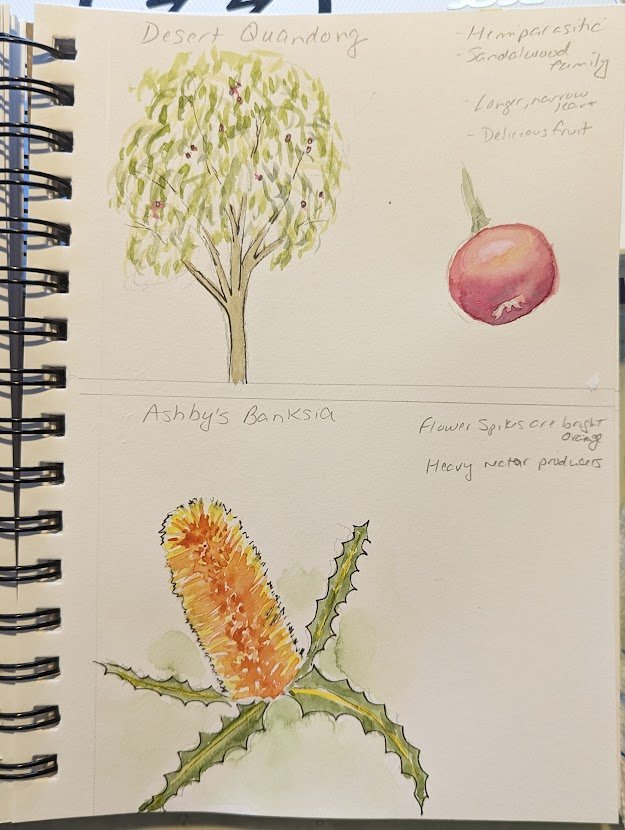
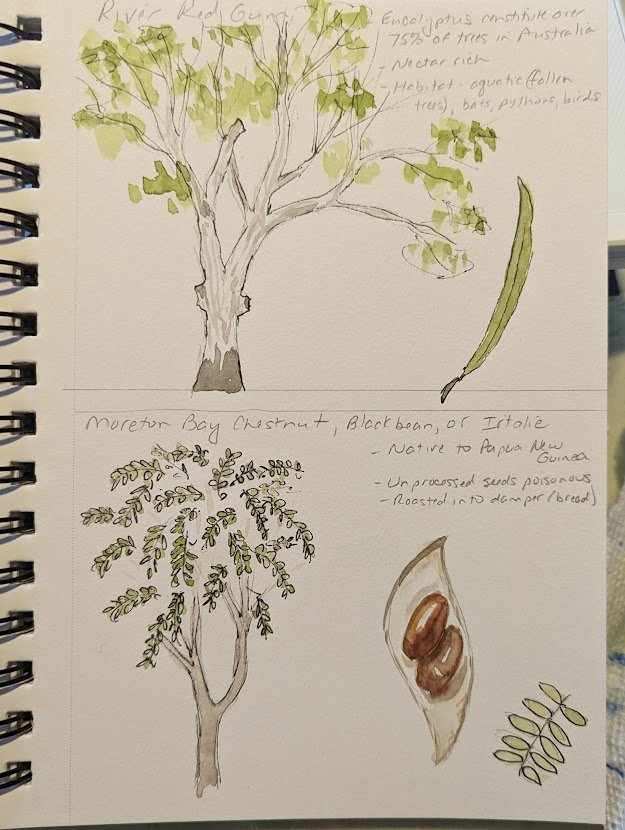
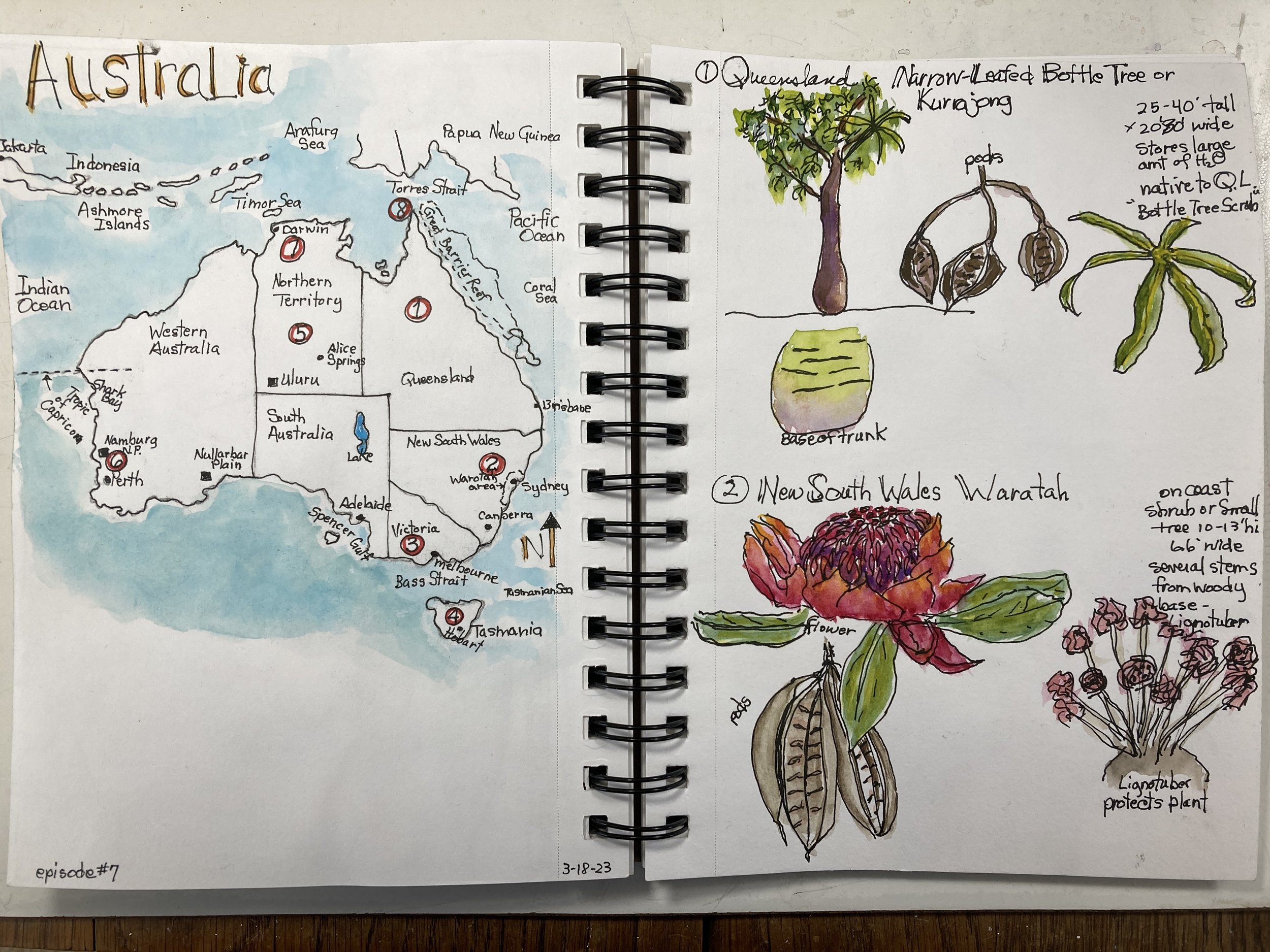
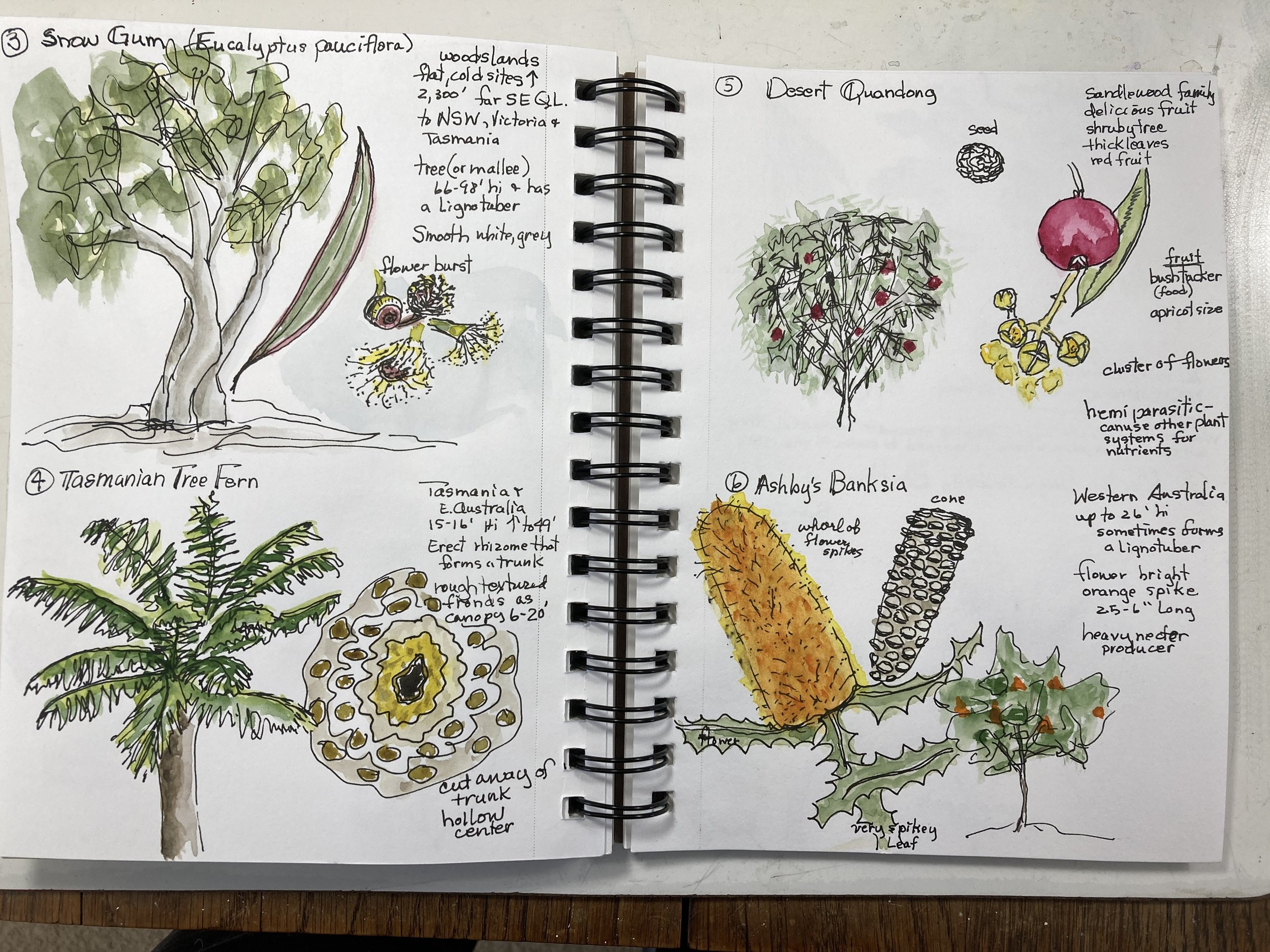
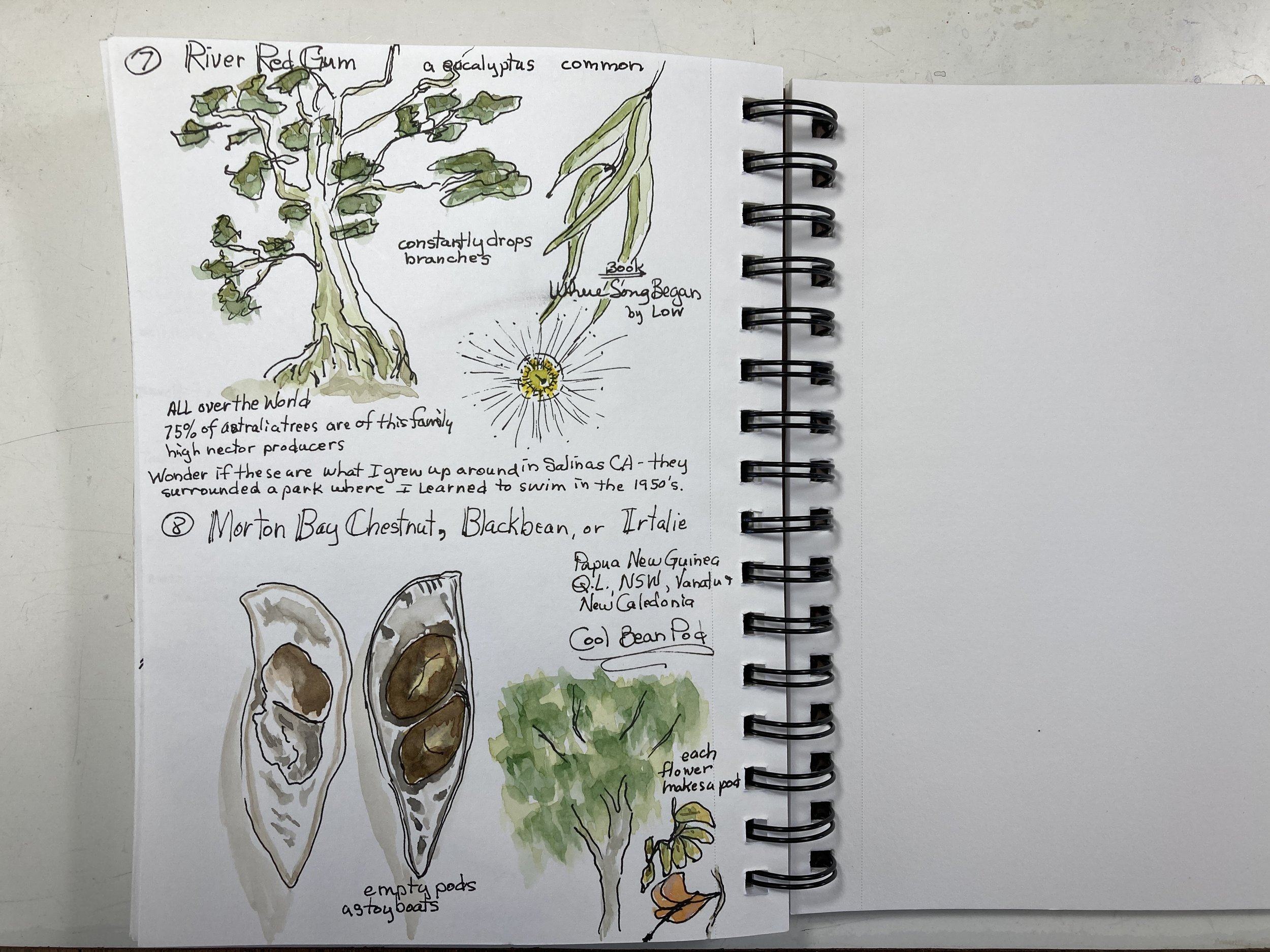







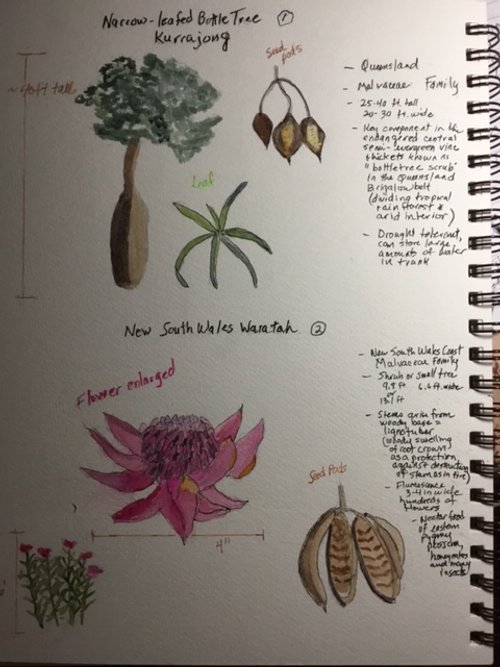
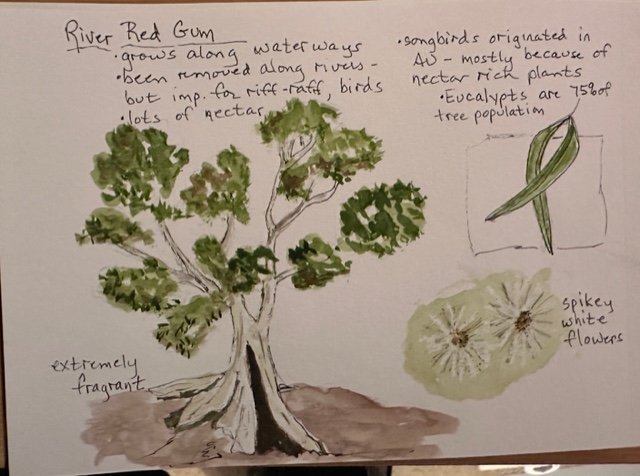
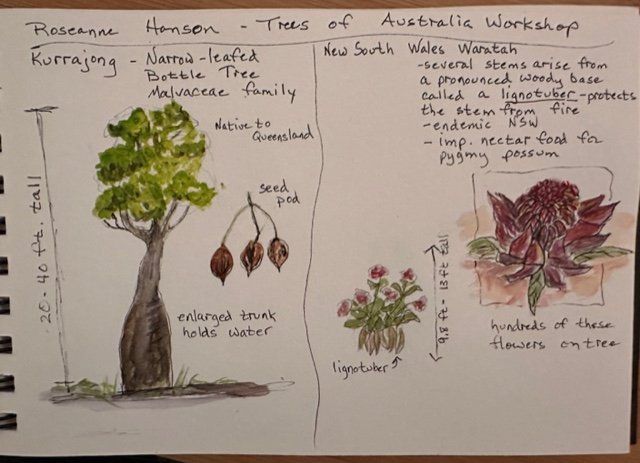
Field Arts Workshop: Around the World in 80 Trees No. 6 (Asia - Part 2)
Inspired by Jonathan Drori’s wonderful books Around the World in 80 Trees and Around the World Plants, we’re going to travel around the globe by region and sketch interesting, weird, iconic, or beautiful trees and tree-like plants.
Part 6: Asia - Part 2
What you’ll need: a multi-media sketchbook or an accordion style booklet (see below), pen and / or pencil for our base drawings, and then watercolor or colored pencil to quickly bring them to life.
TIP: I used a strip of heavy watercolor paper folded into four squares to create an “accordion” booklet to record my trees (8 total, 4 on each side).
Prepwork: have on hand a simple outline map of Asia (see resources below) so you can sketch location points for each species.
Length: 2 hours
Downloads and Resources
Locations of the 8 species for this workshop (these are not the ranges, but the site where the specimen we sketch is located).
Tip: Print or create an outline of Asia in your journal so you can mark the site locations of our sketched species.
Books and References:
Plants of the World, hosted by Kew Royal Botanical Gardens, is an amazing resource. The hardbound book of the same name is a treasure, and I use it extensively in my research for this series.
Colors and brush I use:
I favor a simple primary “triad” plus two extra colors: Manganese Blue (“cyan”), Quinacridone Rose (“magenta”), Aureolin Yellow (“yellow”), and Burnt Sienna and Indanthrone Blue, all Daniel Smith.
I use an Isabey Squirrel Mop Travel Brush.
ROSEANN’S FINISHED ACCORDION PAGE
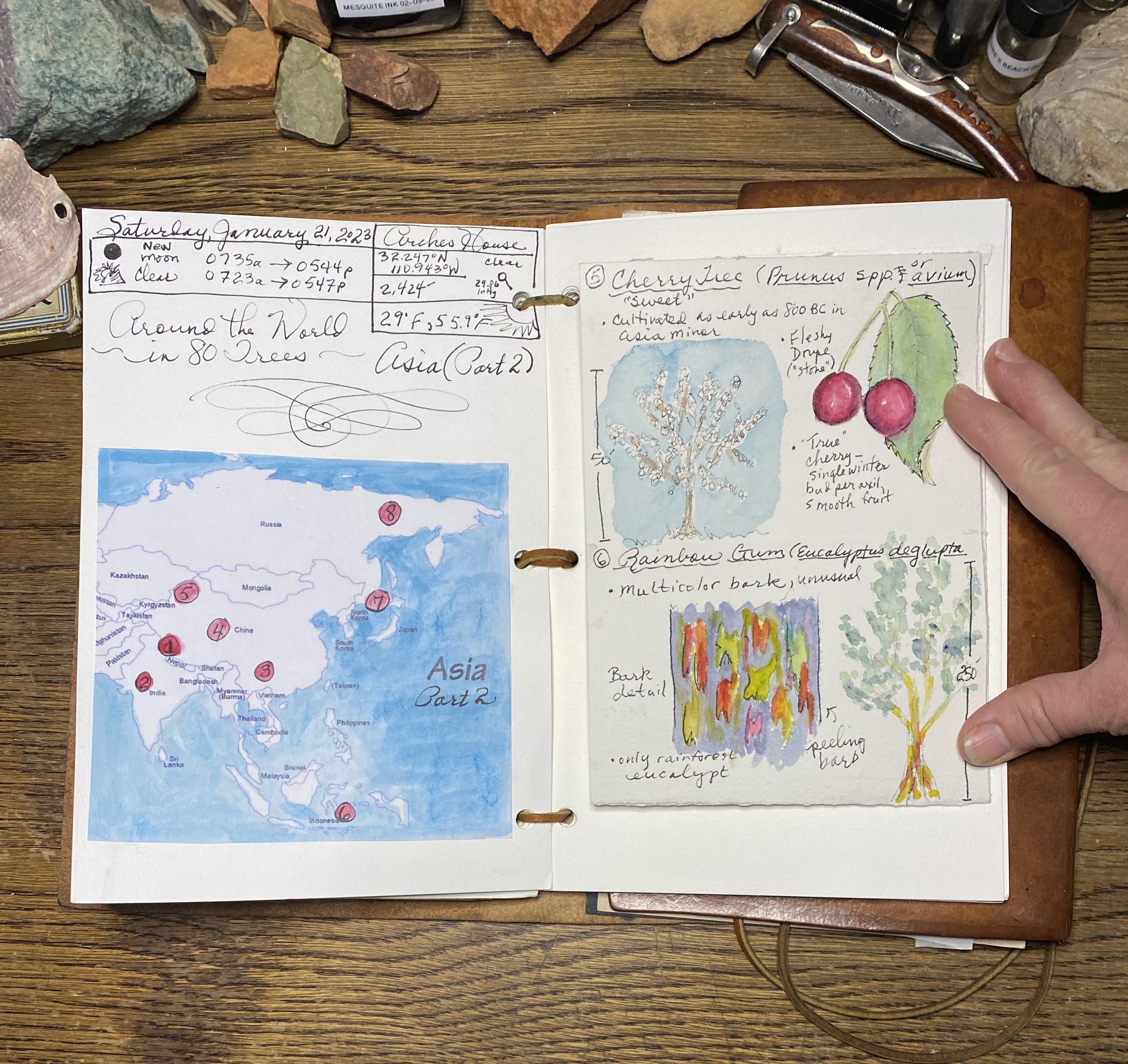
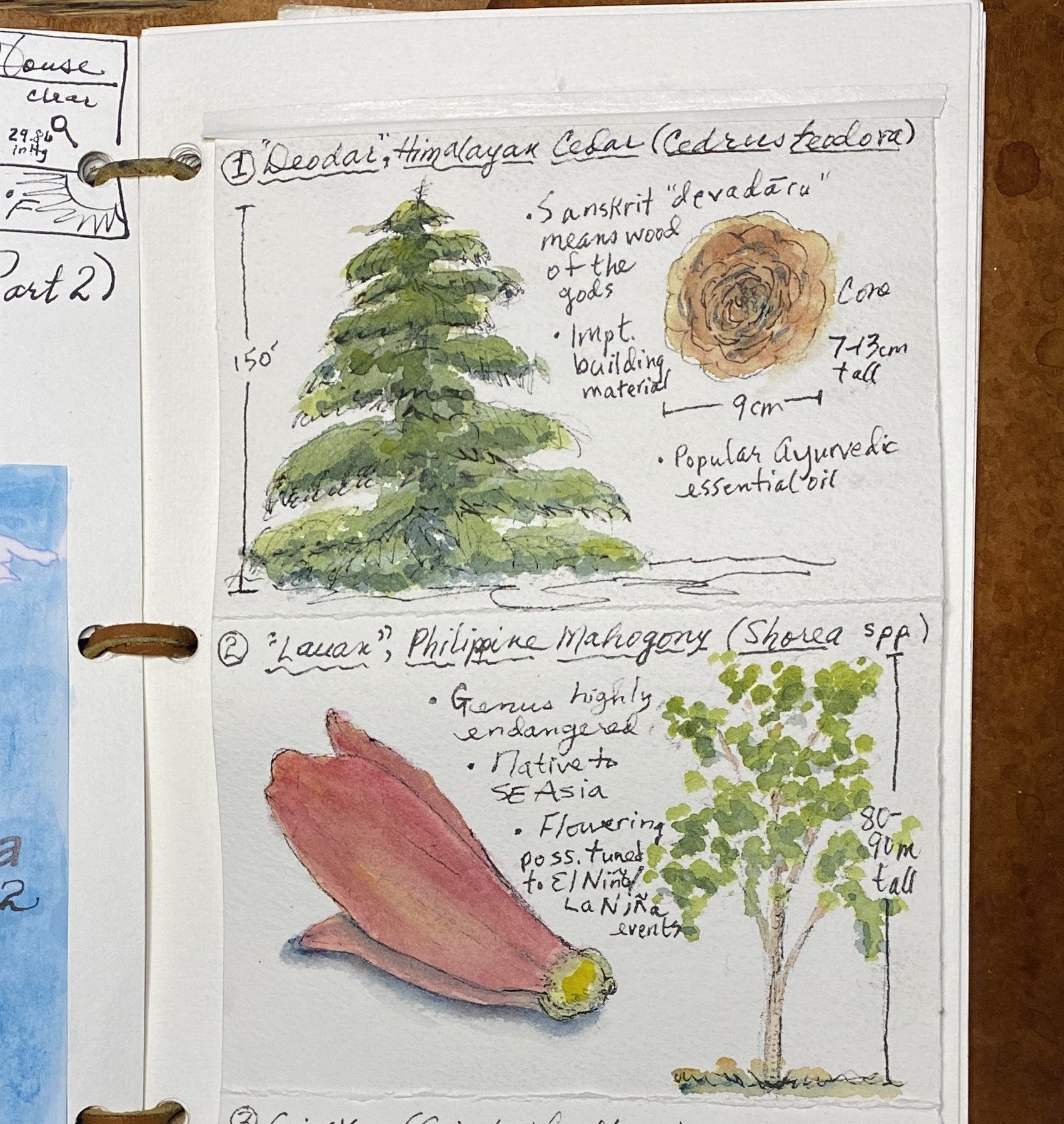
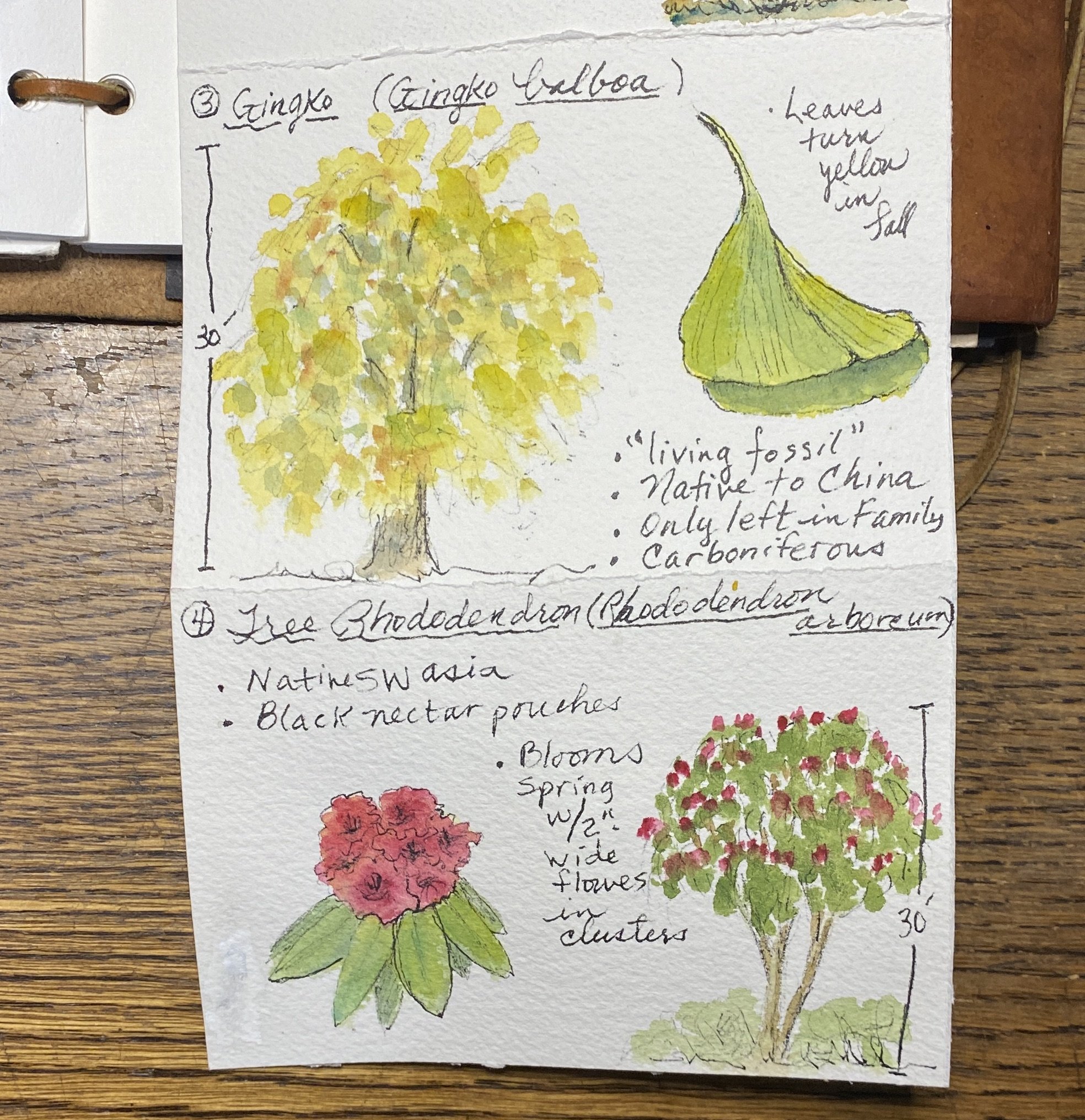
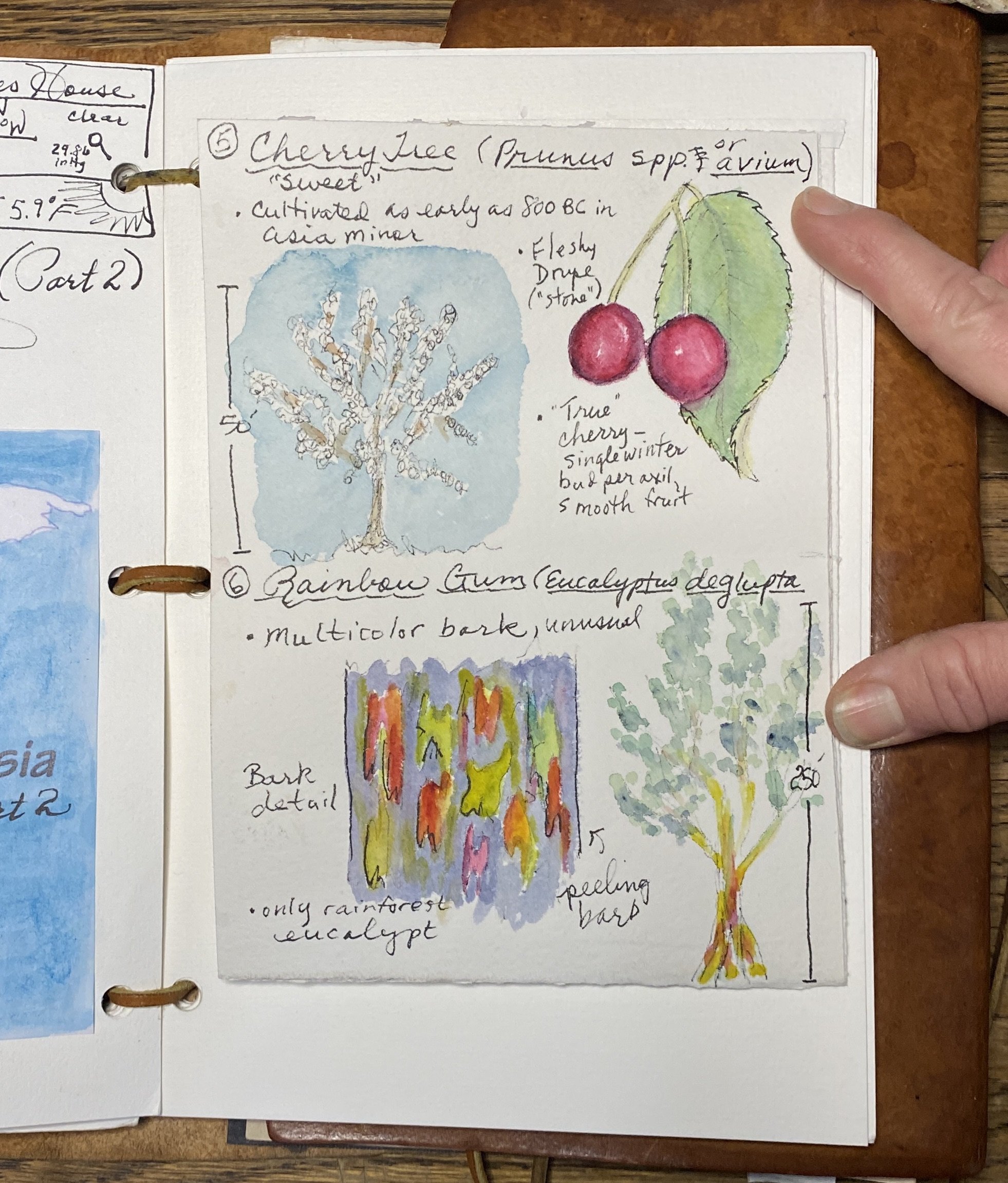
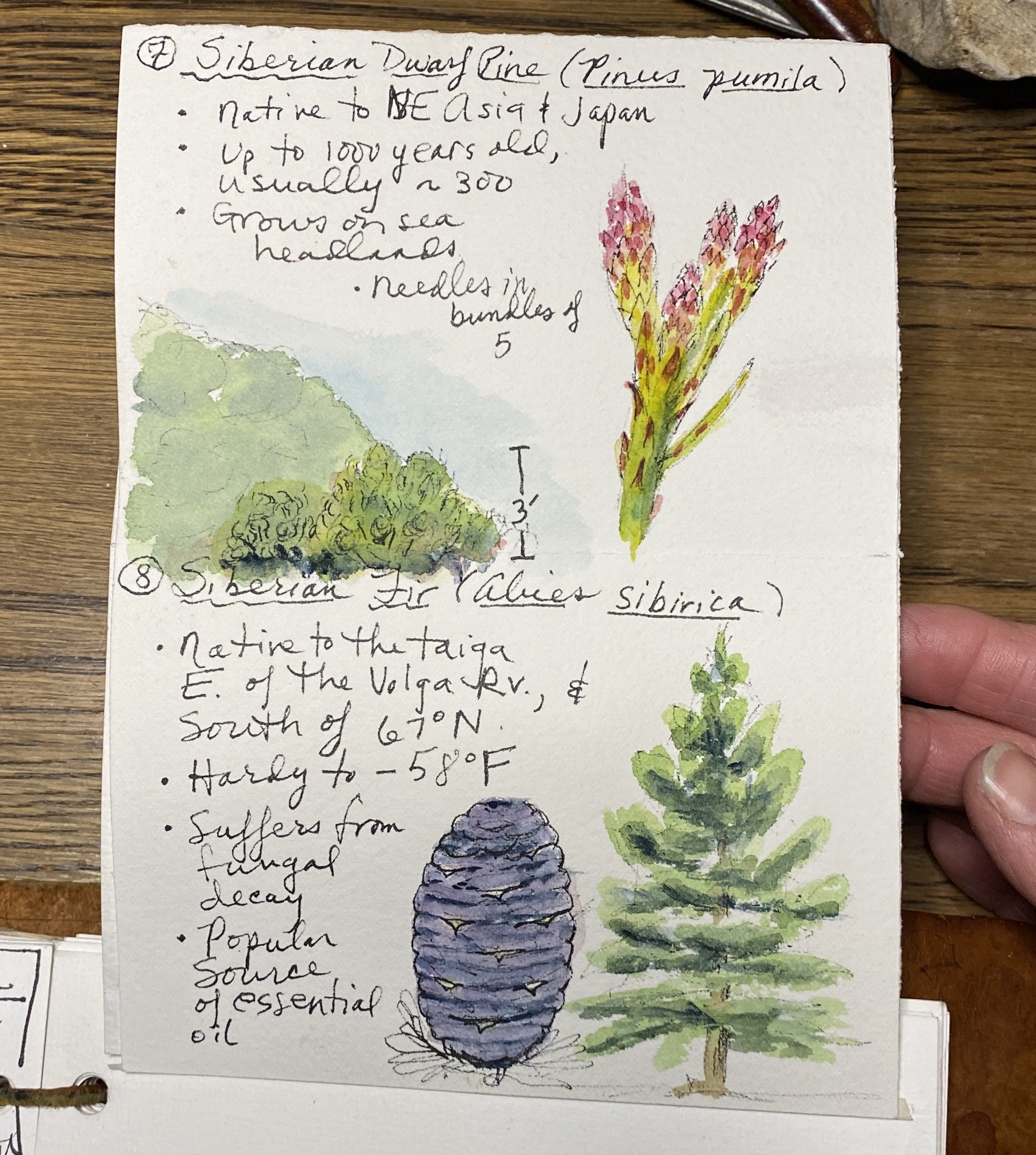
ATTENDEES’ Pages from the Workshop
Please send your pages and I will upload!
Field Arts Workshop: Around the World in 80 Trees No. 5 (Asia - Part 1)
Inspired by Jonathan Drori’s wonderful books Around the World in 80 Trees and Around the World Plants, we’re going to travel around the globe by region and sketch interesting, weird, iconic, or beautiful trees and tree-like plants.
Part 4: Asia - Part 1!
What you’ll need: a multi-media sketchbook or an accordion style booklet (see below), pen and / or pencil for our base drawings, and then watercolor or colored pencil to quickly bring them to life.
TIP: I used a strip of heavy watercolor paper folded into four squares to create an “accordion” booklet to record my trees (8 total, 4 on each side).
Prepwork: have on hand a simple outline map of Asia (see resources below) so you can sketch location points for each species.
Length: 2 hours
Downloads and Resources
Locations of the 8 species for this workshop (these are not the ranges, but the site where the specimen we sketch is located).
Tip: Print or create an outline of Asia in your journal so you can mark the site locations of our sketched species.
Books and References:
Plants of the World, hosted by Kew Royal Botanical Gardens, is an amazing resource. The hardbound book of the same name is a treasure, and I. use it extensively in my research for this series.
Colors I use:
I favor a simple primary “triad” plus two extra colors: Manganese Blue (“cyan”), Quinacridone Rose (“magenta”), Aureolin Yellow (“yellow”), and Burnt Sienna and Indanthrone Blue, all Daniel Smith.
ROSEANN’S FINISHED ACCORDION PAGE
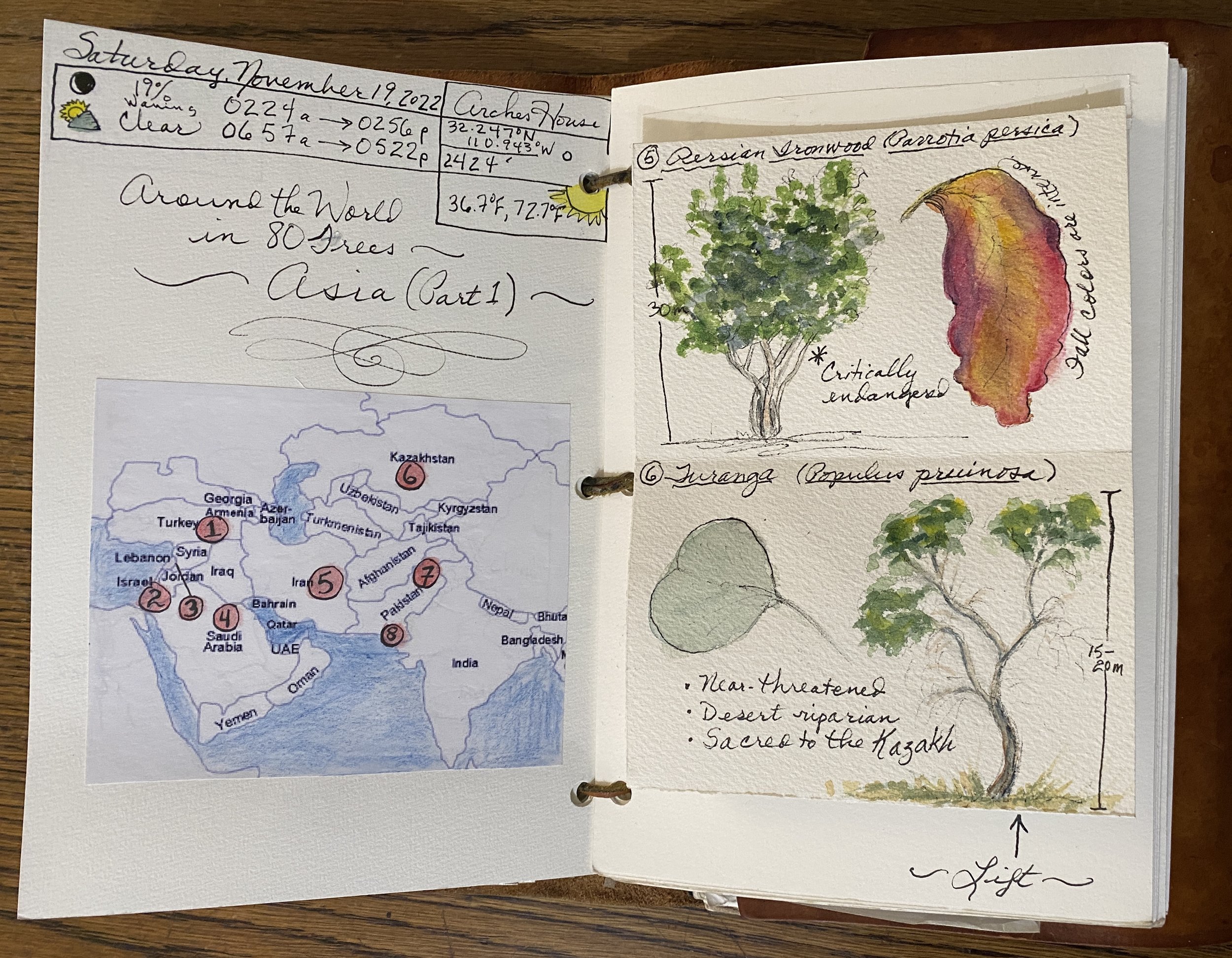



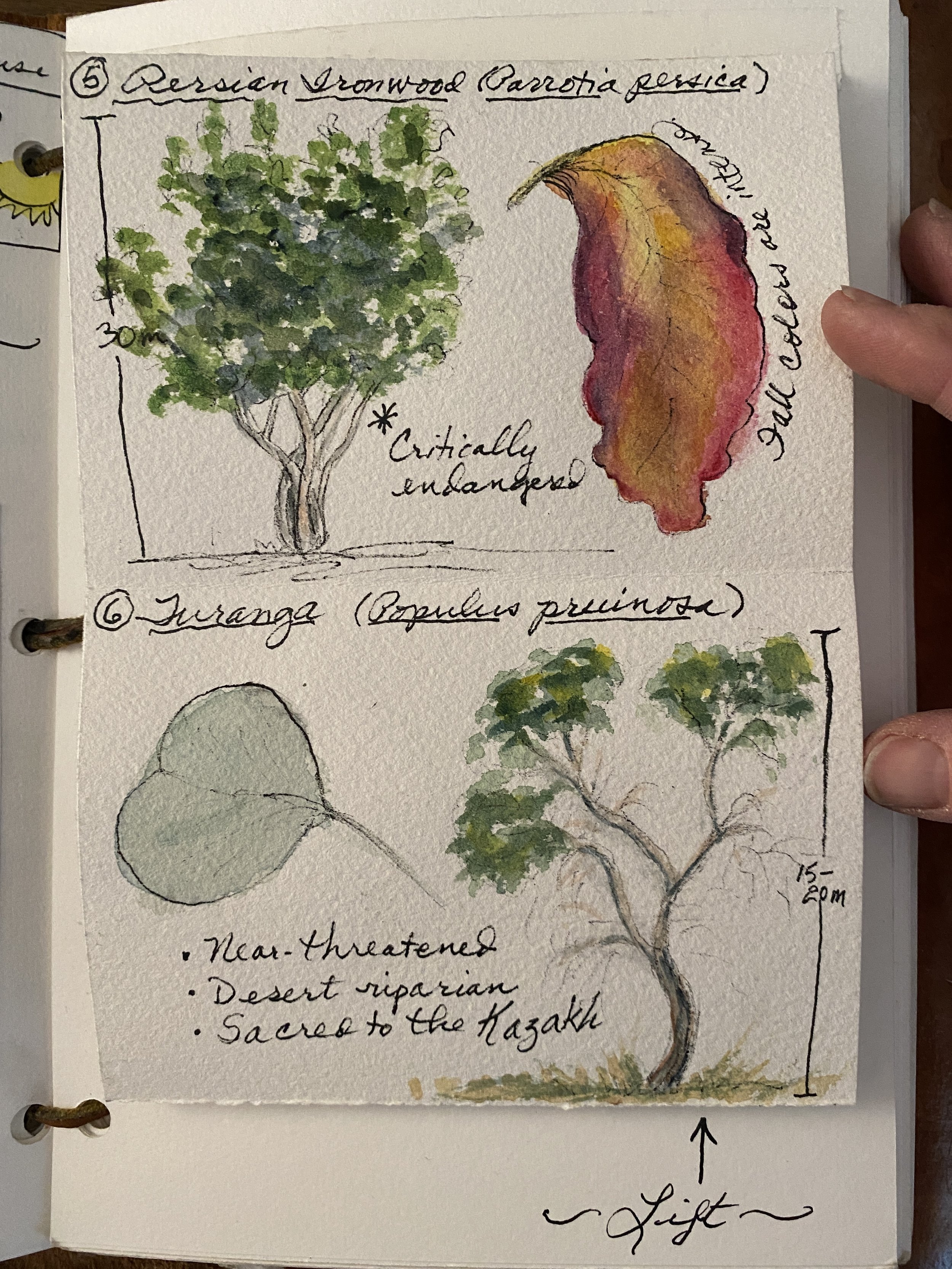
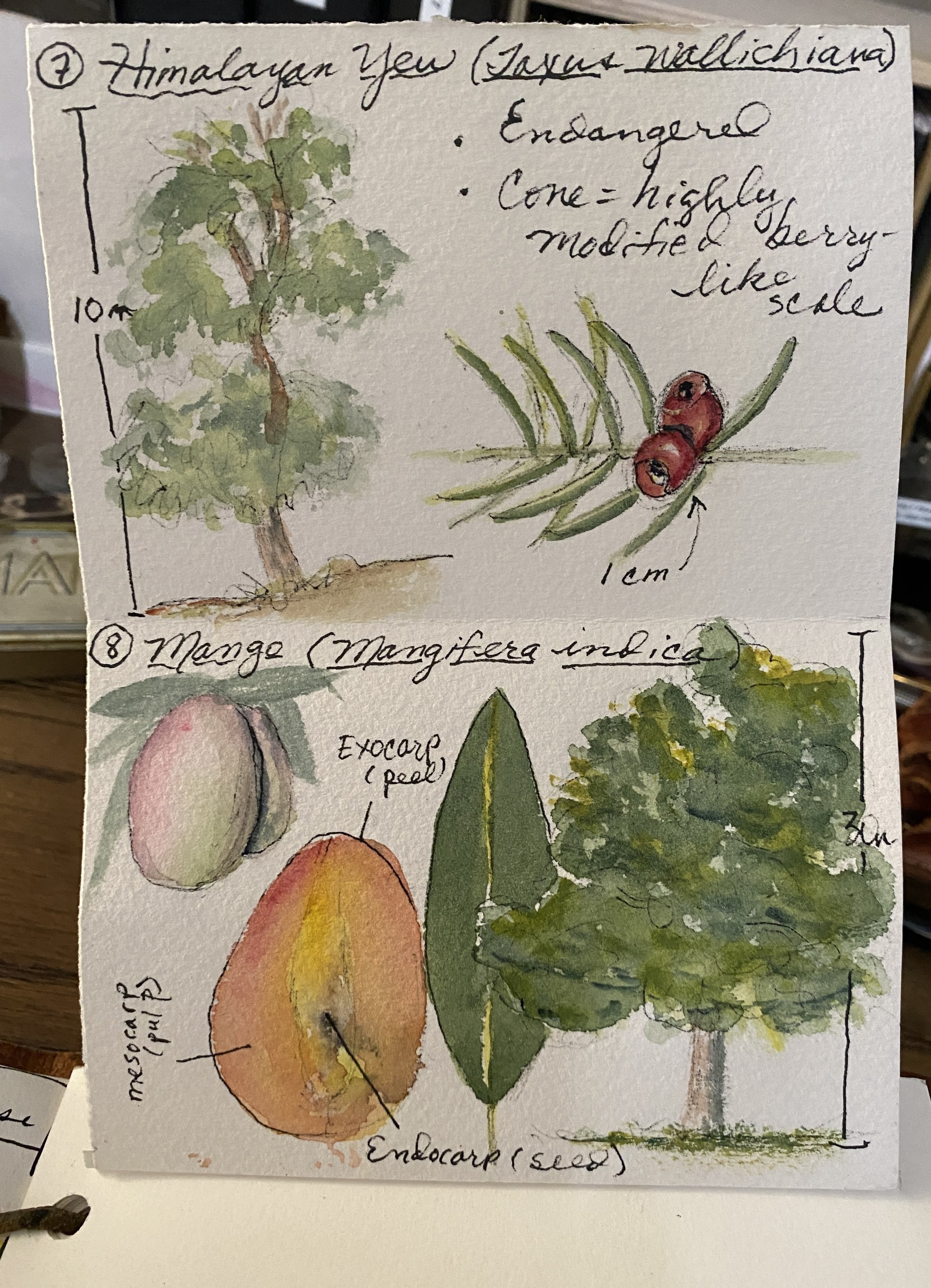
ATTENDEES’ Pages from the Workshop
Please send your pages and I will upload!
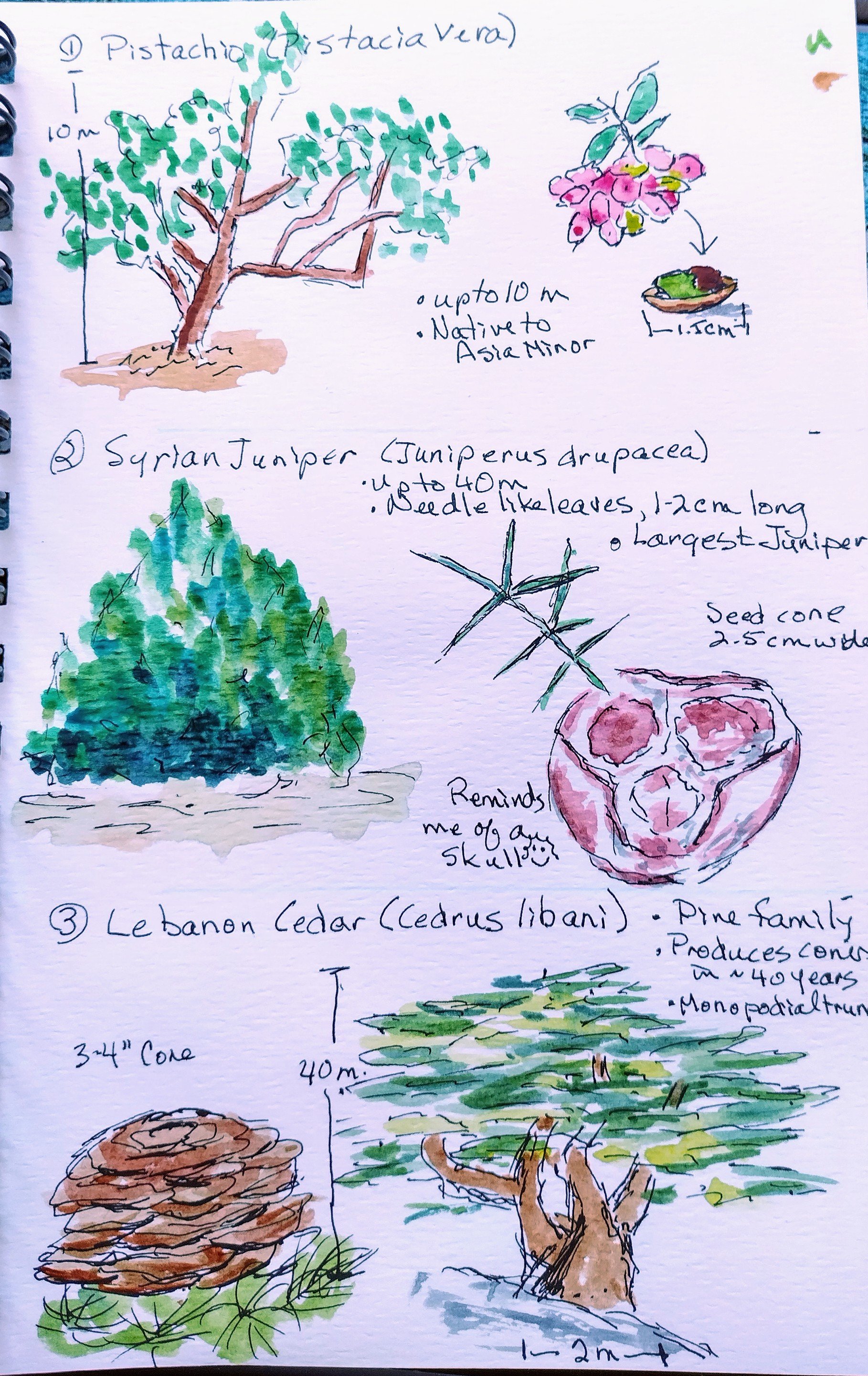
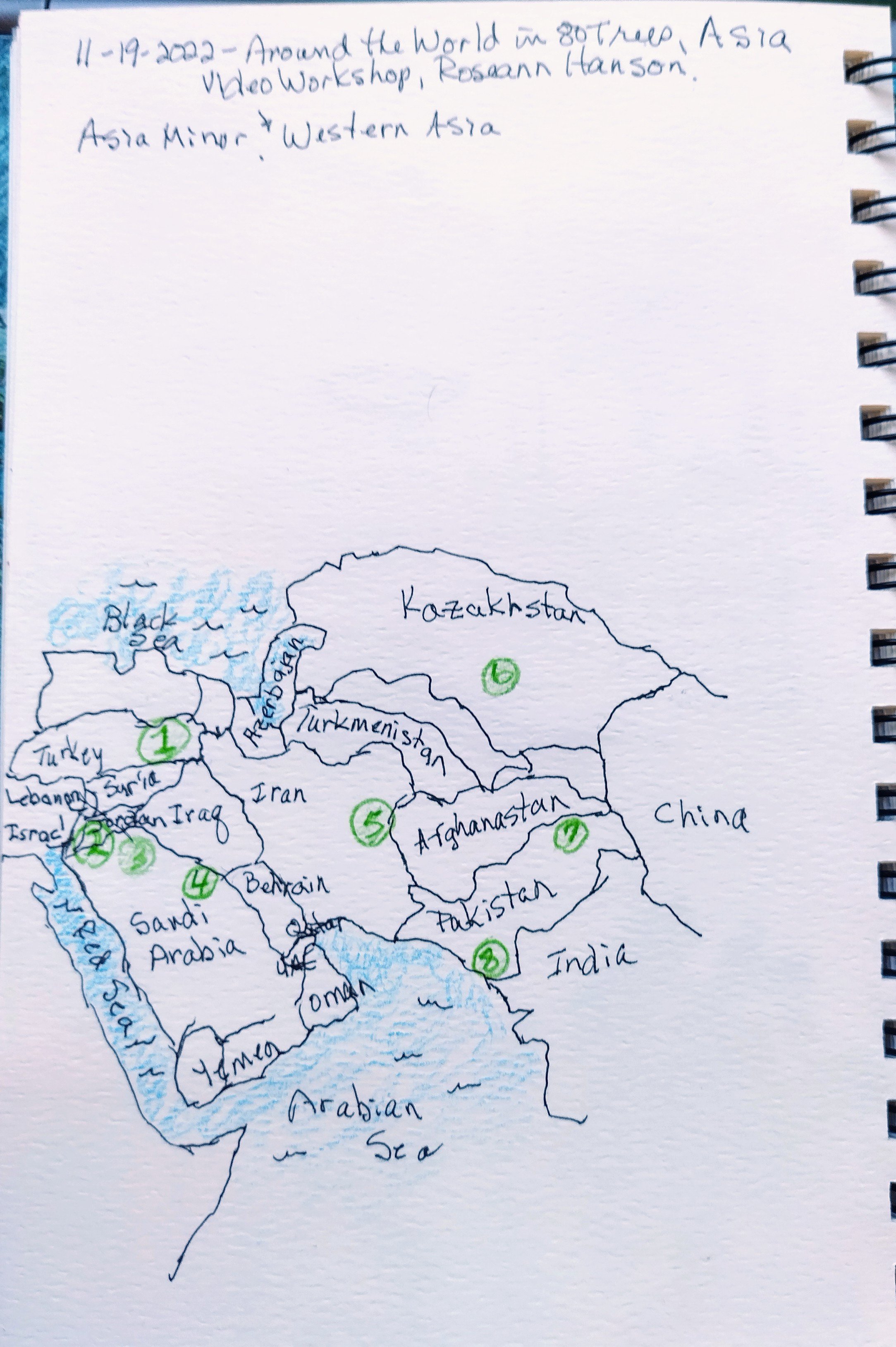
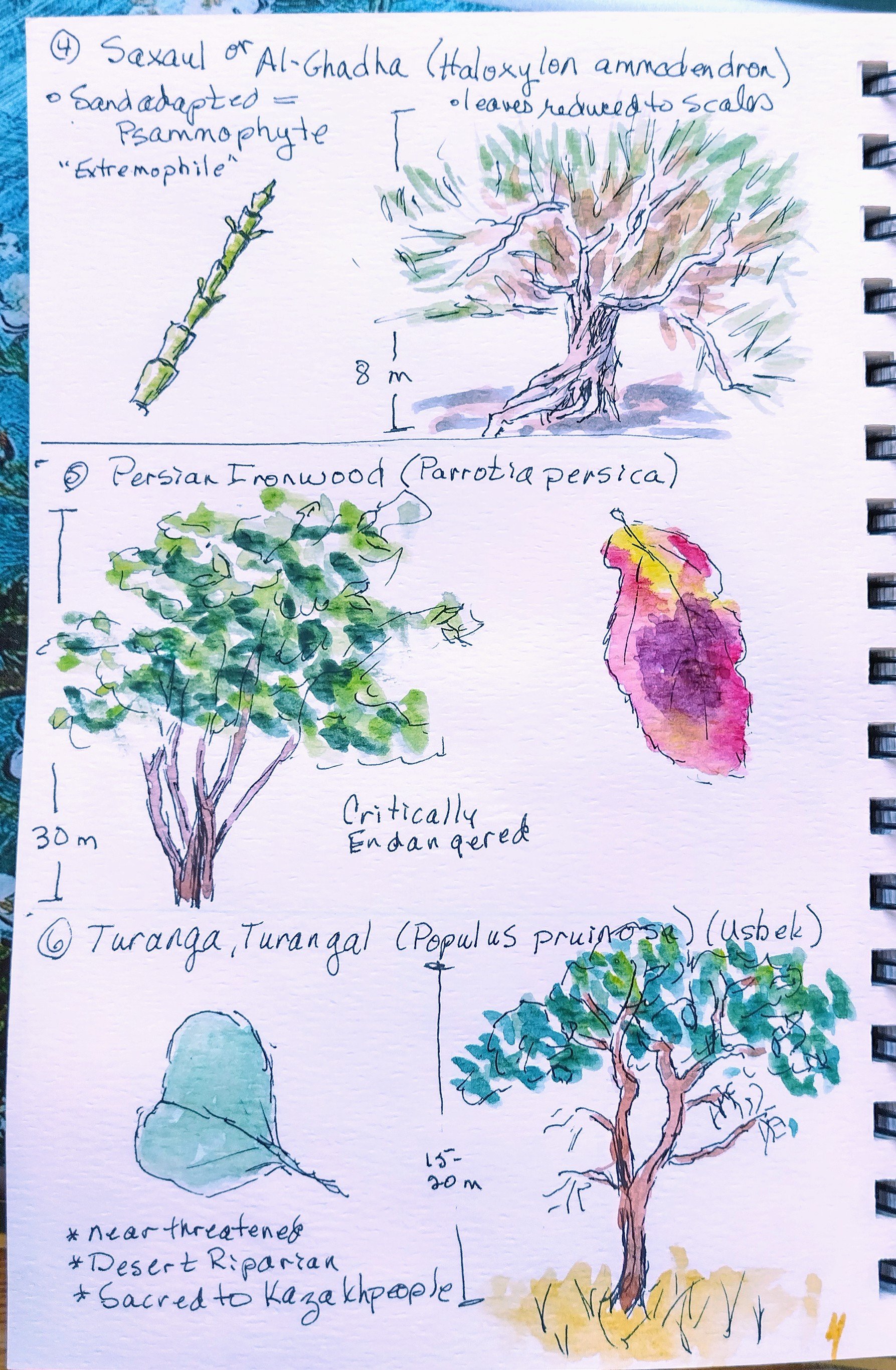
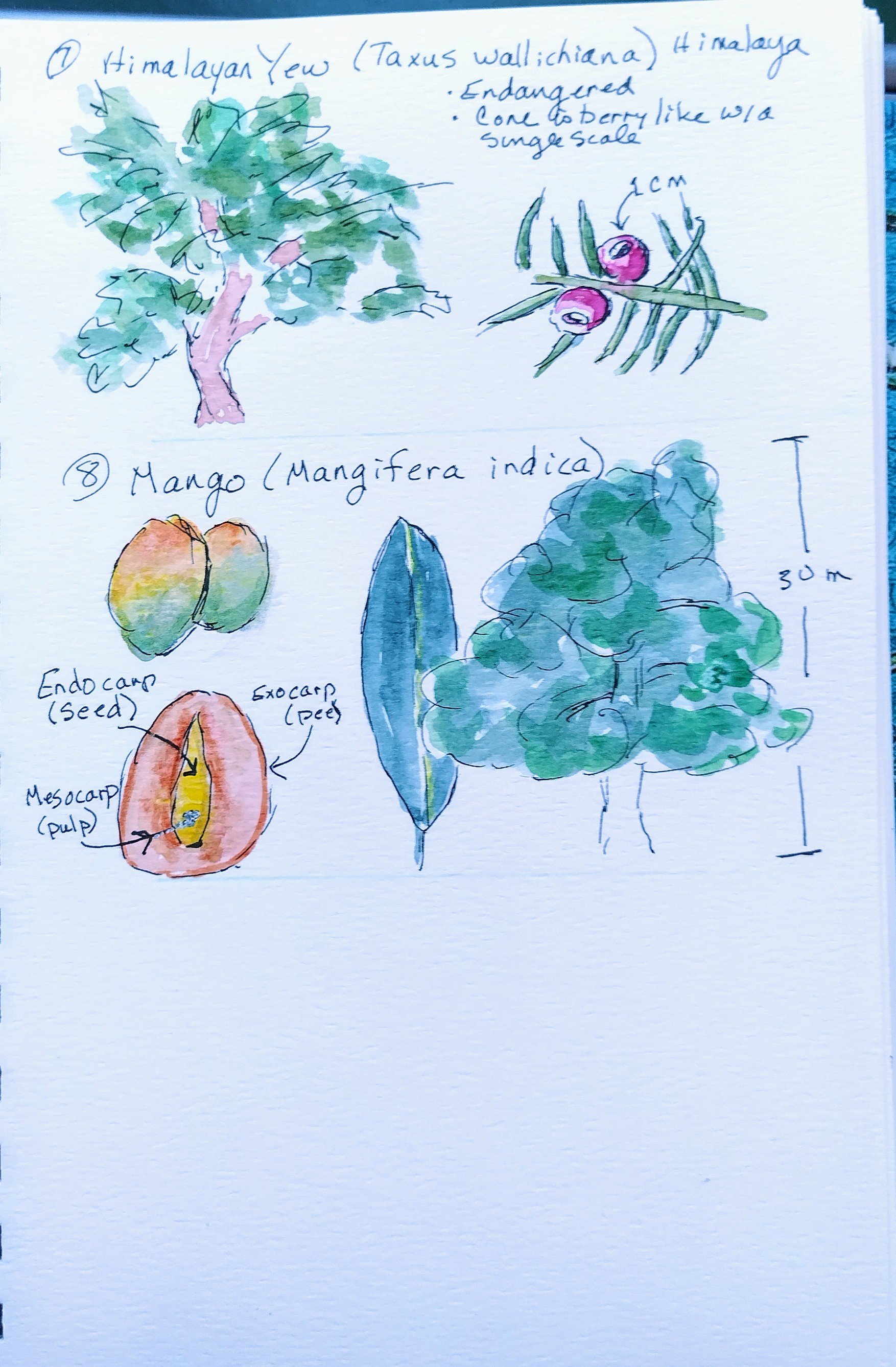


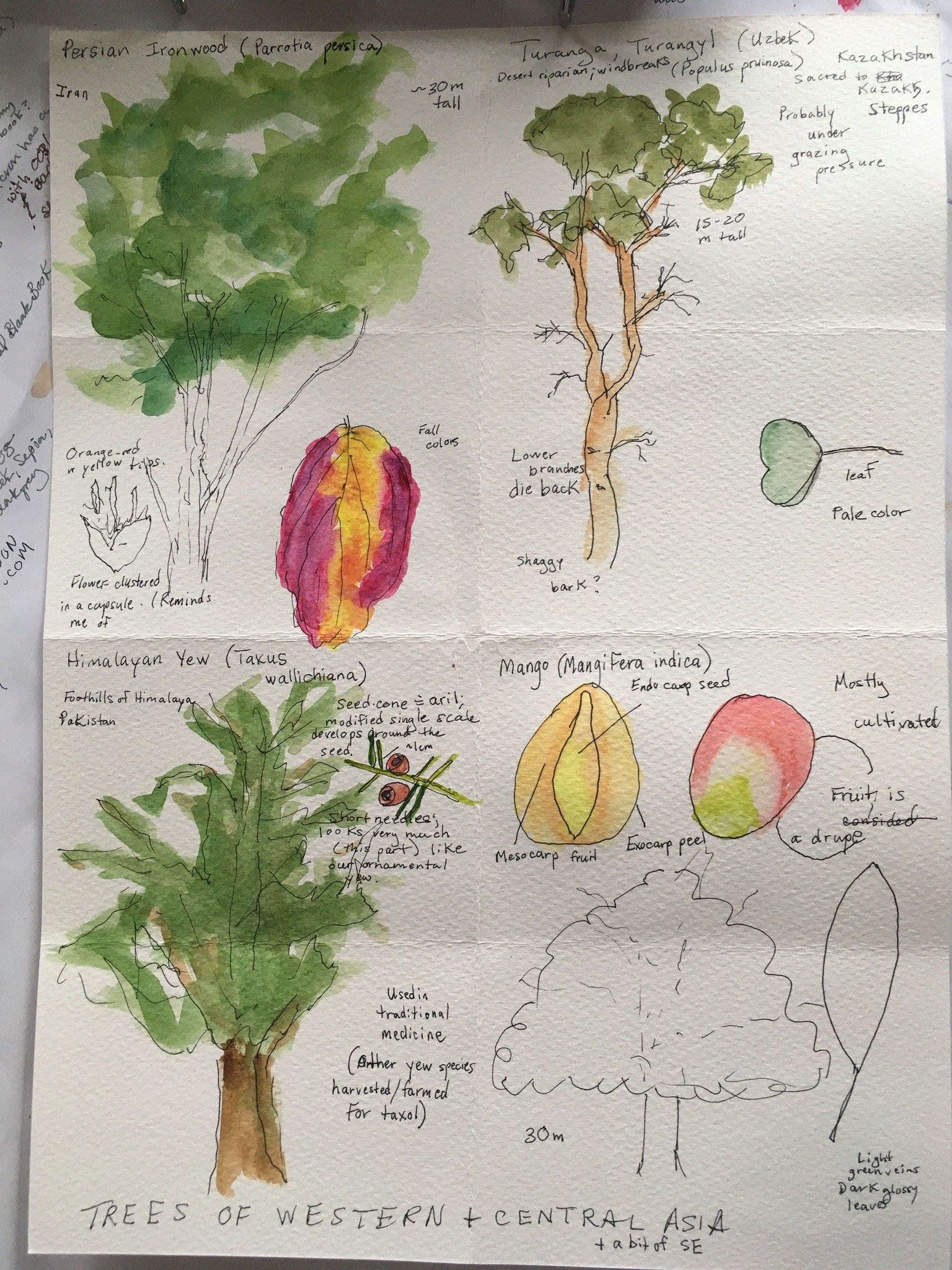
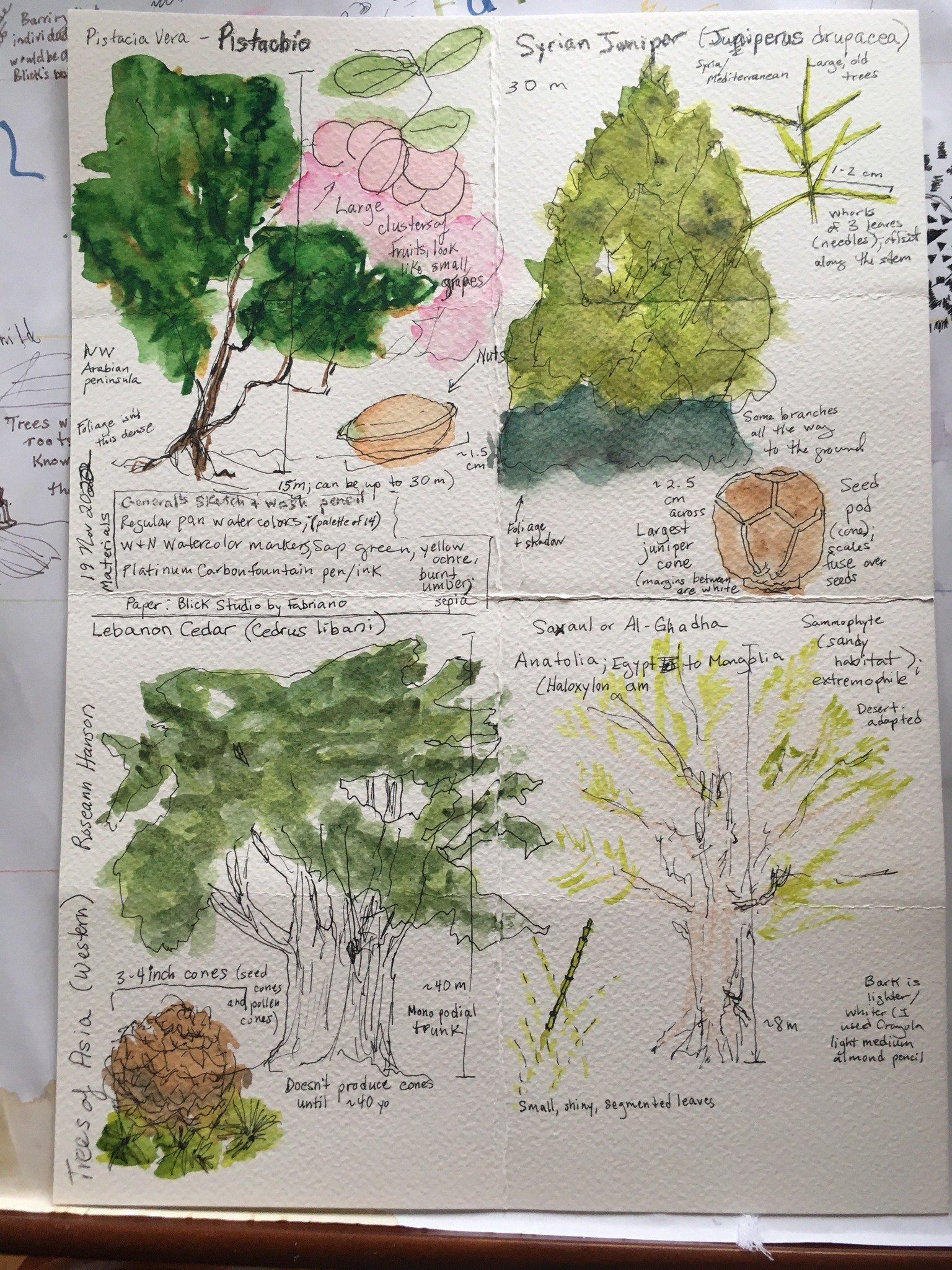

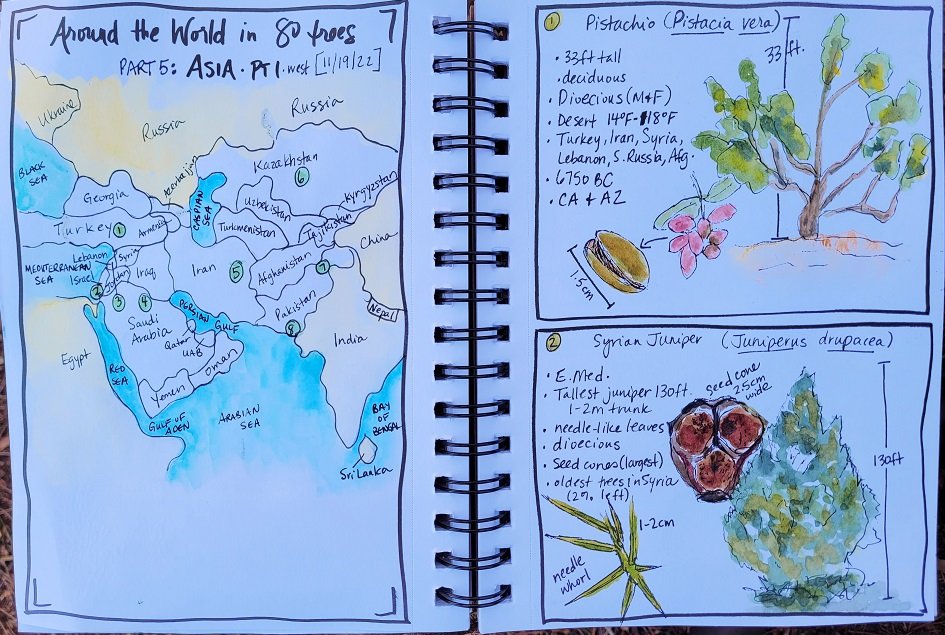
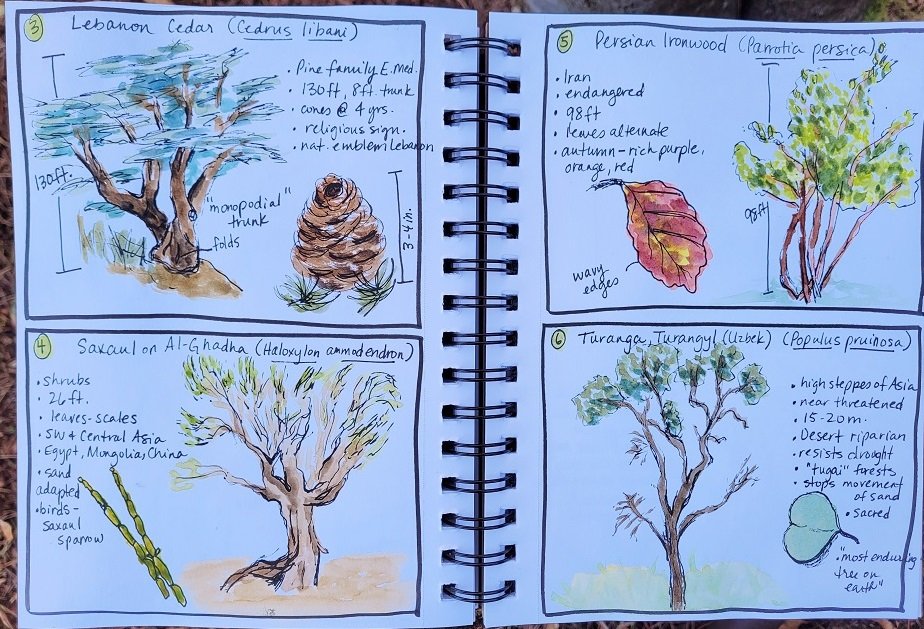
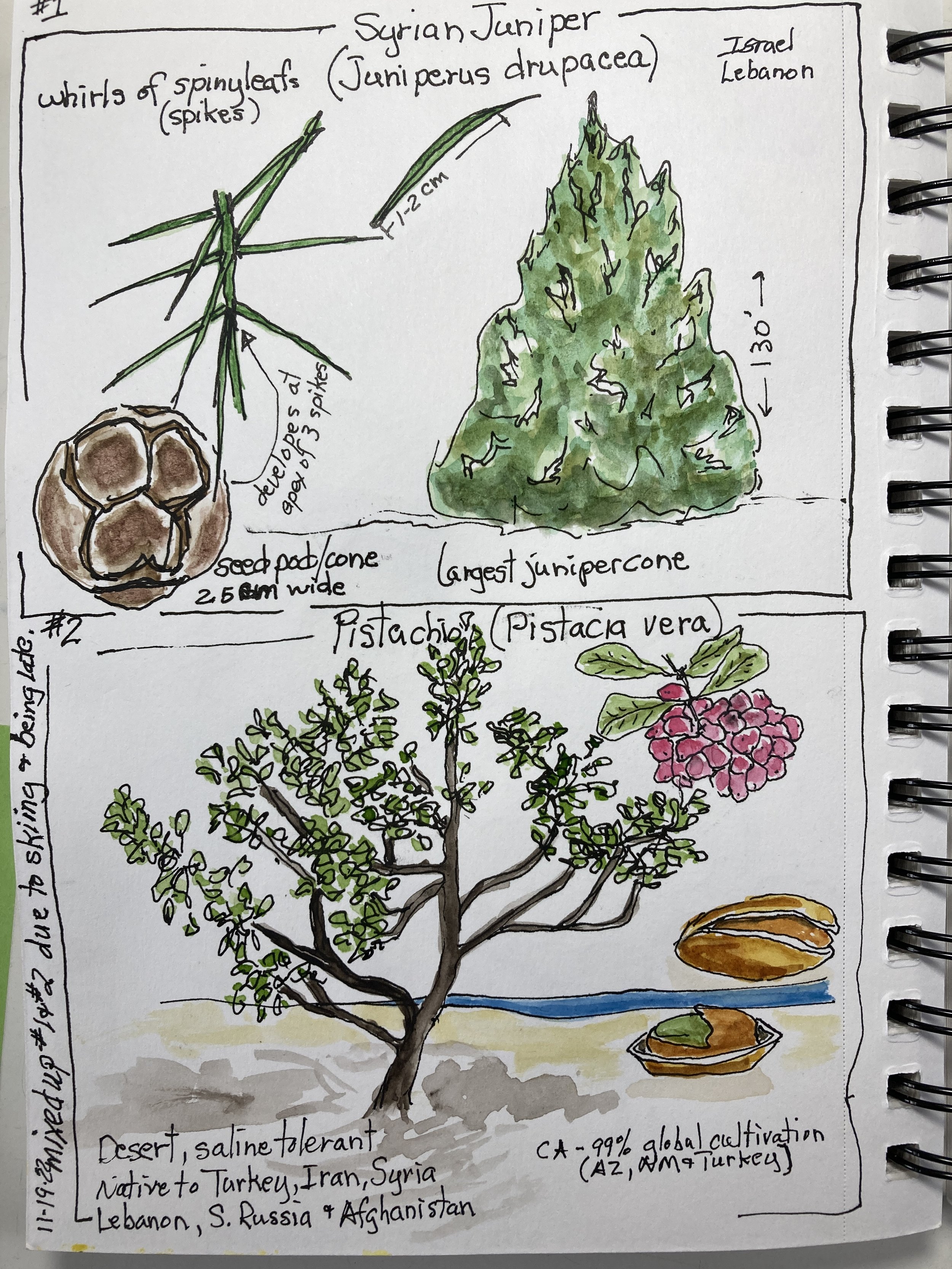
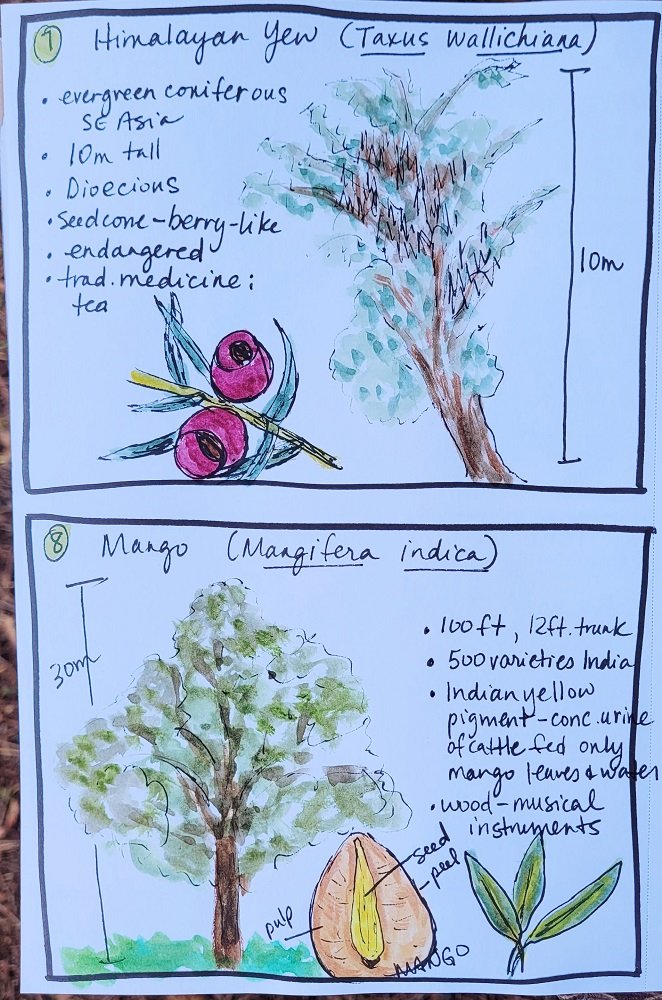
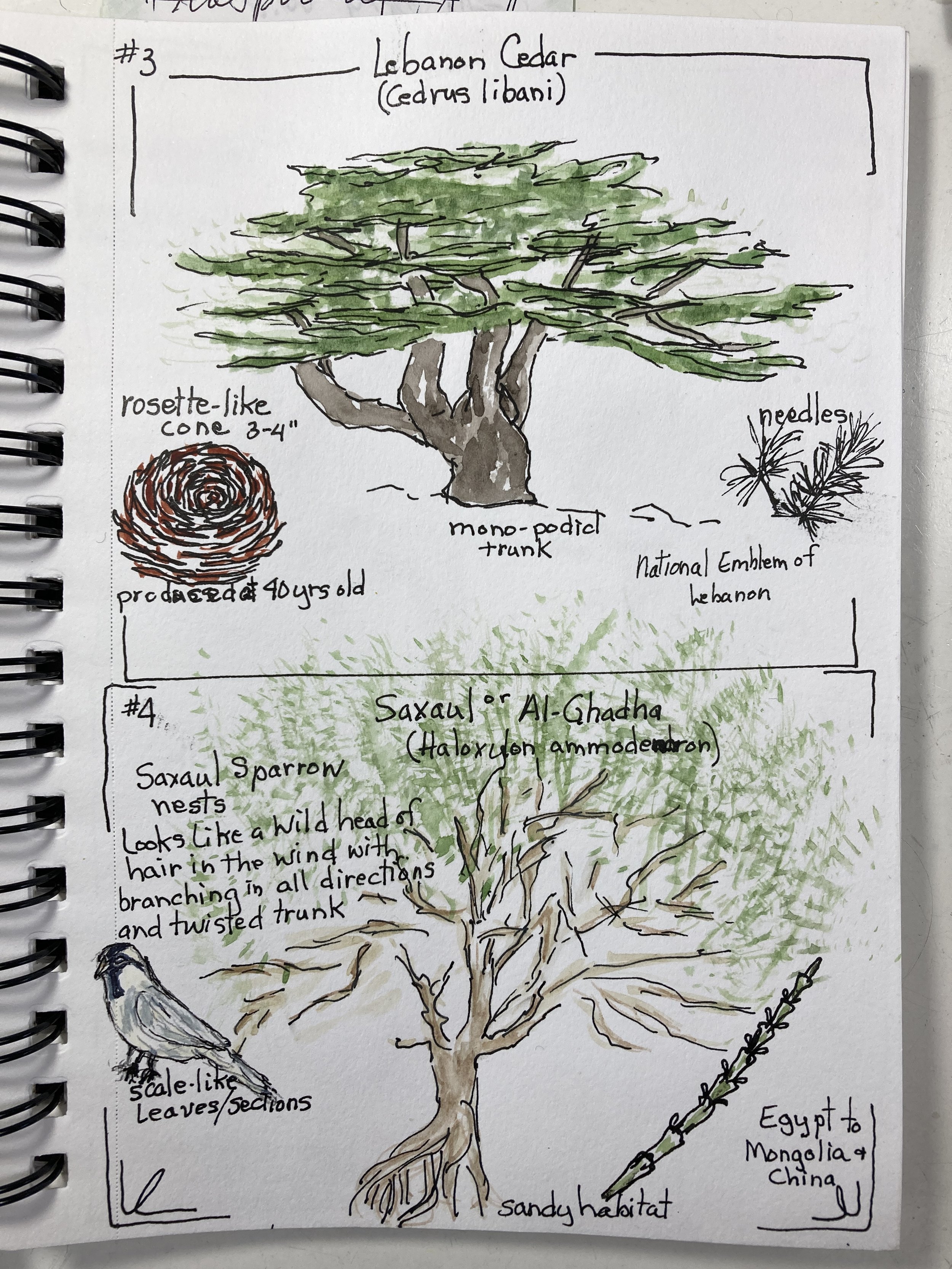
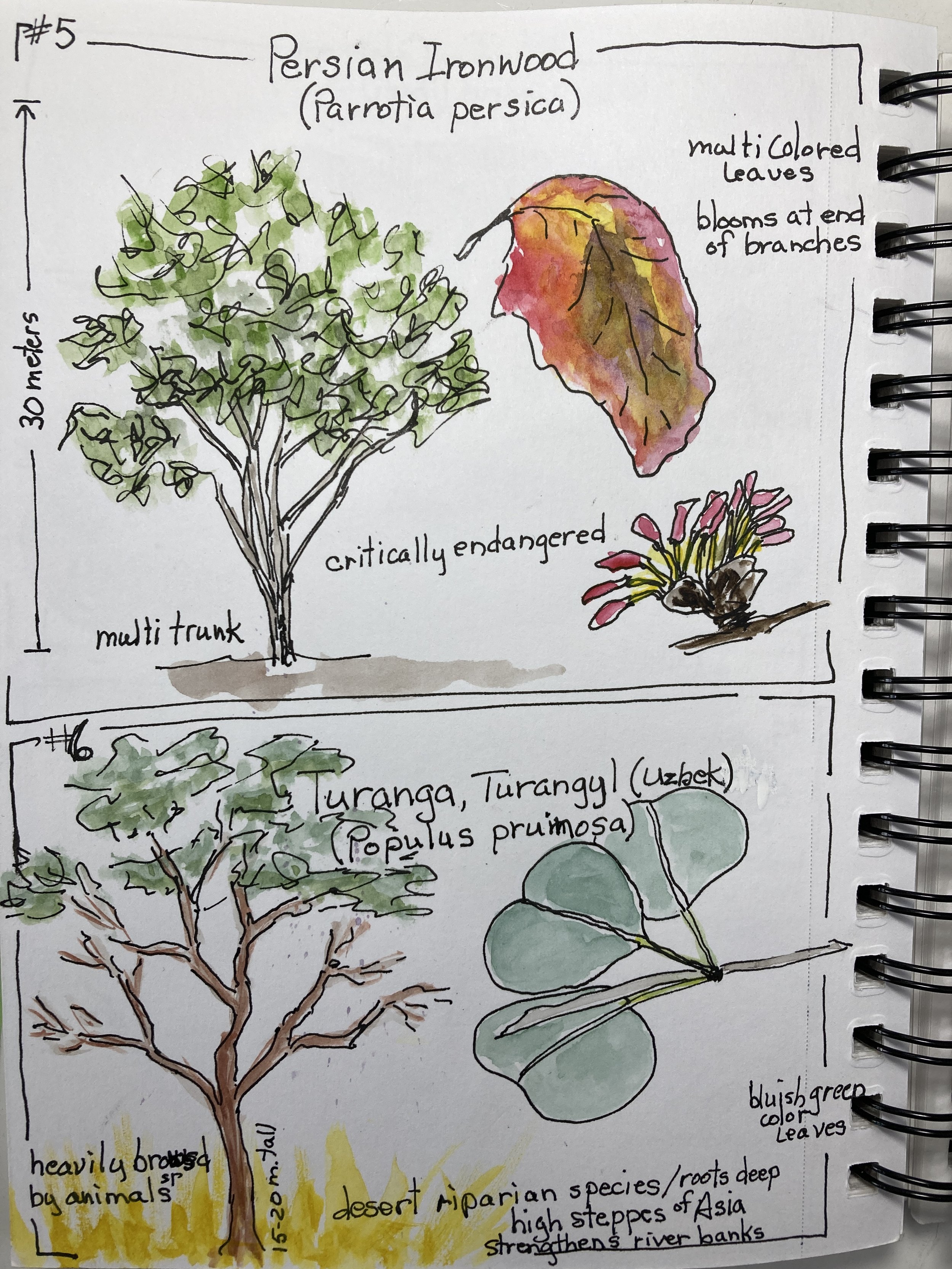
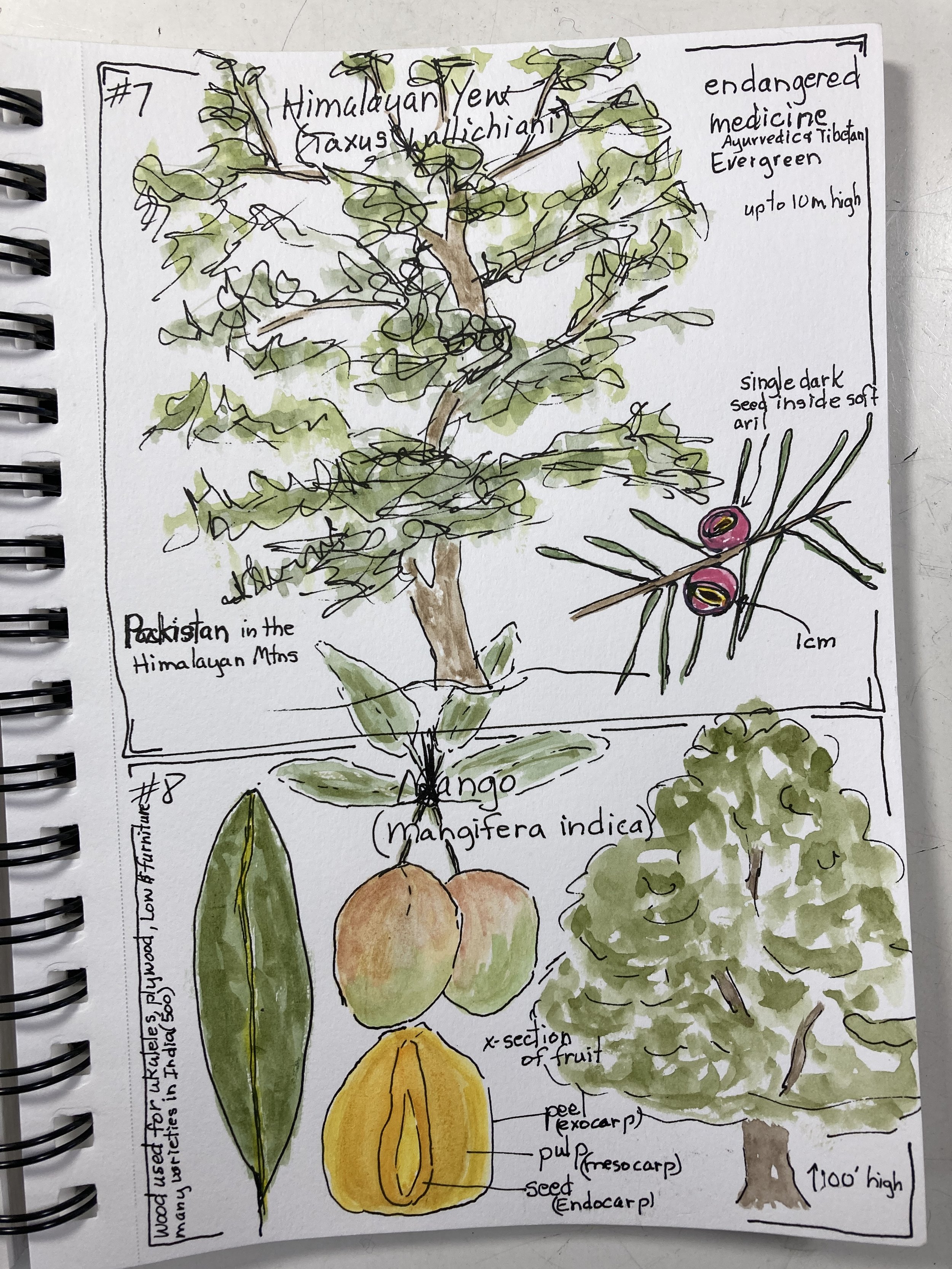
Field Arts Workshop: Around the World in 80 Trees No. 4 (Europe)
Inspired by Jonathan Drori’s wonderful books Around the World in 80 Trees and Around the World Plants, we’re going to travel around the globe by region and sketch interesting, weird, iconic, or beautiful trees and tree-like plants.
Part 4: Europe!
What you’ll need: a multi-media sketchbook or an accordion style booklet (see below), pen and / or pencil for our base drawings, and then watercolor or colored pencil to quickly bring them to life.
TIP: I used a strip of heavy watercolor paper folded into four squares to create an “accordion” booklet to record my trees (8 total, 4 on each side).
Prepwork: have on hand a simple outline map of Europe (see resources below) so you can sketch location points for each species.
Length: 2 hours
Downloads and Resources
Click to initiate download of a PDF of the workshop presentation (large file) * Please do not circulate this PDF; if you wish to share the workshop, please use the page link:
https://www.dropbox.com/s/88kf1zlgmx92iat/Around%20the%20World%20in%2080%20Trees%2008-27-2022.pdf
Locations of the 8 species for this workshop (these are not the ranges, but the site where the specimen we sketch is located).
Tip: Create an outline of Europe in your journal so you can mark the site locations of our sketched species. Credit: WorldMapBlank.com
Books and References:
Plants of the World, hosted by Kew Royal Botanical Gardens, is an amazing resource. The hardbound book of the same name is a treasure, and I. use it extensively in my research for this series.
Colors I use:
I favor a simple primary “triad” plus two extra colors: Manganese Blue (“cyan”), Quinacridone Rose (“magenta”), Aureolin Yellow (“yellow”), and Burnt Sienna and Indanthrone Blue, all Daniel Smith.
ROSEANN’S FINISHED ACCORDION PAGE
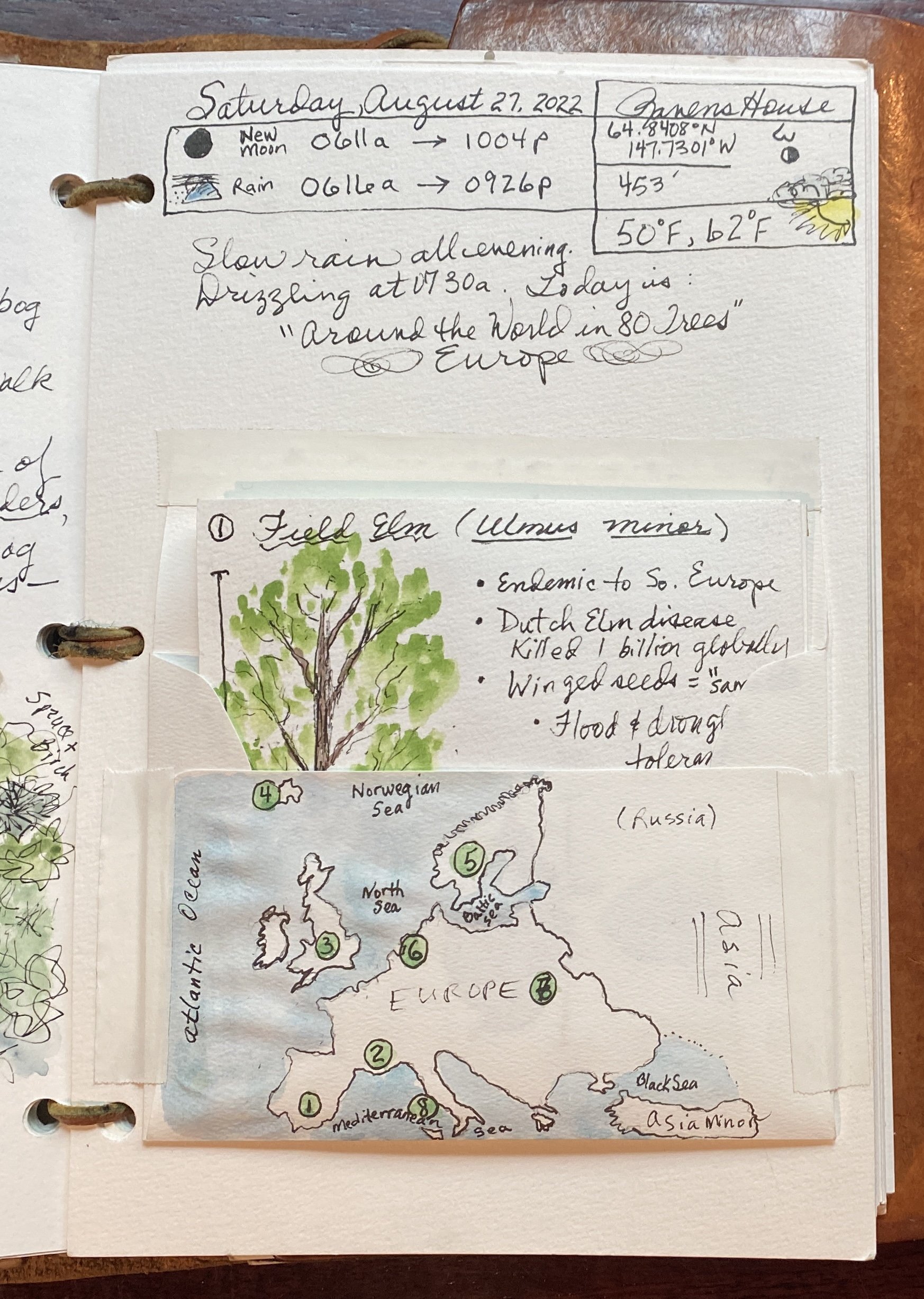
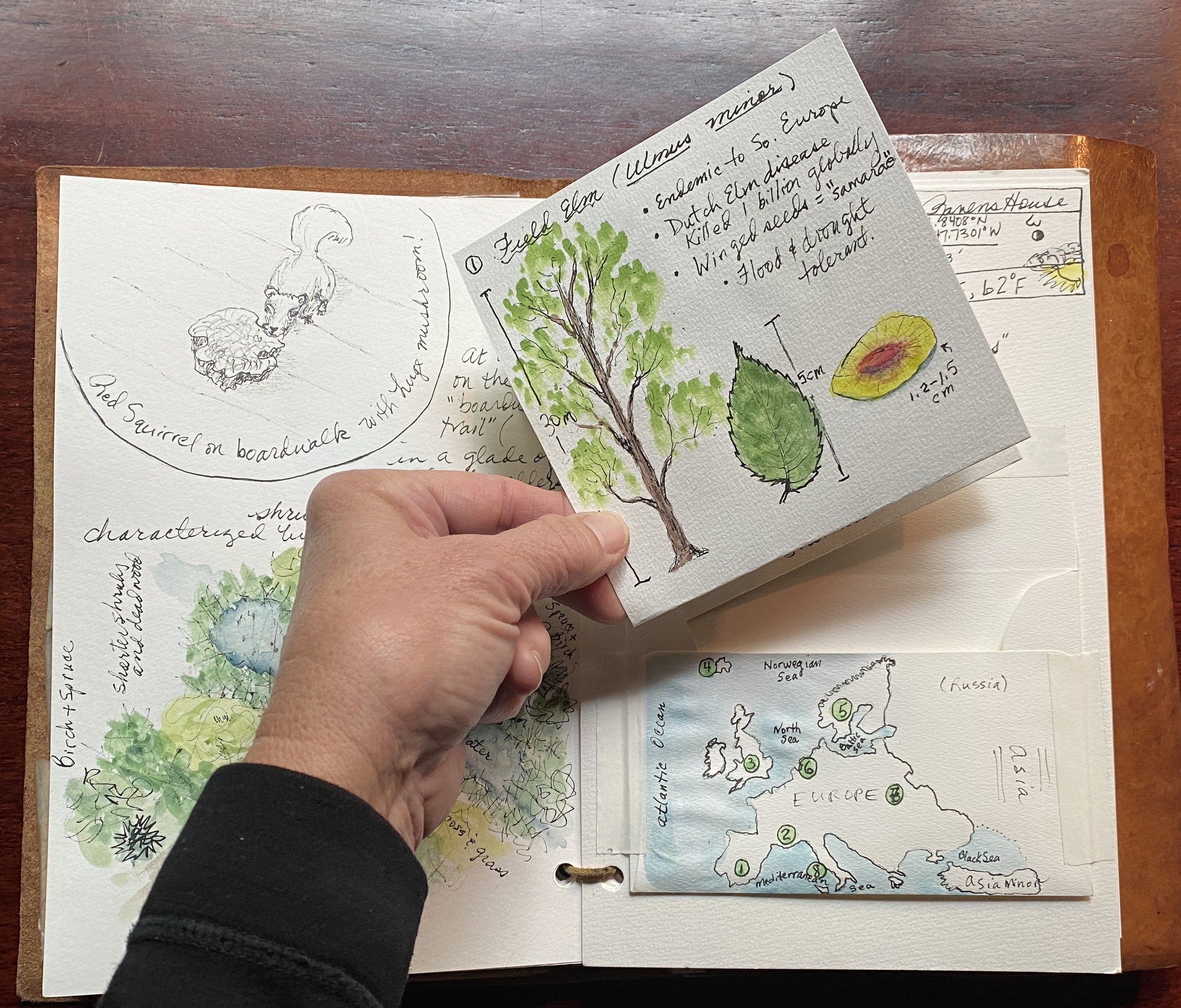
ATTENDEES’ Pages from the Workshop







